Newsletter
Sign up for Essential California
The most important California stories and recommendations in your inbox every morning.
You may occasionally receive promotional content from the Los Angeles Times.
The year seemed to start out at a pace we are used to — politicians debated and insulted one another, British royals made headlines, teams squared off in the Super Bowl, Hollywood strutted its stuff at the Oscars. And an impeached president faced trial in the Senate. It was an extraordinary event, only the third such trial in U.S. history. At the time, it seemed to set a high bar for memorable events in 2020. If only we had known.
Jan. 1: One of the worst fire seasons in Australian history continues as thousands of people evacuate and millions of acres burn.
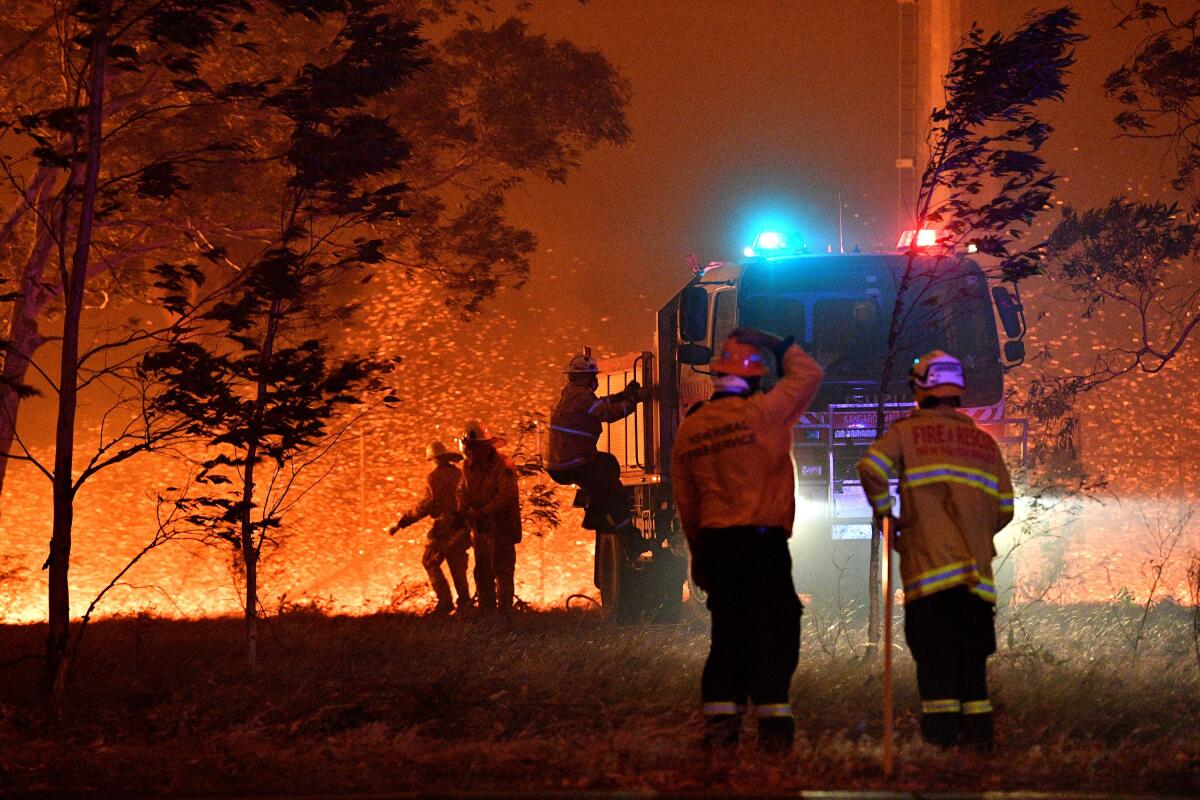
Jan. 3: Iranian Gen. Qassem Suleimani, leader of the Islamic Revolutionary Guard Corps’ Quds Force, is killed in a U.S. airstrike in Iraq.
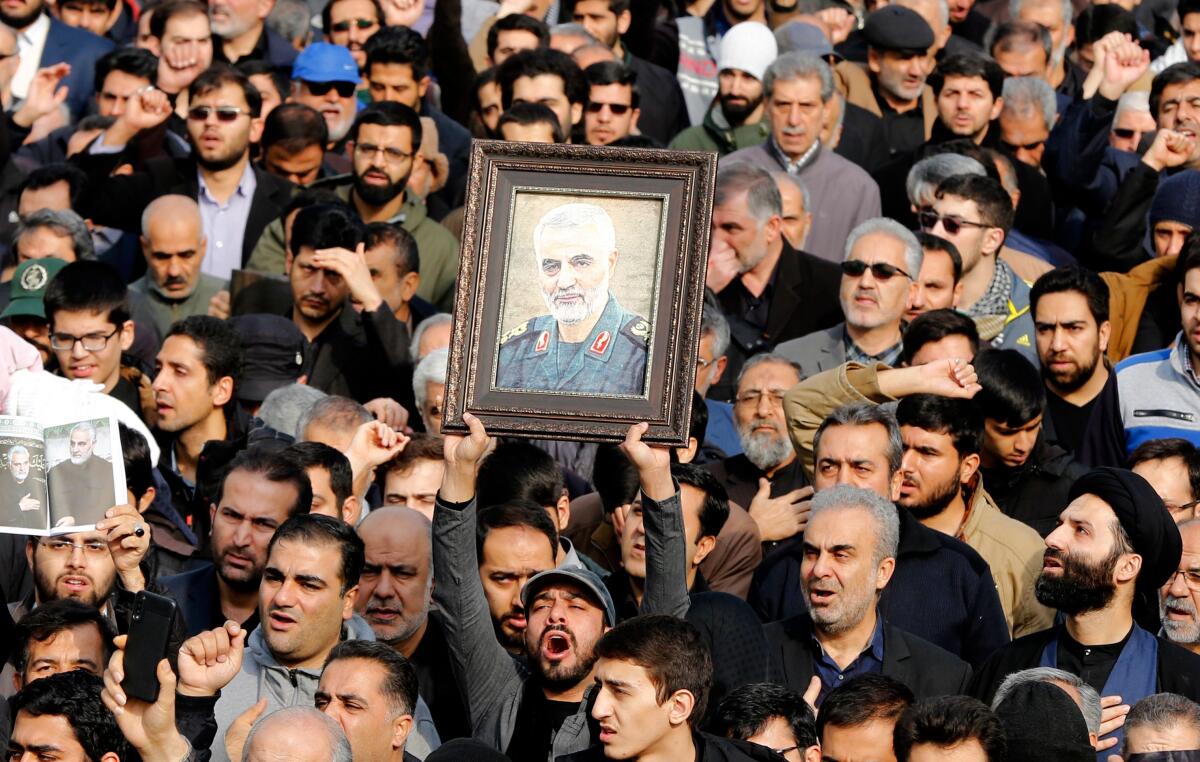
Jan. 5: “1917,” “Once Upon a Time … in Hollywood” and HBO are the big winners at the Golden Globe Awards.

Jan. 7: The Centers for Disease Control and Prevention issues a travel notice for Americans going to Wuhan, China. On Dec. 31, 2019, Chinese authorities had reported a cluster of pneumonia cases associated with a seafood and poultry market in Wuhan.
In 2020, we could witness stars being born in a distant galaxy. We could find moments of grace. But we could do little to alter the course of the coronavirus.
Jan. 8: Iran’s military shoots down Ukraine International Airlines Flight 752 shortly after takeoff from Tehran, killing all 176 people on board.
Jan. 8: Prince Harry and Meghan Markle step back from royal duties.

Jan. 14: Democratic presidential candidates meet in Des Moines for the first debate of 2020.
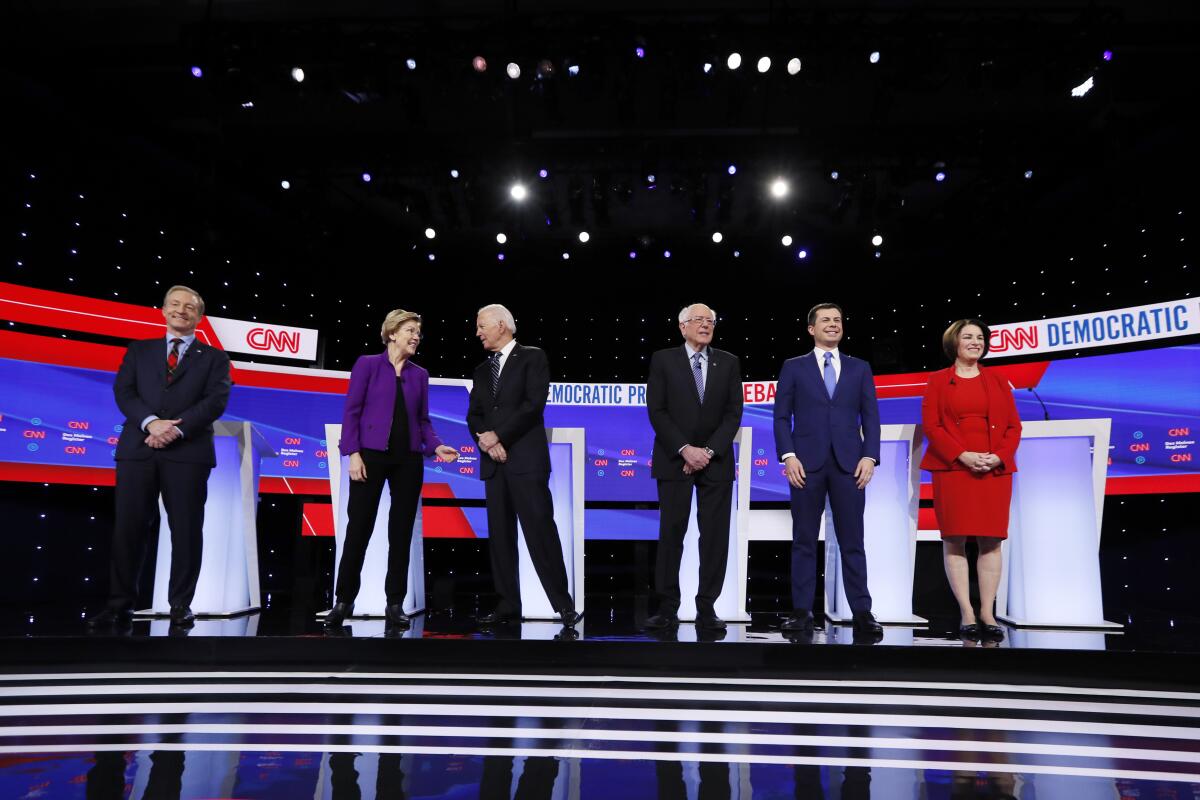
Jan. 15: The U.S. House votes to send articles of impeachment (abuse of power and obstruction of Congress) against President Trump to the U.S. Senate.
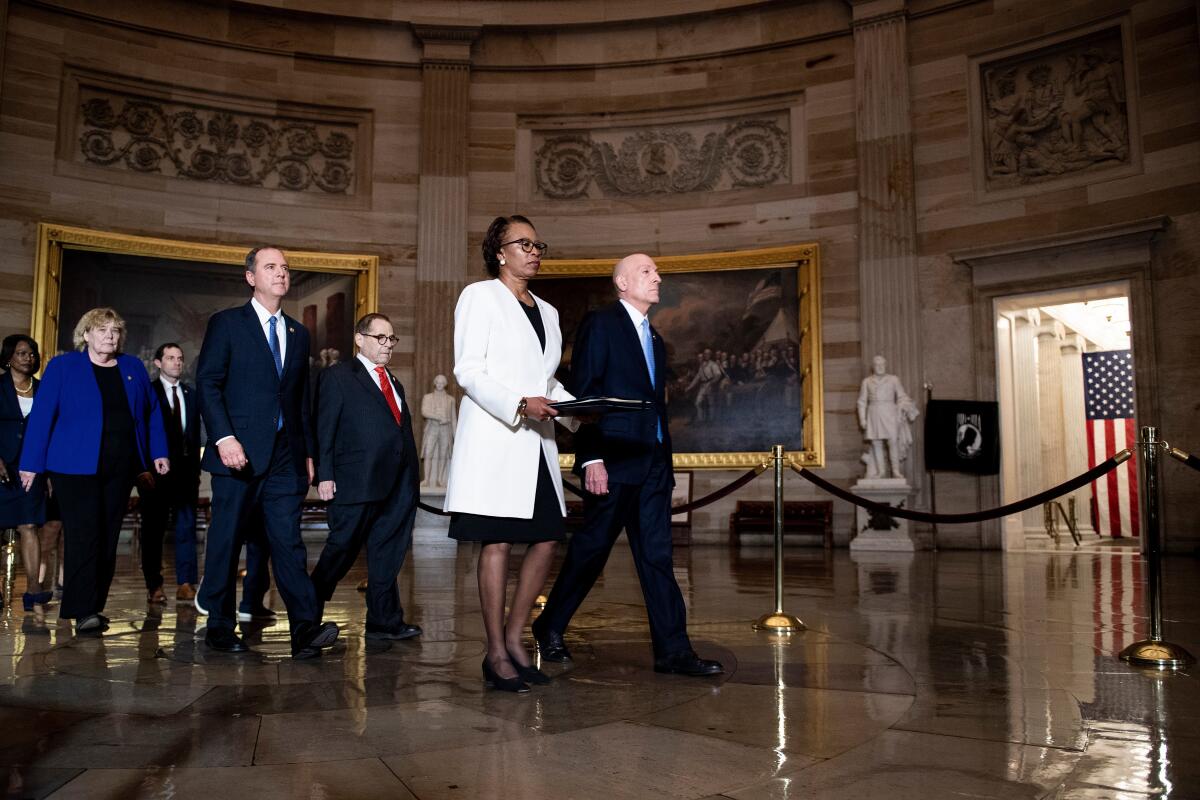
Jan. 20: The first case of a coronavirus infection, that of a 35-year-old man who returned from China, is reported in the United States.
Jan. 26: Kobe Bryant, his 13-year-old daughter, Gianna, and seven others die in a helicopter crash near Calabasas.
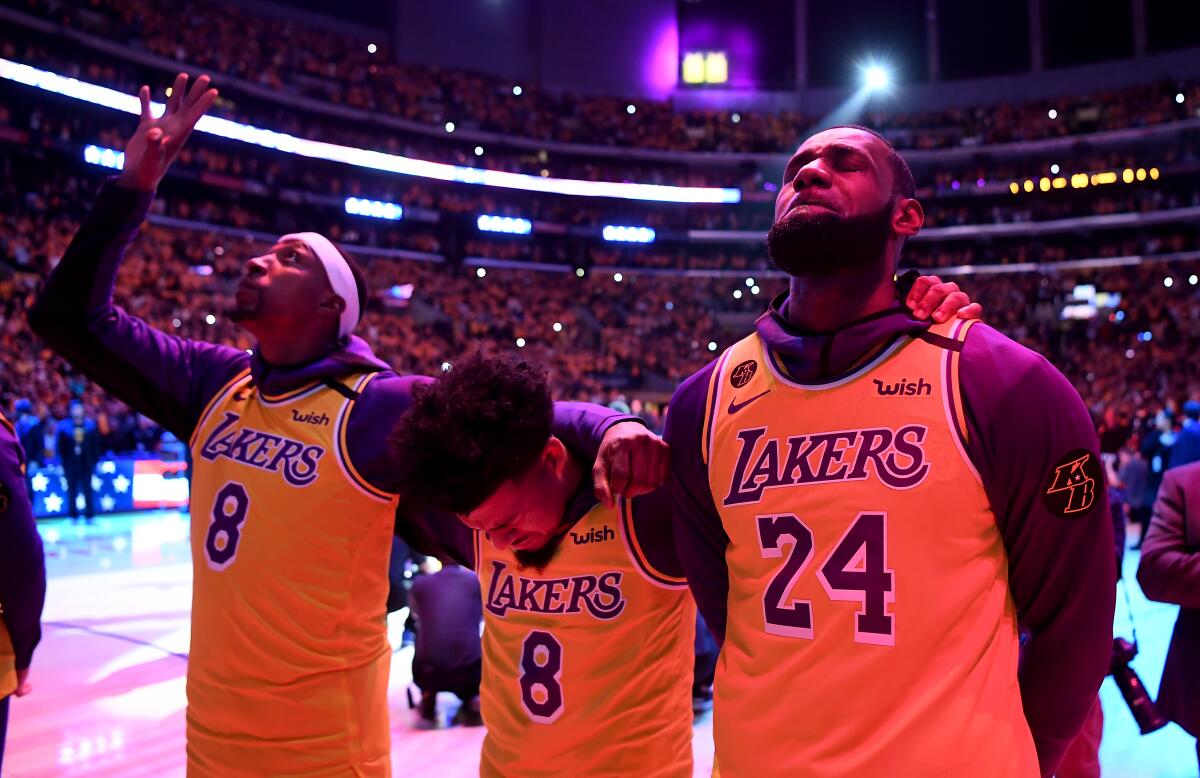
Jan. 26: Billie Eilish sweeps the top four categories — song, record, album and new artist — at the Grammys.
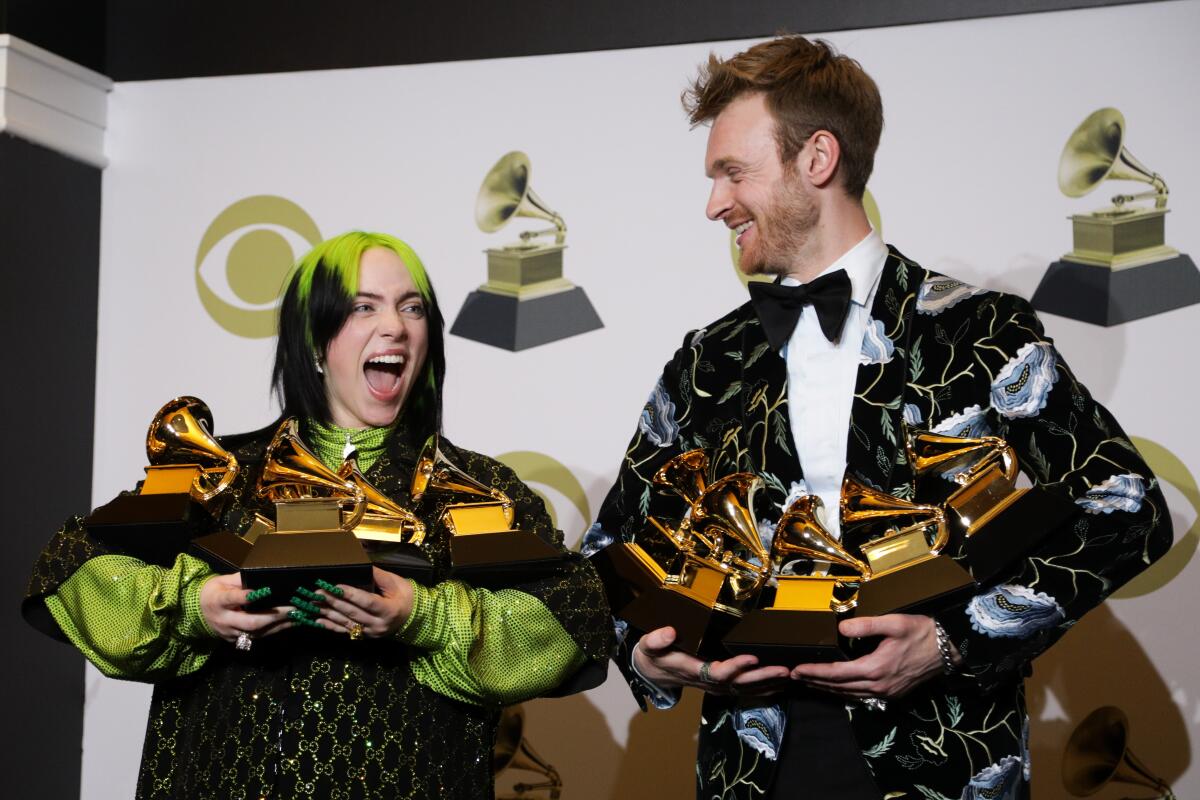
Jan. 30: The World Health Organization declares the coronavirus outbreak a public health emergency.
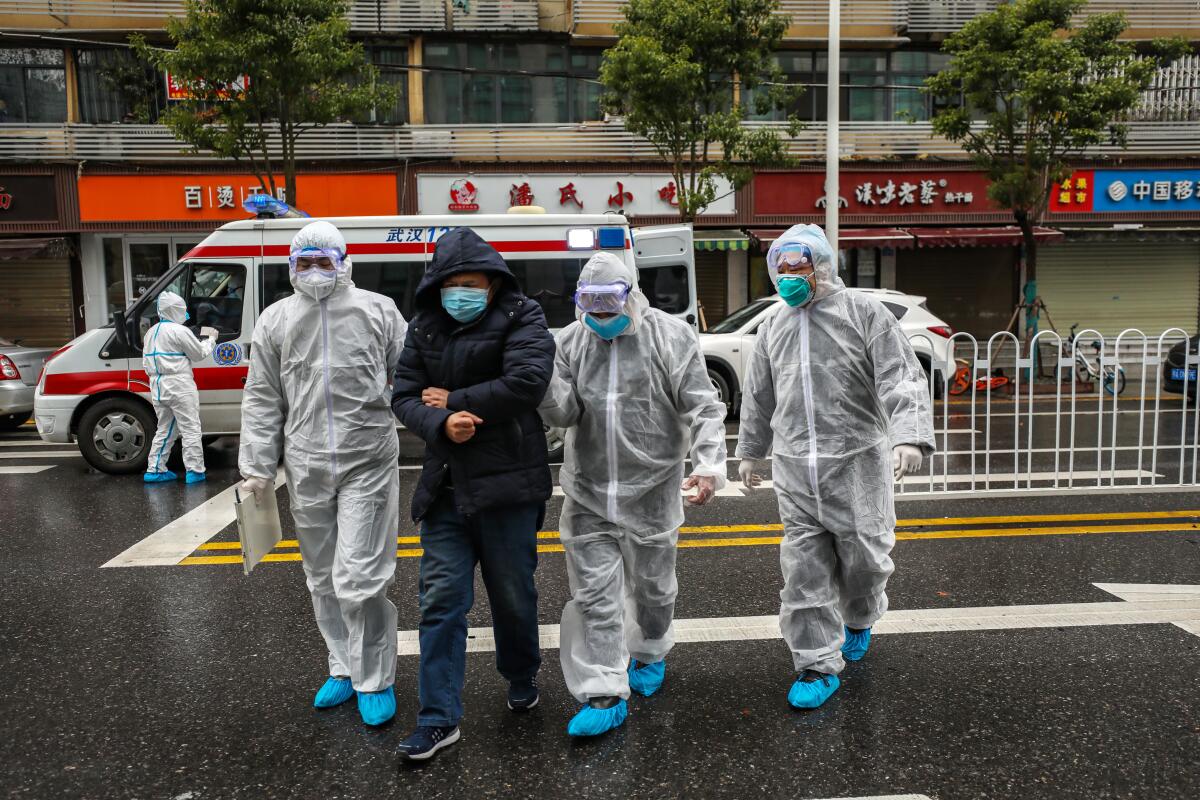
Jan. 31: The United Kingdom withdraws from the European Union, making Brexit official. Actual separation will occur Dec. 31.
Jan. 31: President Trump bans travel from China, with a few exceptions.
Feb. 2: The Kansas City Chiefs defeat the San Francisco 49ers in the Super Bowl.
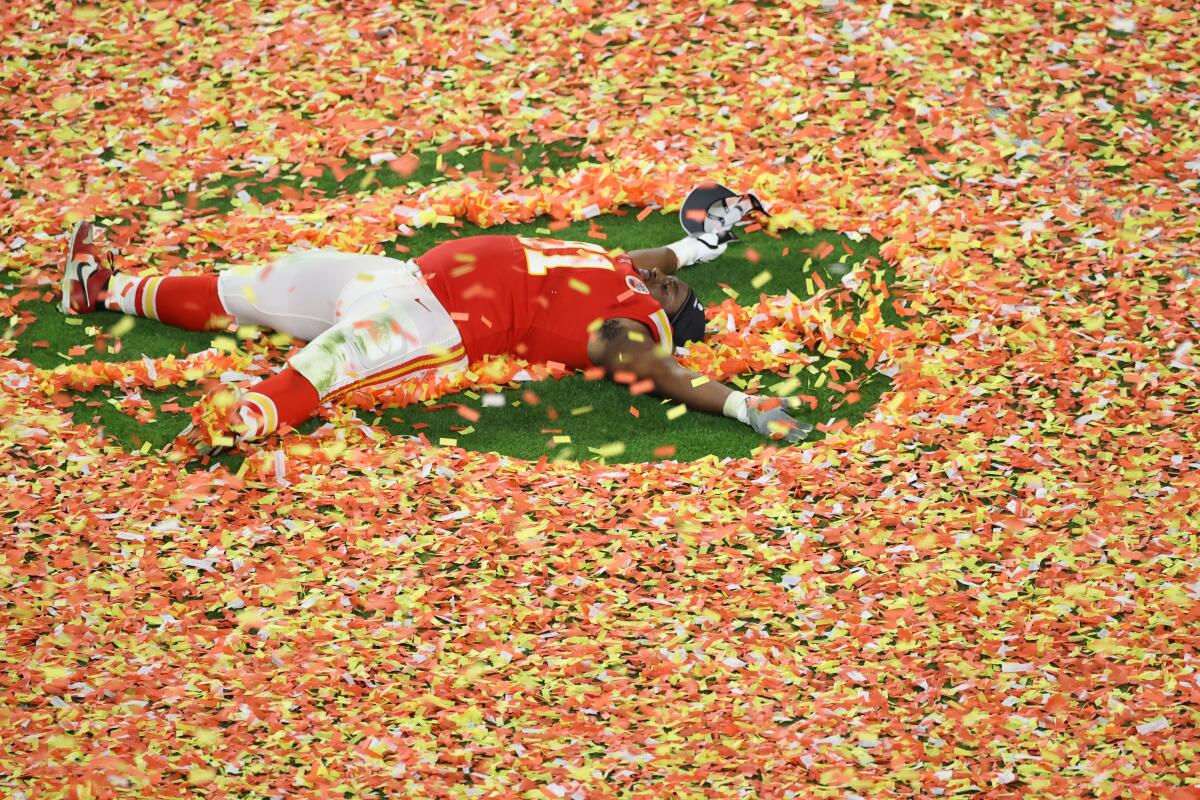
Feb. 3: The Iowa Democratic caucuses unfold to chaos; former South Bend, Ind., Mayor Pete Buttigieg is eventually declared the winner.
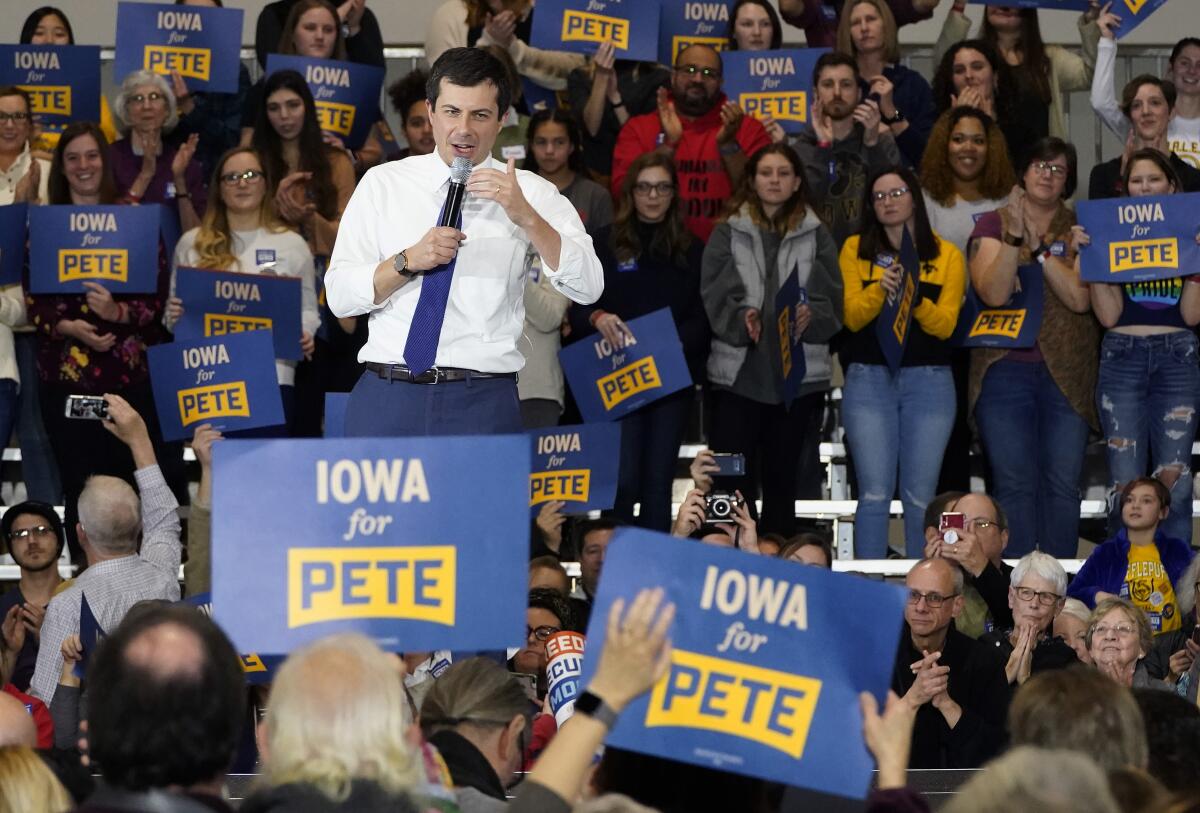
Feb. 4: Impeachment overshadows President Trump’s State of the Union address; House Speaker Nancy Pelosi tears up a copy of his speech during the last few seconds.
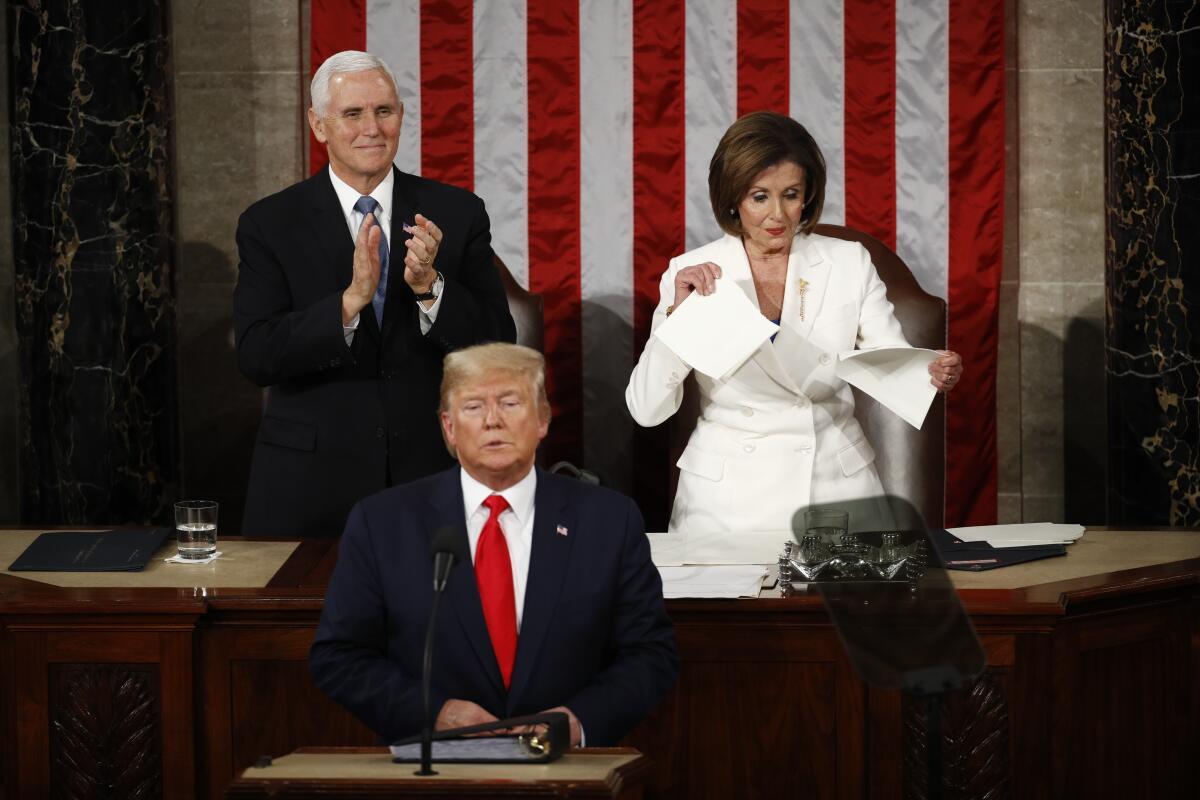
Feb. 5: The Senate acquits President Trump of abusing the power of his office and obstructing Congress’ investigation into his conduct.
Feb. 5: Actor Kirk Douglas dies at age 103.
Feb. 7: President Trump fires EU Ambassador Gordon Sondland and National Security Council advisor Lt. Col. Alexander Vindman, both of whom testified against the president during the impeachment trial.
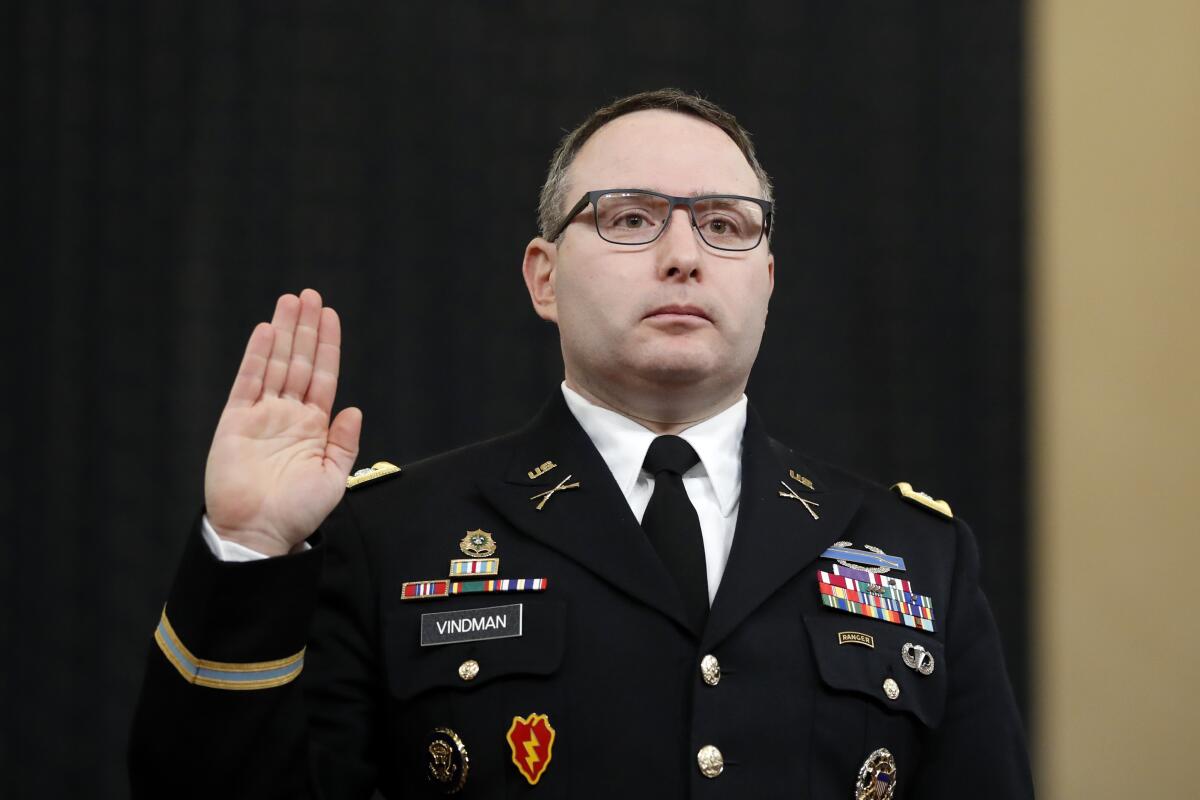
Feb. 9: “Parasite” pulls off an upset at the Oscars, winning four Academy Awards, including best picture.
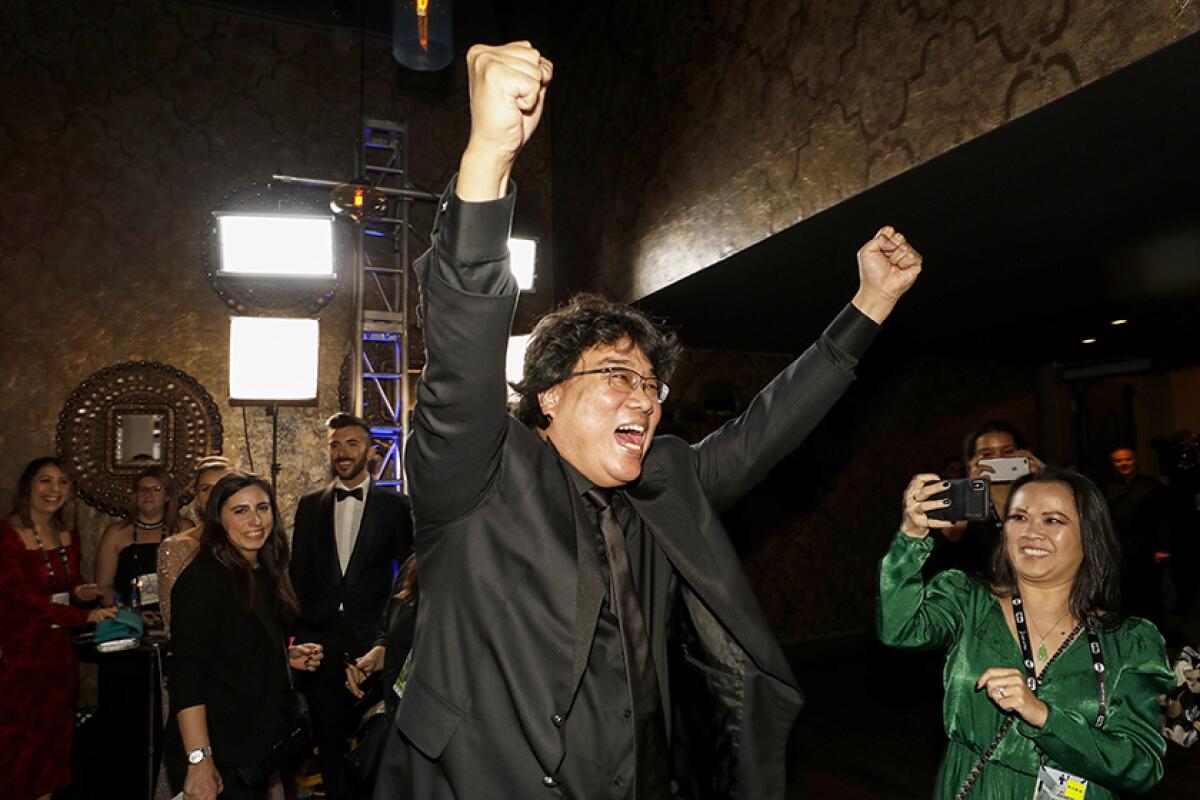
Feb. 11: Vermont Sen. Bernie Sanders wins the New Hampshire Democratic primary.
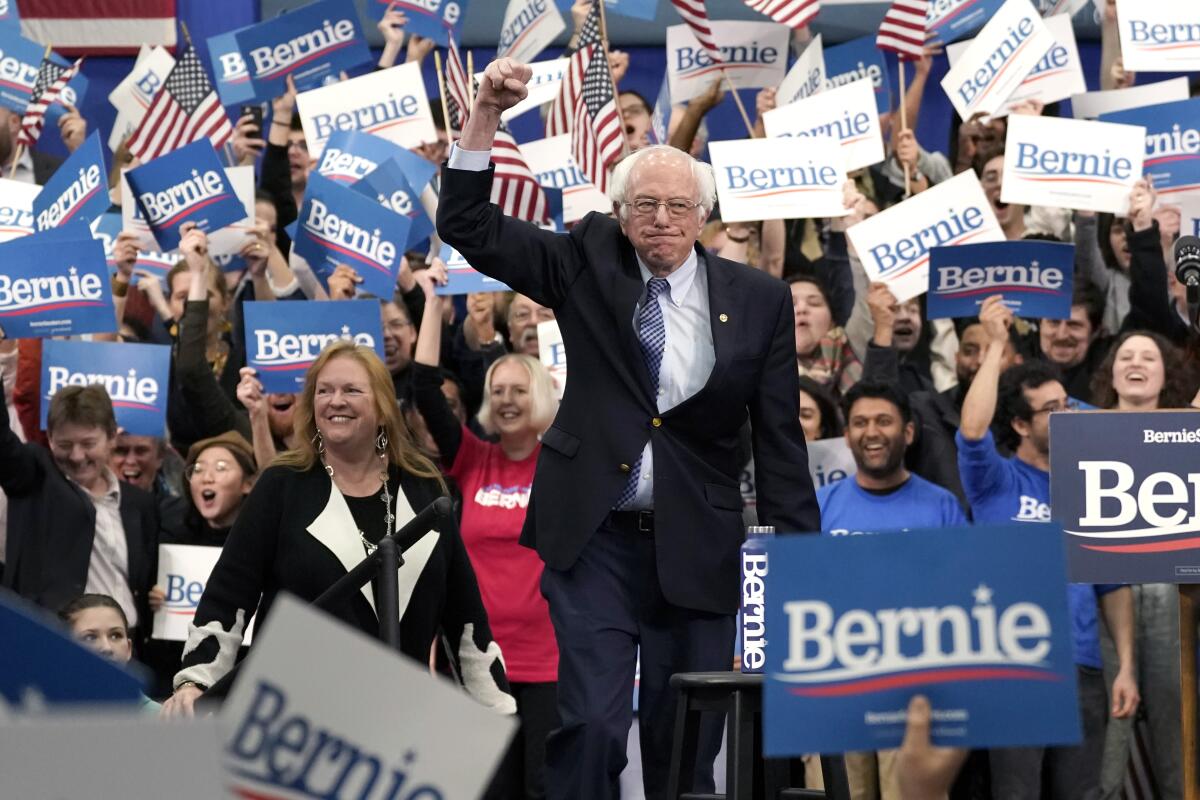
Feb. 17: The Boy Scouts of America seeks bankruptcy protection under a new wave of child abuse claims.
Feb. 22: Bernie Sanders wins the Nevada presidential caucuses.
Feb. 23: Ahmaud Arbery, a Black man, is shot and killed by a white father and son while jogging in Georgia; the two men are arrested 2½ months later and charged with felony murder and aggravated assault.
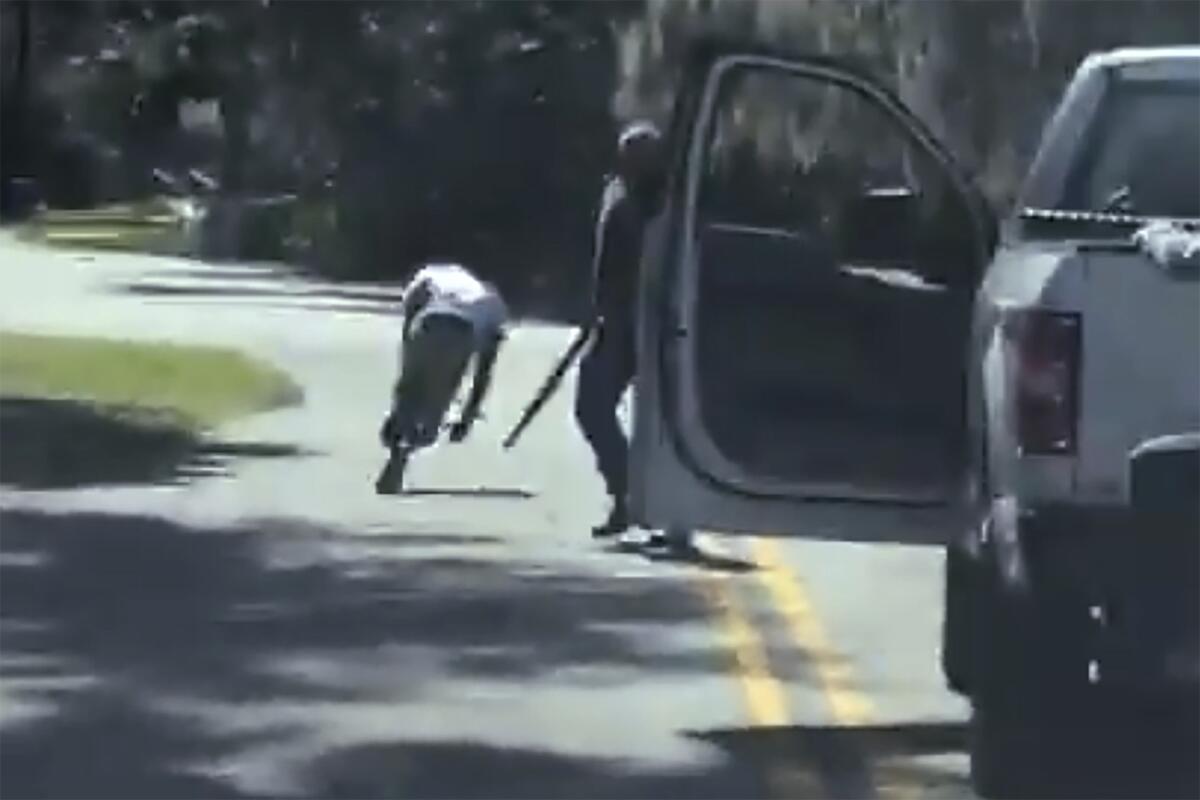
Feb. 25: Bob Iger steps down at the Walt Disney Co. after 15 years in the job; Bob Chapek is named new CEO.
Feb. 29: Former Vice President Joe Biden scores an overwhelming victory in the South Carolina Democratic primary, reigniting his presidential campaign.
Feb. 29: The first COVID-19 death is reported in the U.S., though earlier deaths will be reported later.
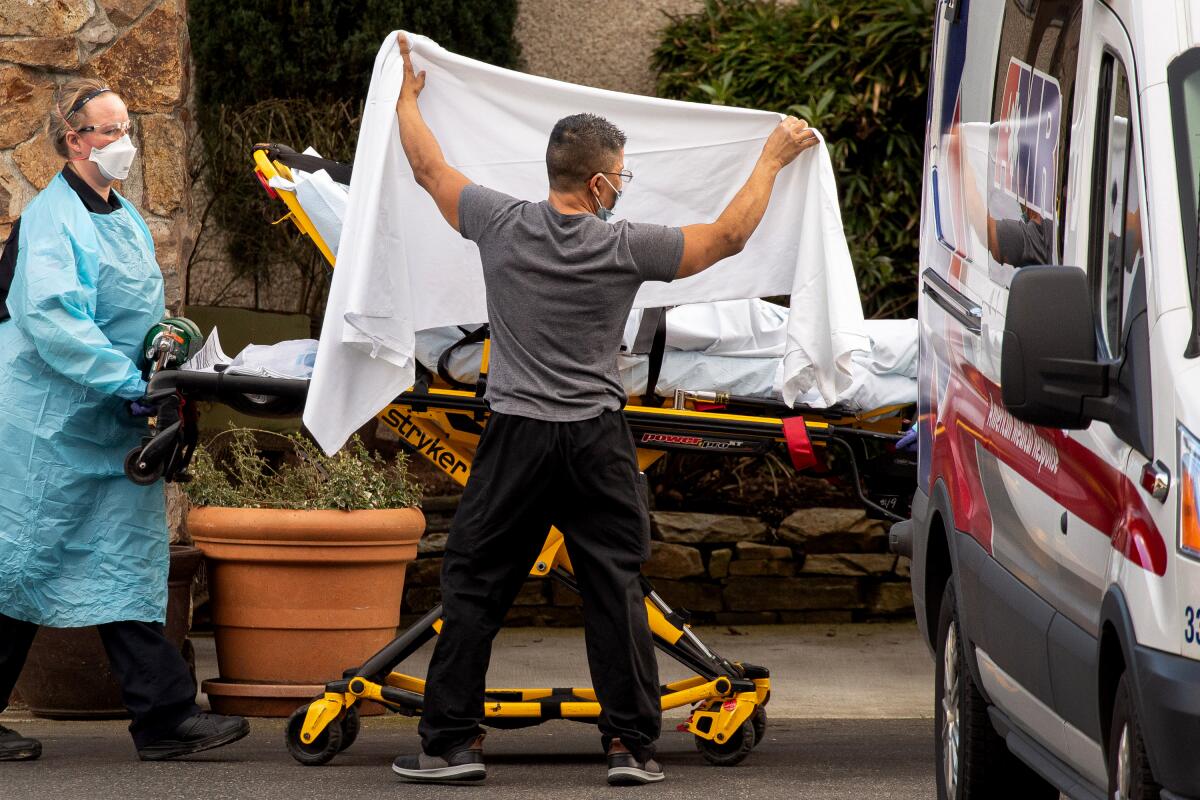
March 1: Pete Buttigieg drops out of the presidential race and endorses Joe Biden.
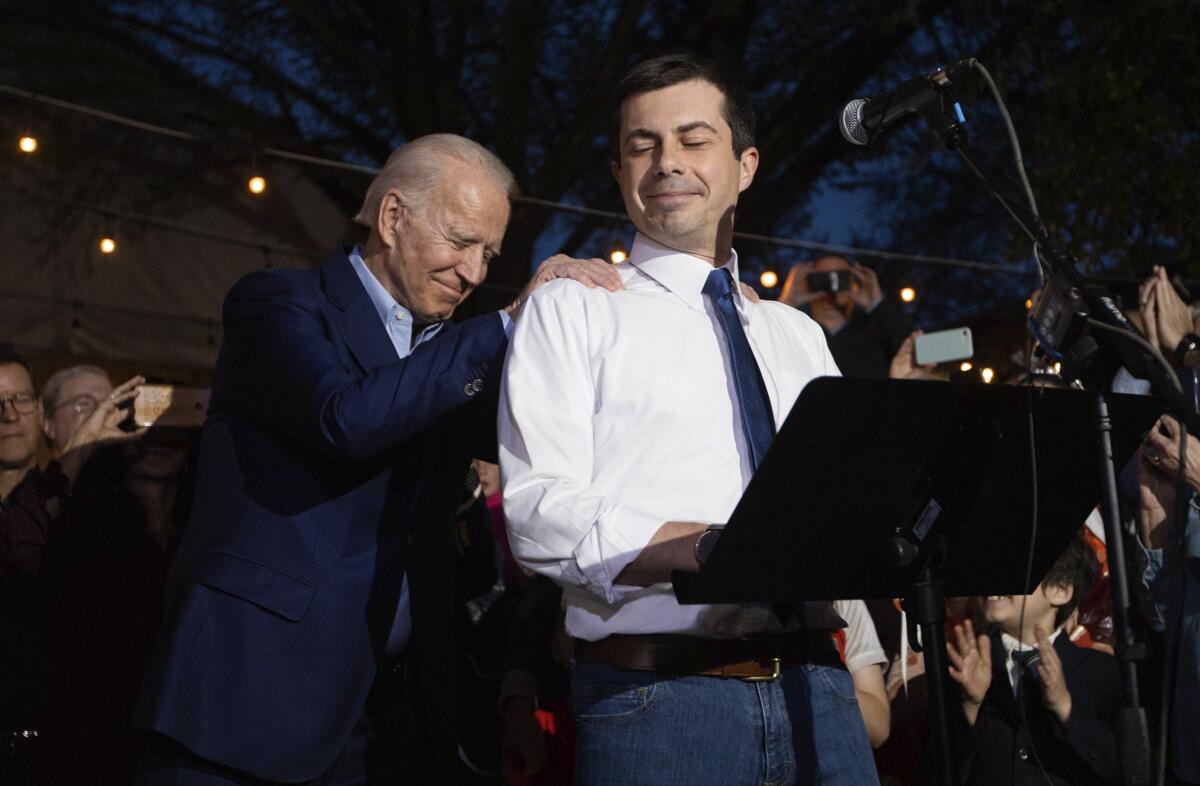
March 3: Joe Biden takes a commanding lead of the primary race with sweeping victories in 10 states on Super Tuesday.
March 4: Former New York Mayor Michael R. Bloomberg drops out of the presidential race, endorses Joe Biden.
March 5: Massachusetts Sen. Elizabeth Warren drops out of the presidential race, does not endorse either remaining candidate, Joe Biden or Bernie Sanders.
March 9: Italy places itself on a nationwide quarantine to slow the spread of coronavirus. The Dow Jones industrial average plunges more than 2,000 points.
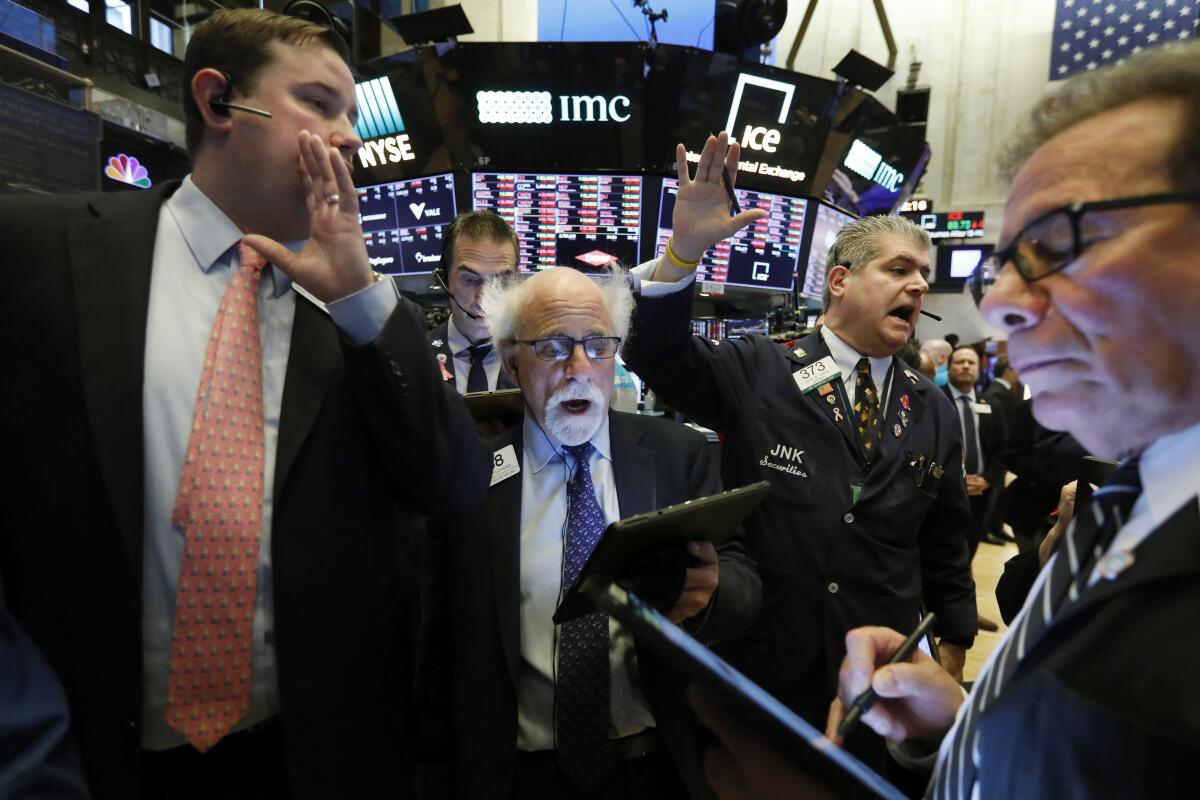
March 11: The World Health Organization declares the coronavirus outbreak a pandemic.
March 11: Movie mogul Harvey Weinstein is sentenced to 23 years in prison for rape and sexual assault.
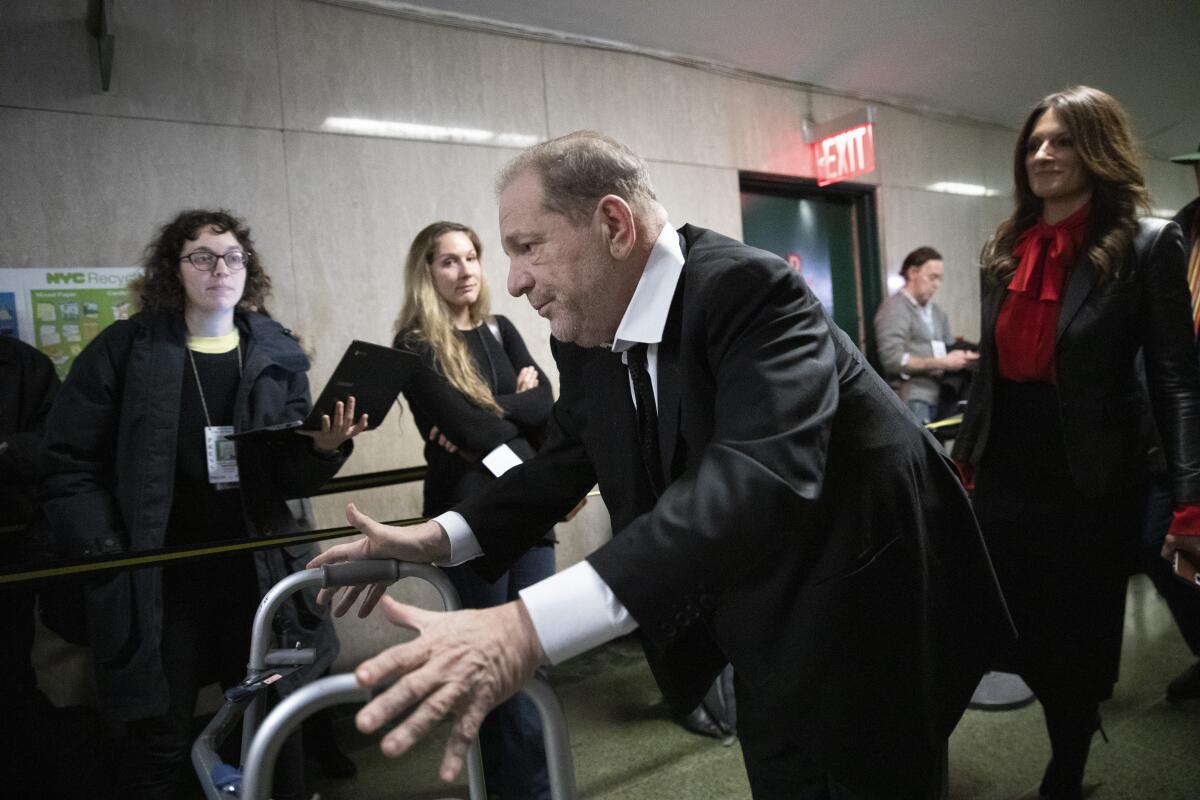
March 11: Actor Tom Hanks announces he and his wife, Rita Wilson, tested positive for coronavirus in Australia.
March 11: The NBA suspends its season indefinitely over the pandemic.
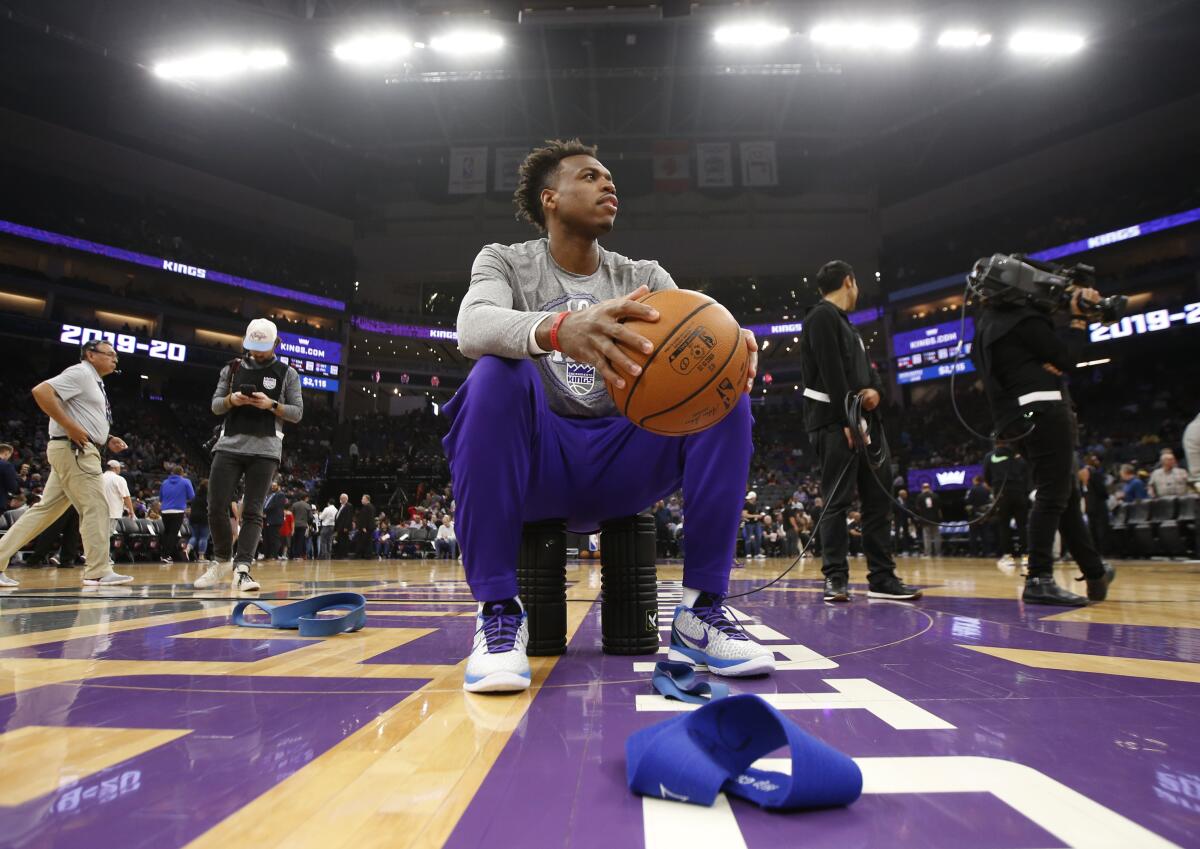
March 12: Major League Baseball suspends spring training indefinitely because of COVID-19 concerns.
March 12: The NFL suspends its 2019-20 season indefinitely; NHL and Major League Soccer suspend their seasons as well.
March 12: The NCAA cancels its basketball championship tournaments.
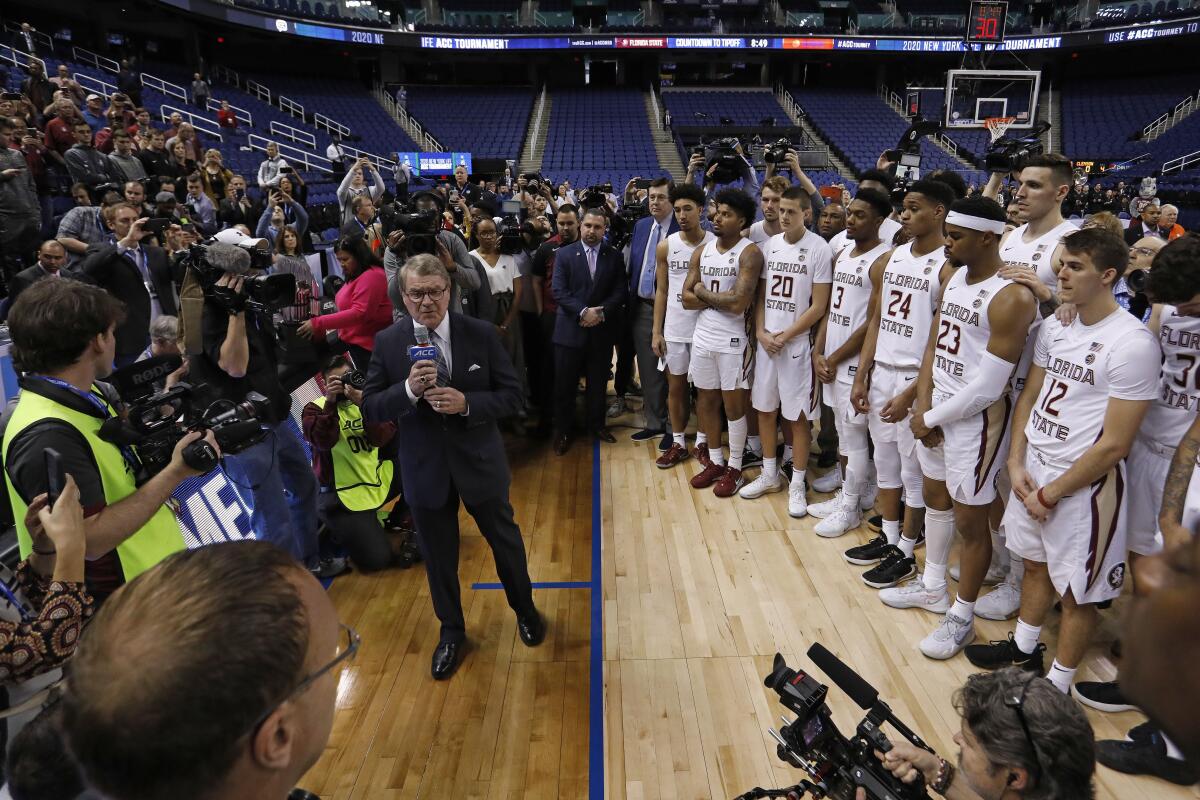
March 13: The Los Angeles Unified School District announces that it will close all its schools.
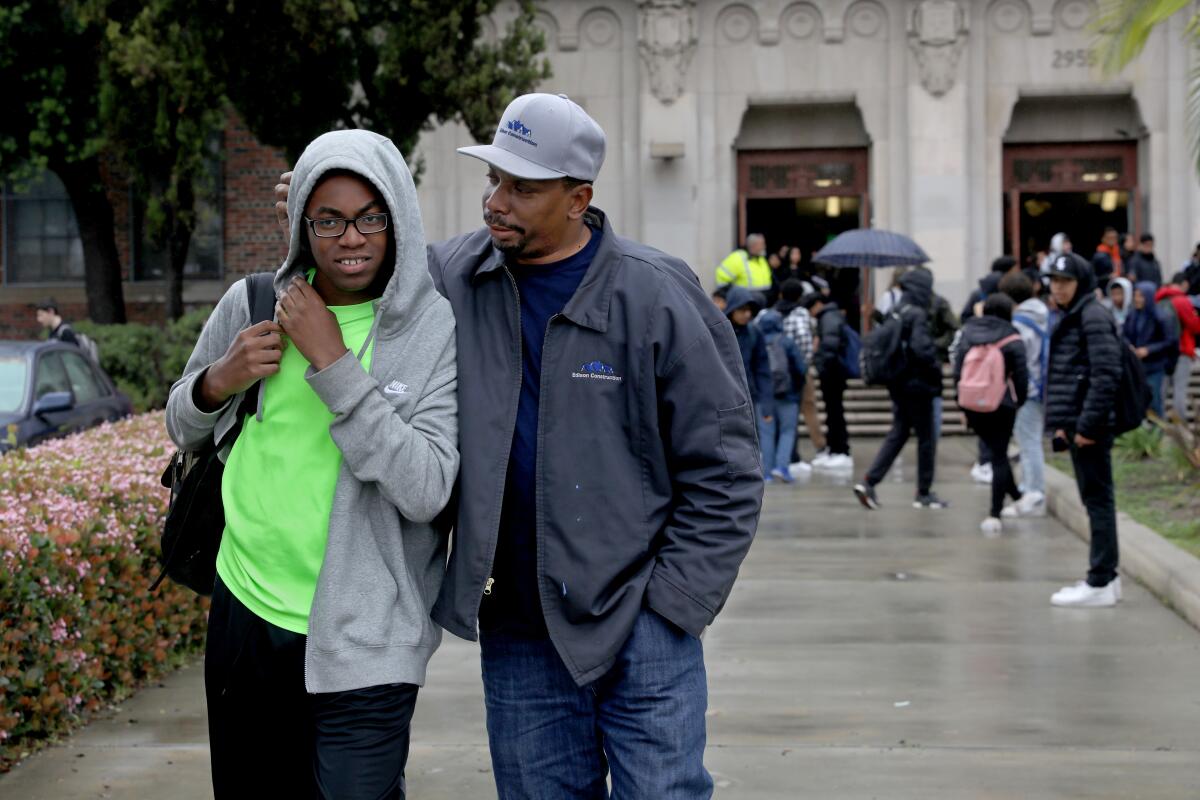
March 13: President Trump declares the coronavirus a national emergency.
March 13: Breonna Taylor is shot and killed in her home in Louisville, Ky., by police serving a narcotics warrant in search of a suspected drug dealer.
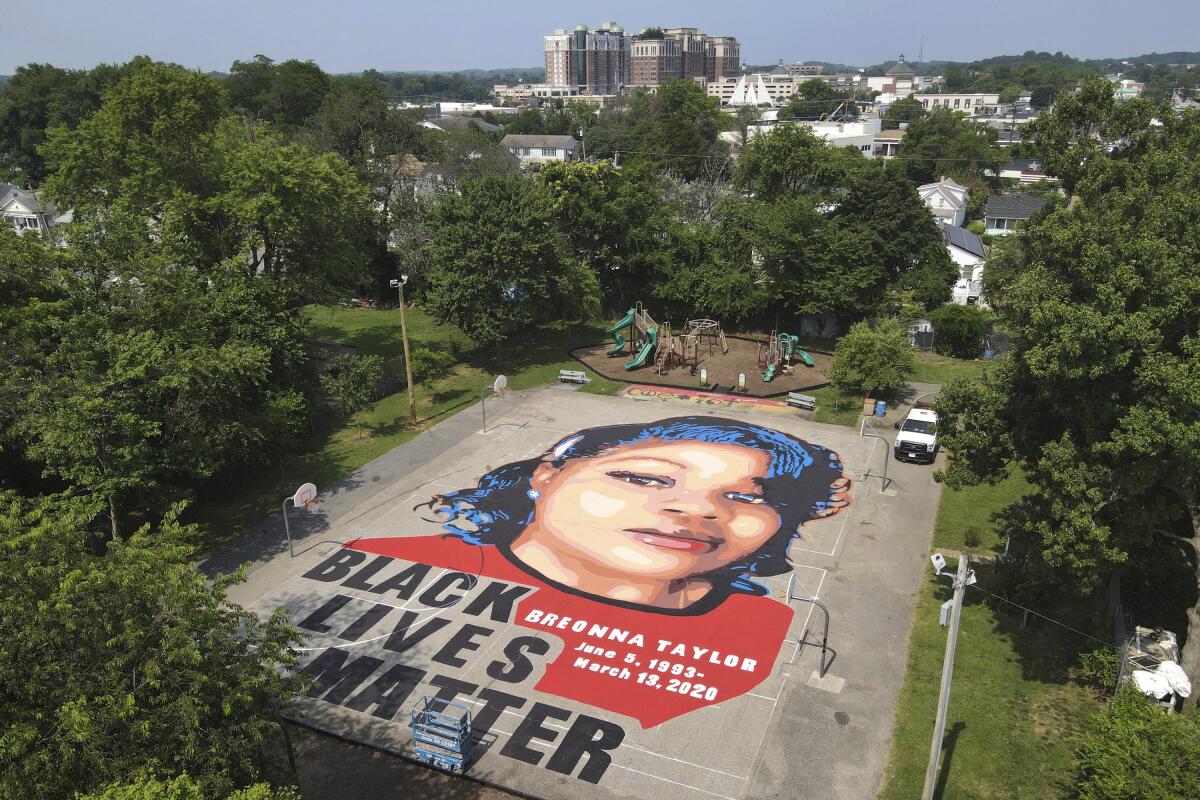
March 14: Spain goes into a nationwide coronavirus lockdown.
March 16: The Dow Jones industrial average falls by 2,997.10, the largest single-day point drop ever, amid the coronavirus outbreak.
March 19: Gov. Gavin Newsom announces extraordinary measures directing all Californians to stay at home because of the pandemic. Los Angeles city and county officials issue sweeping new rules to limit the virus’ spread.
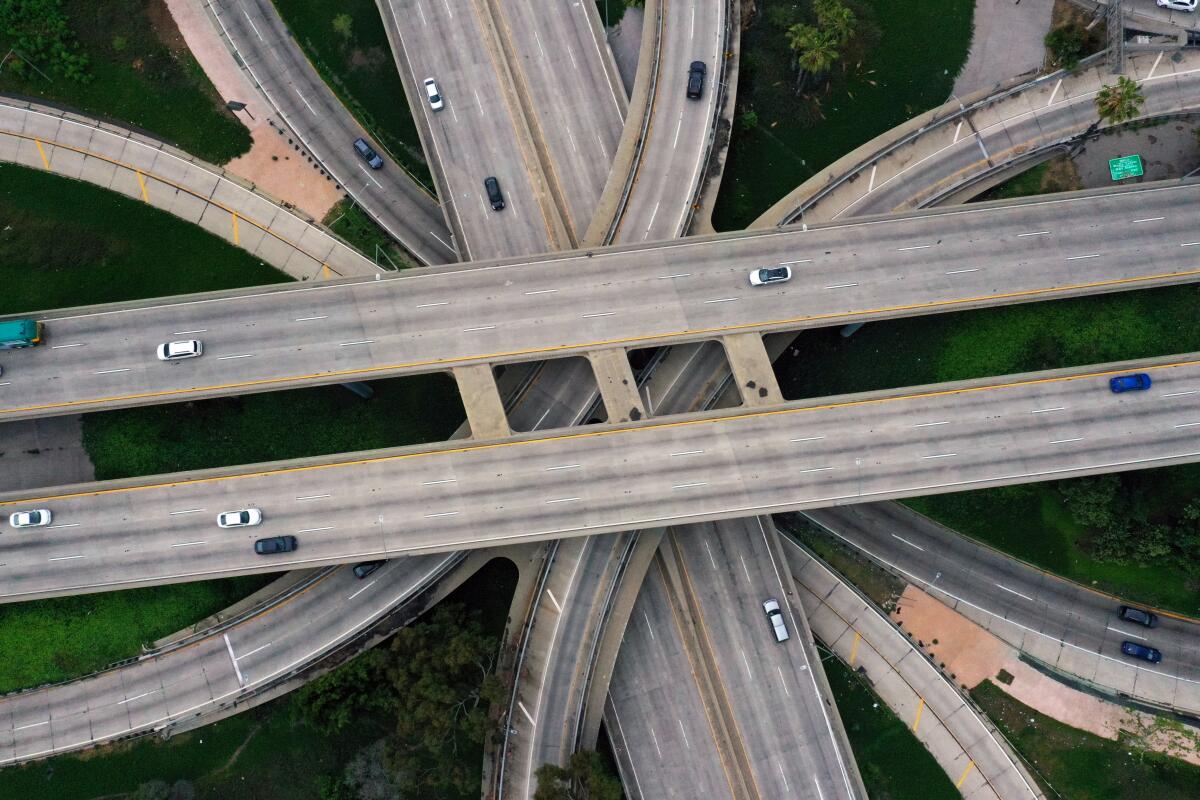
March 20: The worldwide coronavirus death toll passes 10,000.
March 23: PG&E pleads guilty to 84 counts of involuntary manslaughter over the 2018 Camp fire.
March 24: The 2020 Summer Olympics in Tokyo are suspended until 2021.
March 24: President Trump tweets that the “cure” cannot be “worse than the problem itself” and calls for country to reopen on Easter Sunday.
March 25: One million Californians file for unemployment.
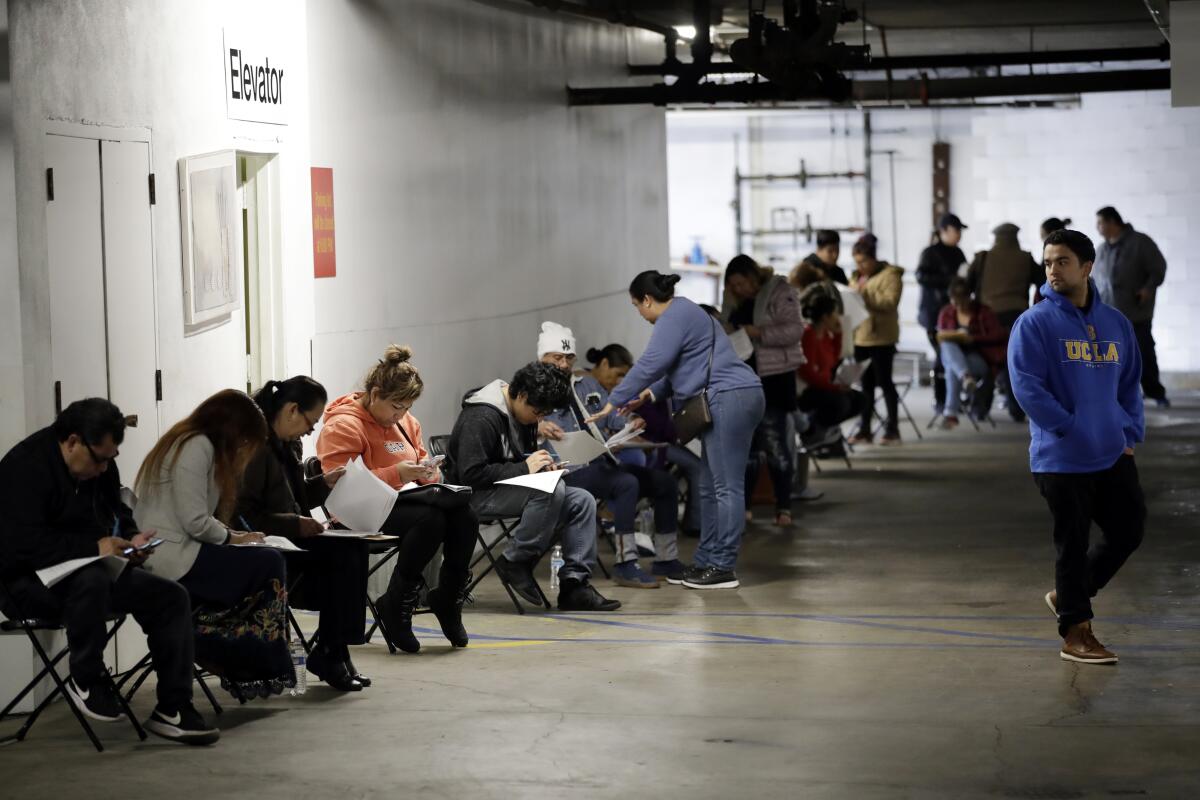
March 25: The Senate and the White House agree to a $2-trillion stimulus package to boost the economy, the largest stimulus package in U.S. history.
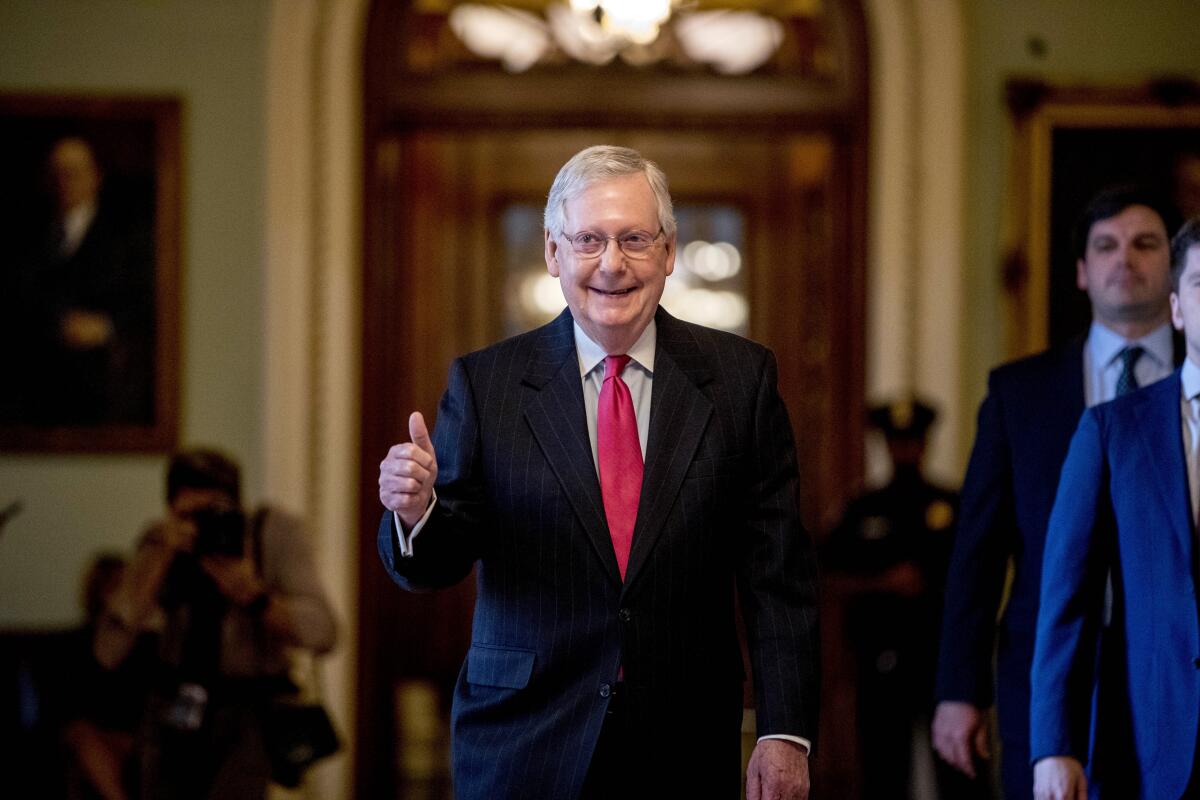
March 26: British Prime Minister Boris Johnson tests positive for the coronavirus.
March 26: Global coronavirus cases top 500,000. The U.S. reports 82,000 infections — more than China or Italy — and passes 1,000 deaths.
March 26: The Labor Department reports that a record 3.28 million Americans filed for unemployment benefits in the previous week.
March 27: House and Senate pass a coronavirus relief and stimulus bill that includes expanded unemployment benefits and cash payments to those eligible.
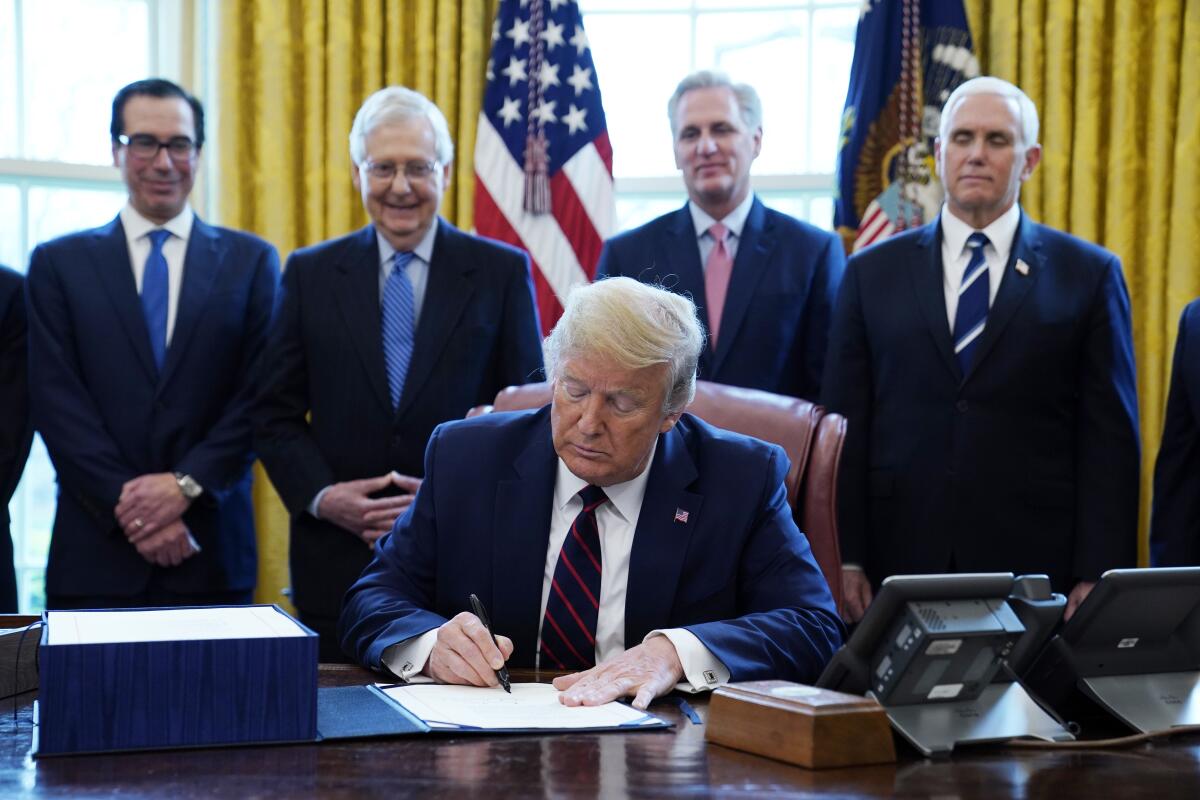
March 31: New York passes 75,000 coronavirus cases. The U.S. has more than 163,000 reported cases, as COVID-19 death toll reaches 3,000. Seventy percent of the U.S. population is under lockdown.
April 2: The number of coronavirus cases worldwide passes 1 million. More than 6.6 million workers file for unemployment in the United States.

April 3: The CDC recommends that everyone consider wearing cloth or fabric face masks in public.
April 4: President Trump, touting hydroxychloroquine as a treatment for COVID-19, says, “What do you have to lose?”
April 6: Boris Johnson is hospitalized with COVID-19.
April 8: Bernie Sanders drops out of the presidential race, clearing the way for Joe Biden to win the Democratic nomination.
April 10: The United States becomes the first country to report 2,000 coronavirus deaths in a single day.
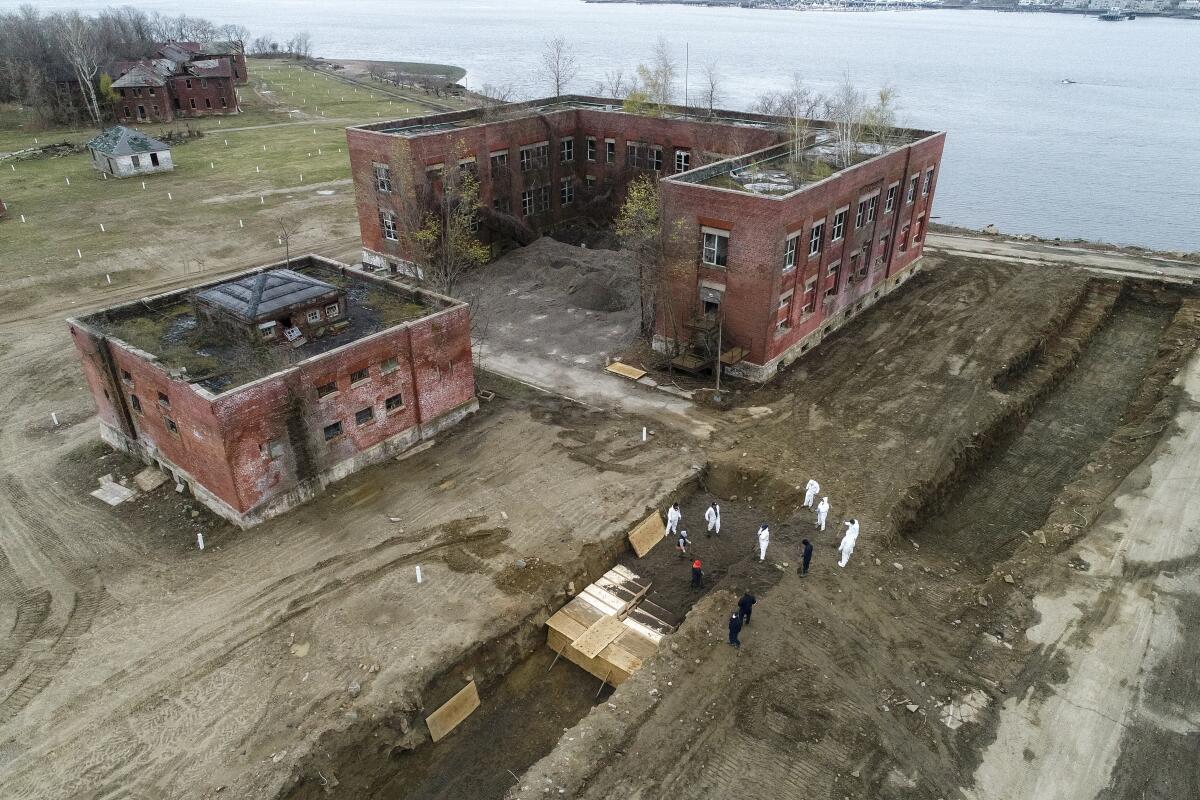
April 13: The IRS begins sending stimulus checks to Americans.
April 14: President Trump announces he will suspend U.S. funding for the World Health Organization.
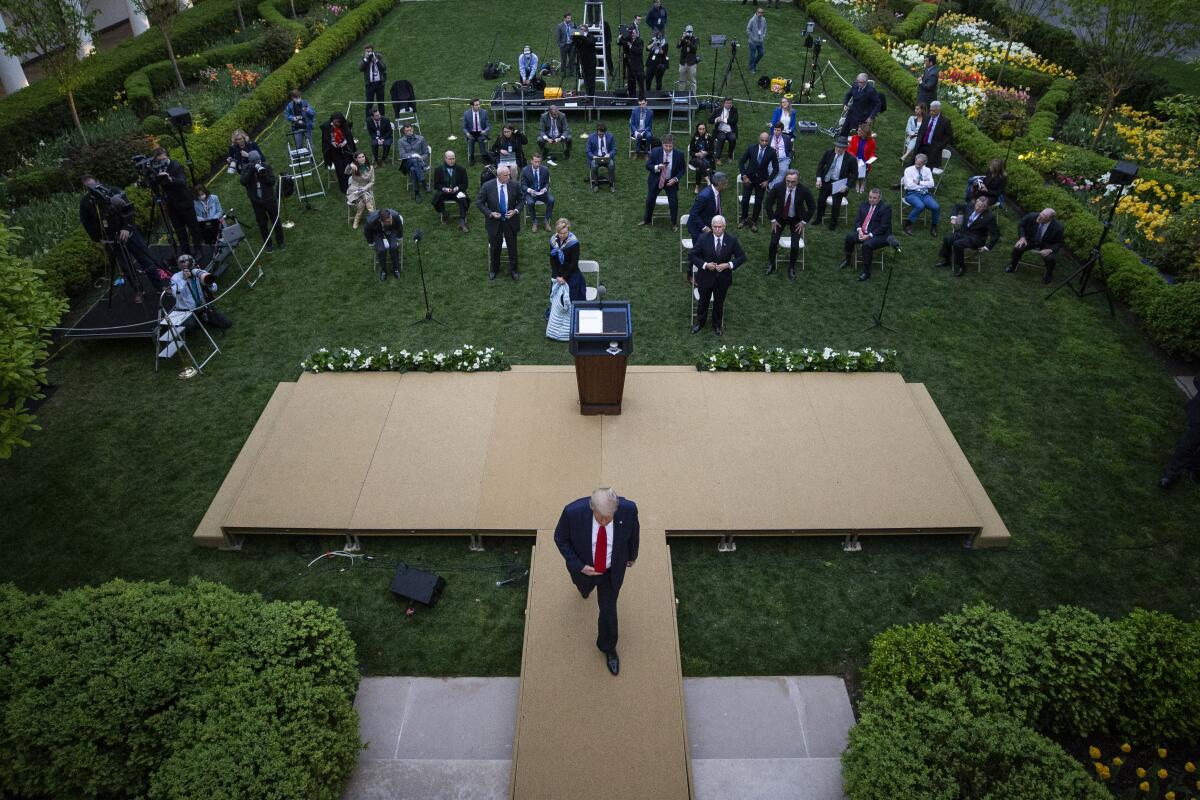
April 16: The Trump administration issues guidelines for a phased reopening of schools and businesses for parts of the U.S.
April 17: Texas becomes the first state to begin easing pandemic restrictions.
April 24: The U.S. death toll from COVID-19 surpasses 50,000.
April 27: The U.S. coronavirus cases surpass 1 million; worldwide cases top 3 million.
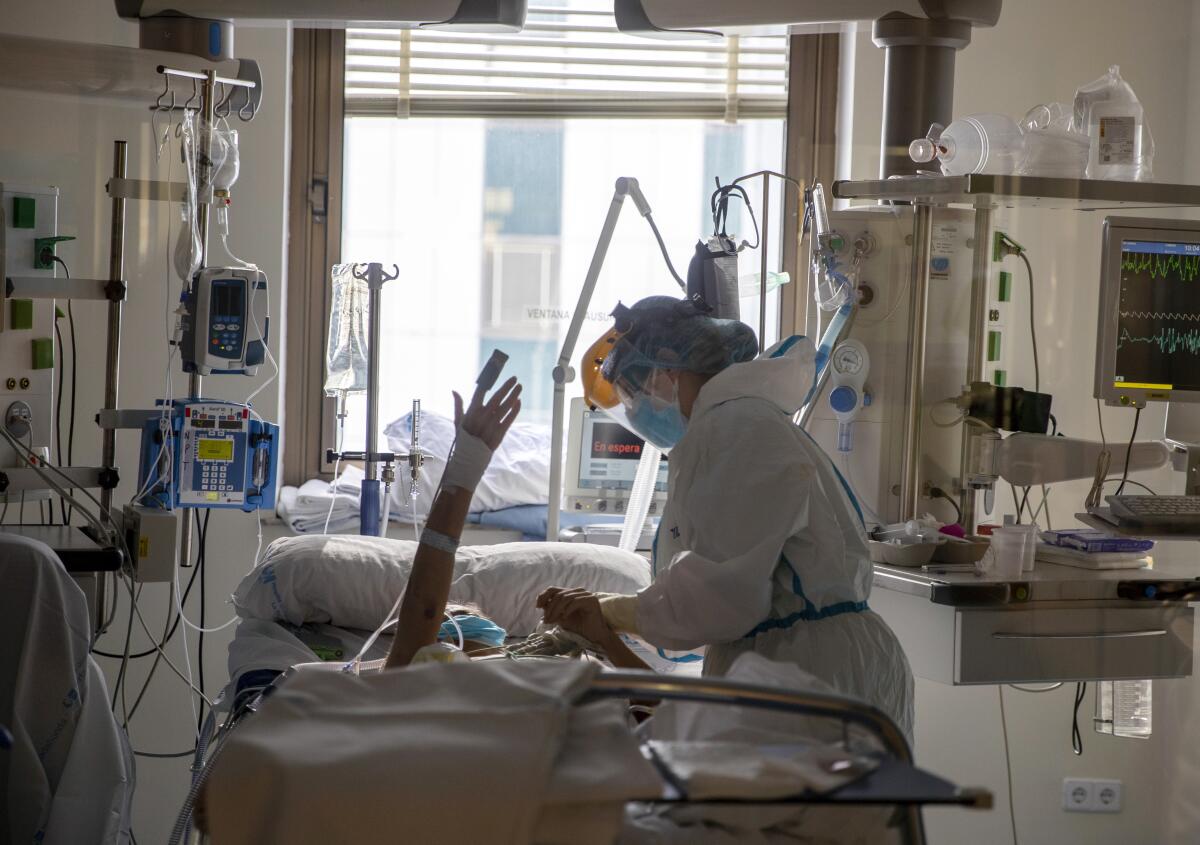
April 30: Armed protesters enter the state Capitol in Lansing, Mich., to demand an end to the pandemic lockdown.
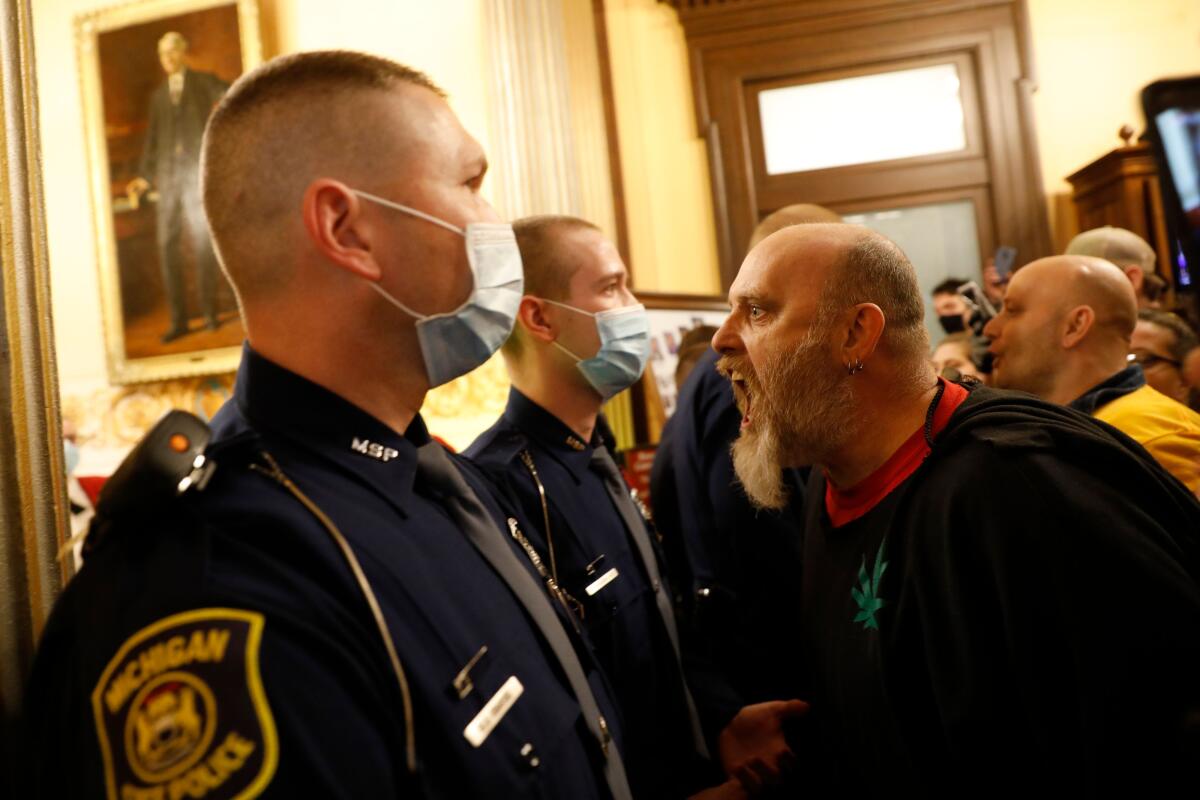
May 1: The FDA authorizes emergency remdesivir use to treat the sickest coronavirus patients.
May 3: The U.S. faces invasion of “murder hornets,” which threaten domestic bees.
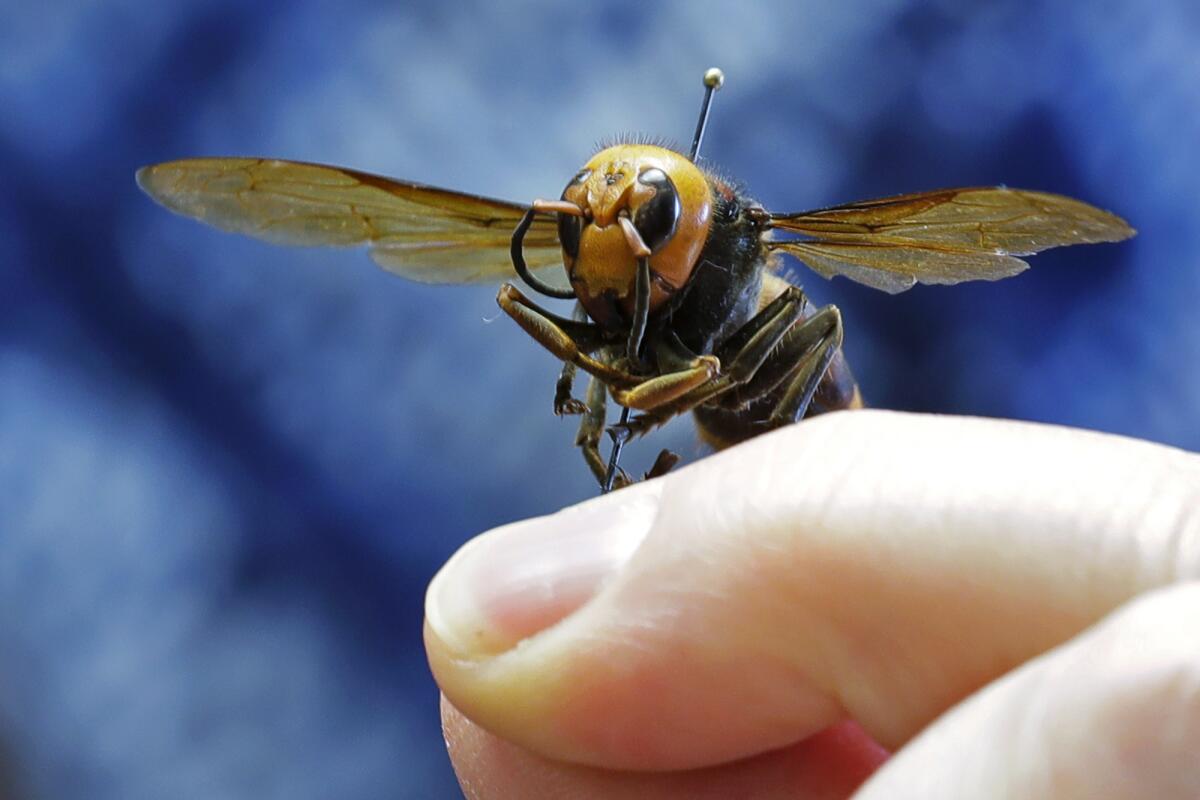
May 7: The Justice Department drops charges against former national security advisor Michael Flynn.
May 7: Gregory and Travis McMichael are charged with murder in the shoot death of Ahmaud Arbery in Georgia.
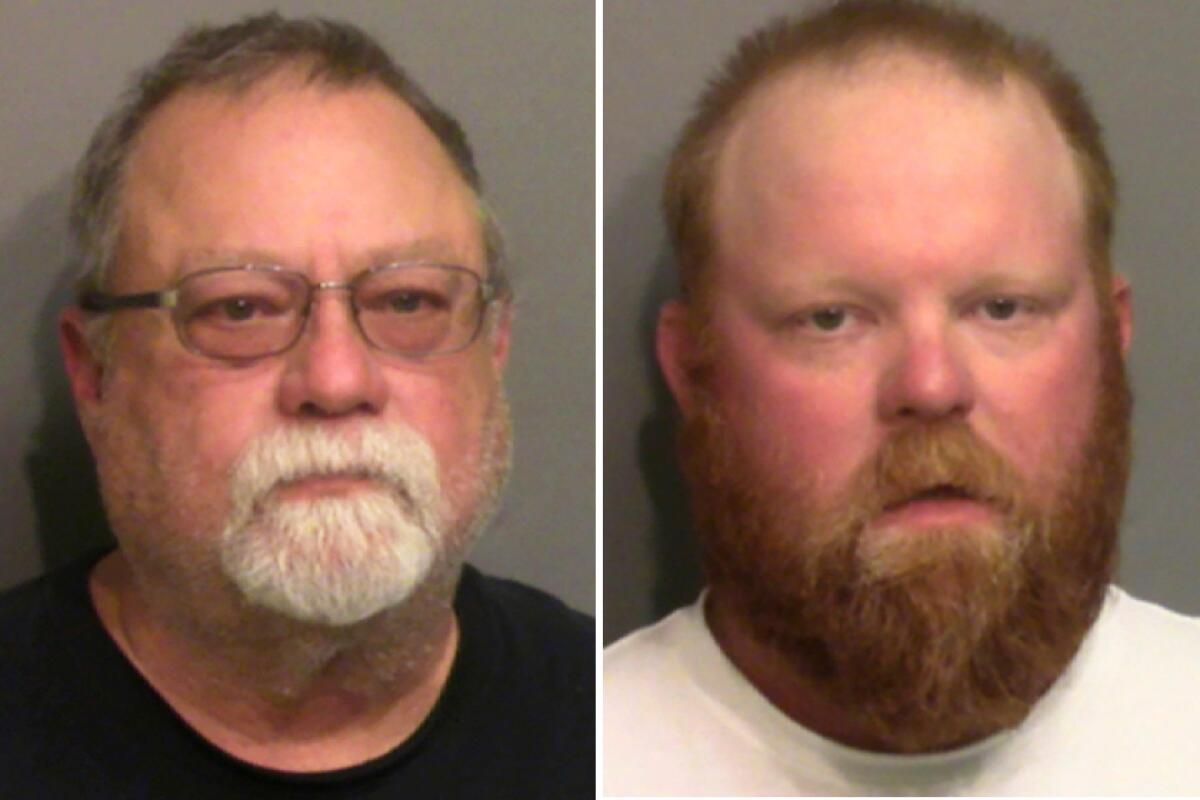
May 8: The U.S. unemployment reaches 14.7%, with more than 33 million jobless claims filed since mid-March.
May 15: The Trump administration announces Operation Warp Speed, a public-private partnership to speed up development of a COVID-19 vaccine.
May 15: Worldwide coronavirus deaths surpass 300,000.
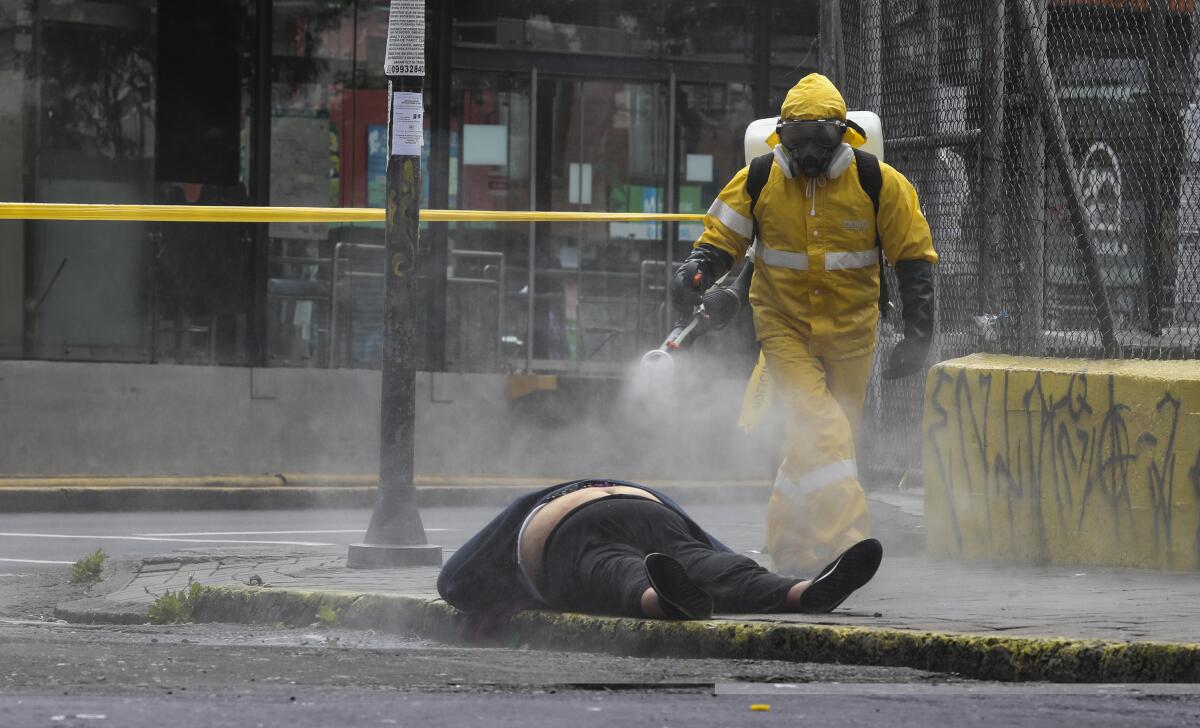
May 19: The U.S. passes 1.5 million confirmed COVID-19 cases and 90,000 deaths.
May 21: William Bryan, the man who filmed Ahmaud Arbery’s death, is also charged with murder.
May 22: Lori Loughlin and Mossimo Giannulli plead guilty in the college admissions scandal.
May 25: Minneapolis police officer is filmed while pressing his knee on the neck of George Floyd for about eight minutes, killing him, as three other officers stand by. Video of Floyd’s death goes viral; the four officers are fired the next day.
May 26: Twitter labels a tweet from President Trump as “misleading” for the first time and includes a “fact check” link.
May 28: A state of emergency is declared in Minneapolis-St. Paul as protests over the death of George Floyd and racial injustice spread nationwide.
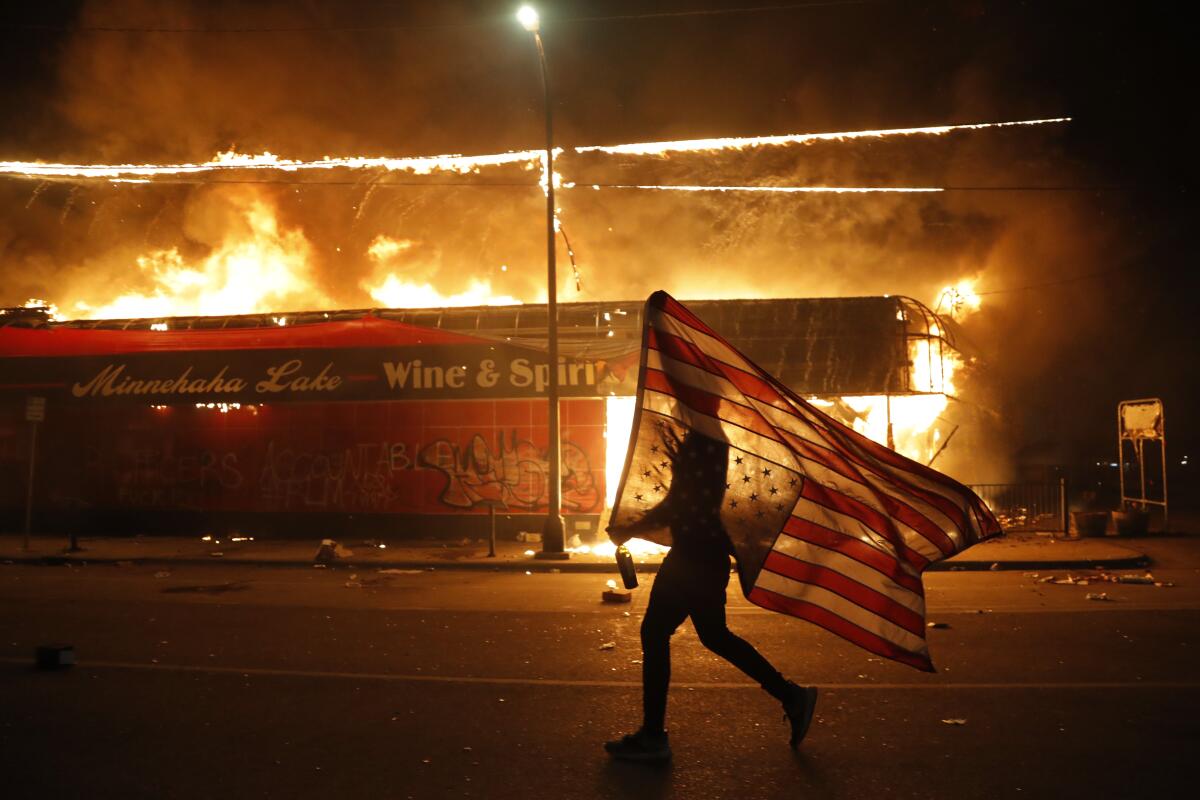
May 29: Fired Minneapolis Police Officer Derek Chauvin is charged with third-degree murder and manslaughter in the killing of George Floyd; the Minnesota attorney general increases the charge to second-degree murder on June 3. Charges against three other fired officers are filed.
May 30: A state of emergency is declared in Los Angeles County and city of Los Angeles because of protests over the death of George Floyd and racial injustice. Curfews are also declared in Philadelphia and Atlanta.
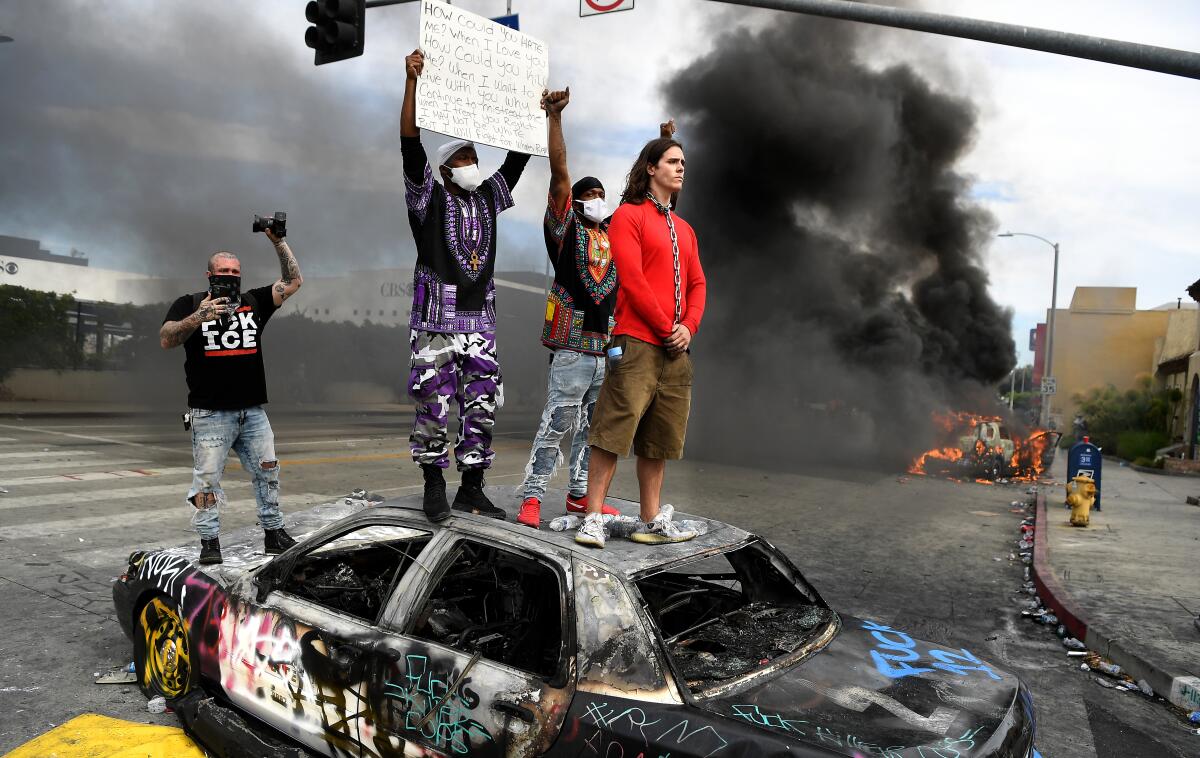
June 1: President Trump threatens to deploy U.S. troops to quell protests across the country and subsequently stages a photo-op at St. John’s Episcopal Church after federal officers and other law enforcement personnel forcefully clear peaceful protesters from Lafayette Square in front of the White House.
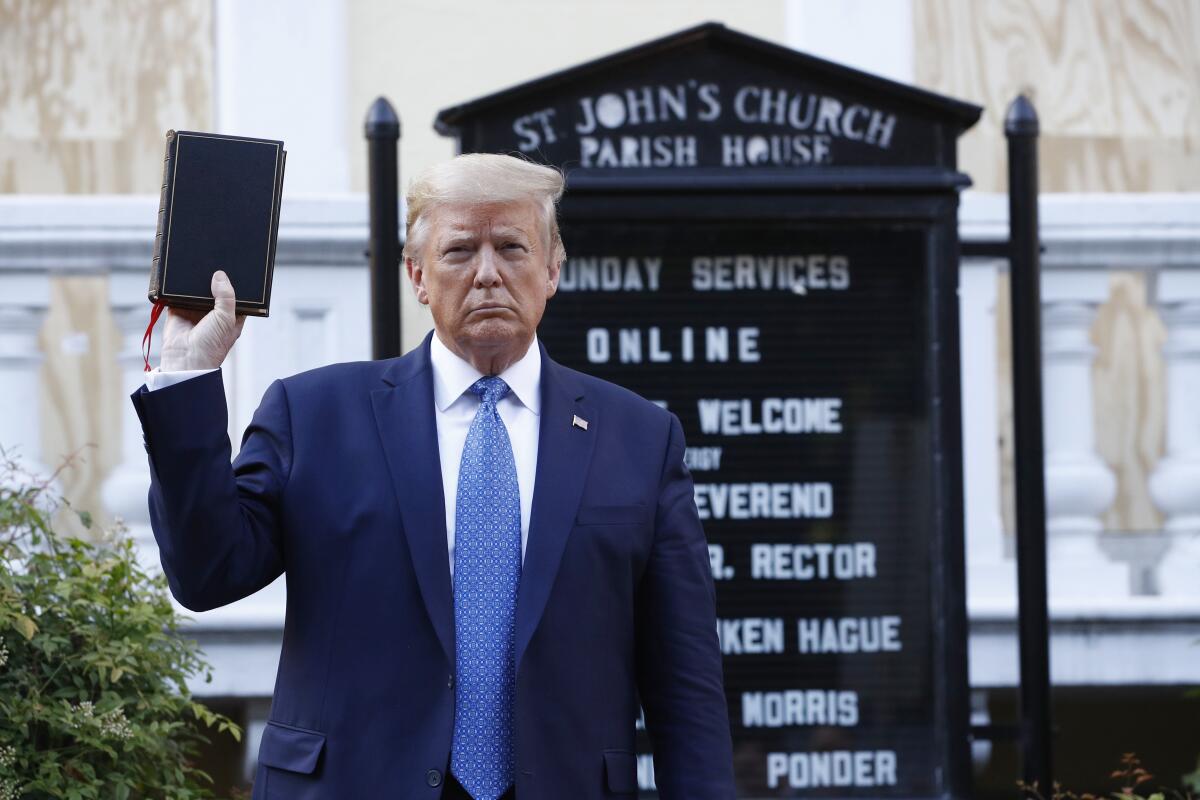
June 5: Washington, D.C., Mayor Muriel Bowser designates a section of 16th Street NW as Black Lives Matter Plaza.
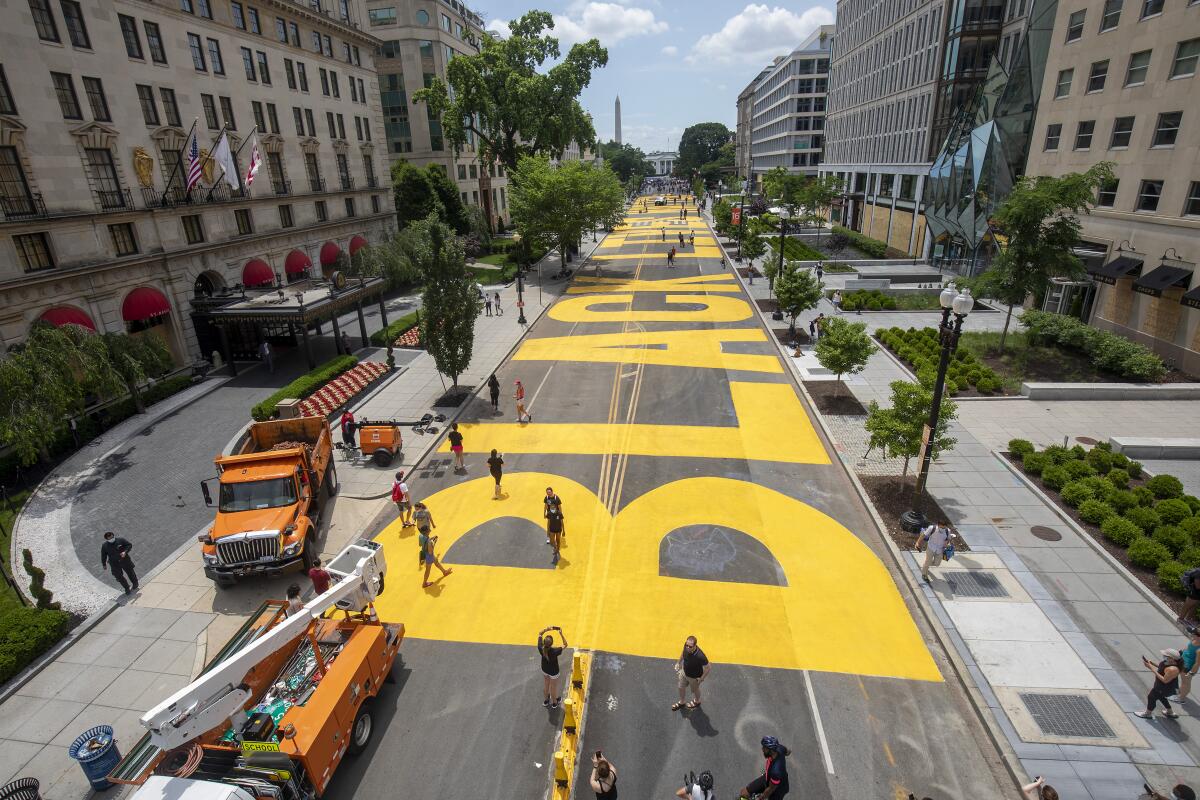
June 5: The NBA votes to restart its season in a “bubble” setting in Orlando, Fla.
June 8: Protesters in Seattle declare an “autonomous zone” in the city’s Capitol Hill area.
June 10: The number of confirmed COVID-19 cases in the U.S. exceeds 2 million.
June 12: Protests in Atlanta start after the killing of Rayshard Brooks by a police officer in the parking lot of a fast-food restaurant.
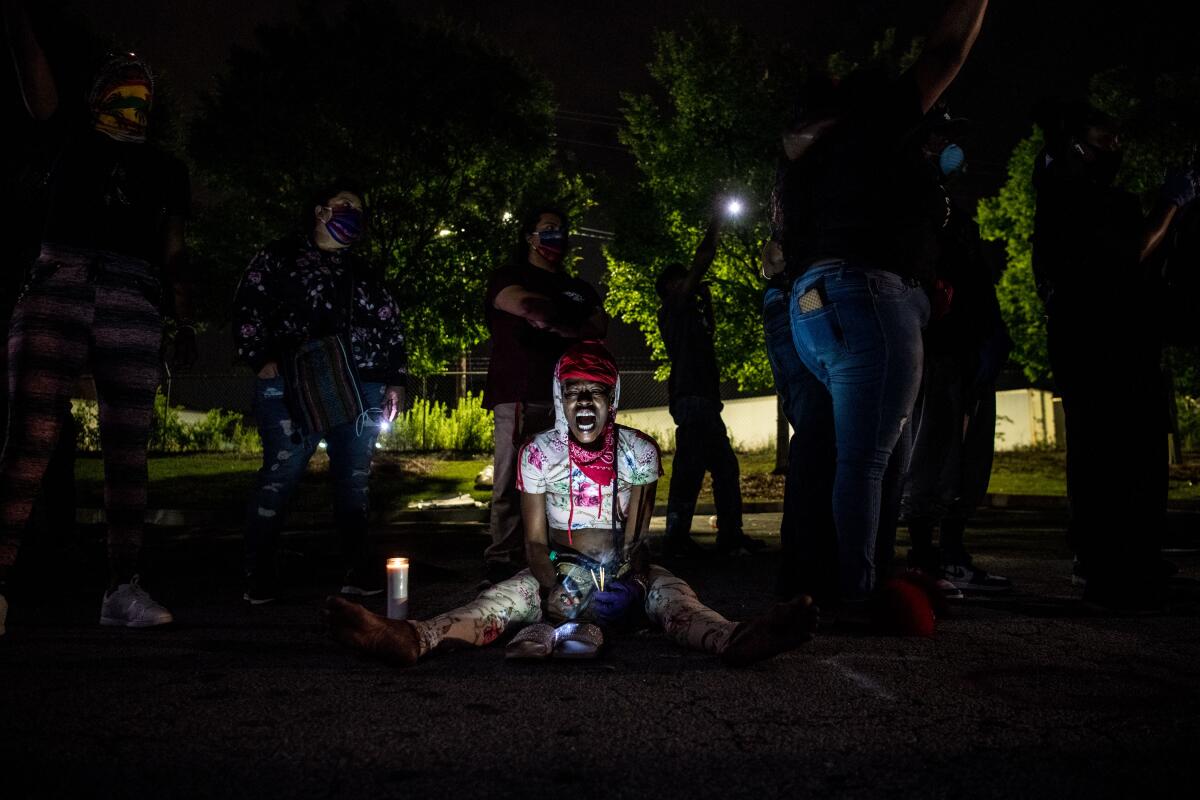
June 15: The U.S. Supreme Court rules that Title VII of the Civil Rights Act of 1964, which makes it illegal for employers to discriminate because of a person’s sex, also covers sexual orientation.
June 16: The Trump administration asks a federal judge to block publication of former national security adviser John Bolton’s memoir, “The Room Where It Happened.” The effort fails.
June 20: President Trump holds his first 2020 campaign rally in months in Tulsa, Okla. A lower than expected attendance makes for headlines.
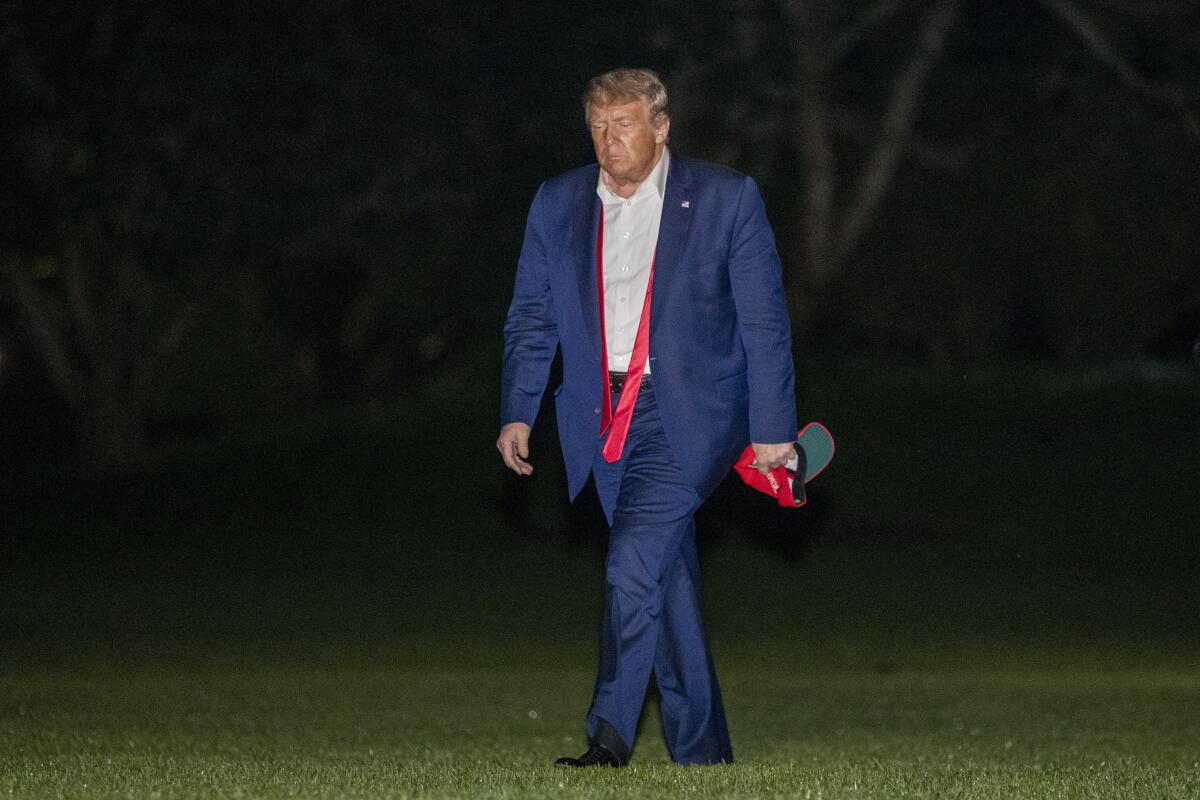
June 22: MLB clubs vote to start the 2020 season after players reject latest compensation offer.
June 25: After a downward trend of coronavirus infections in early June, the U.S. reaches a daily high of 40,000 new cases.
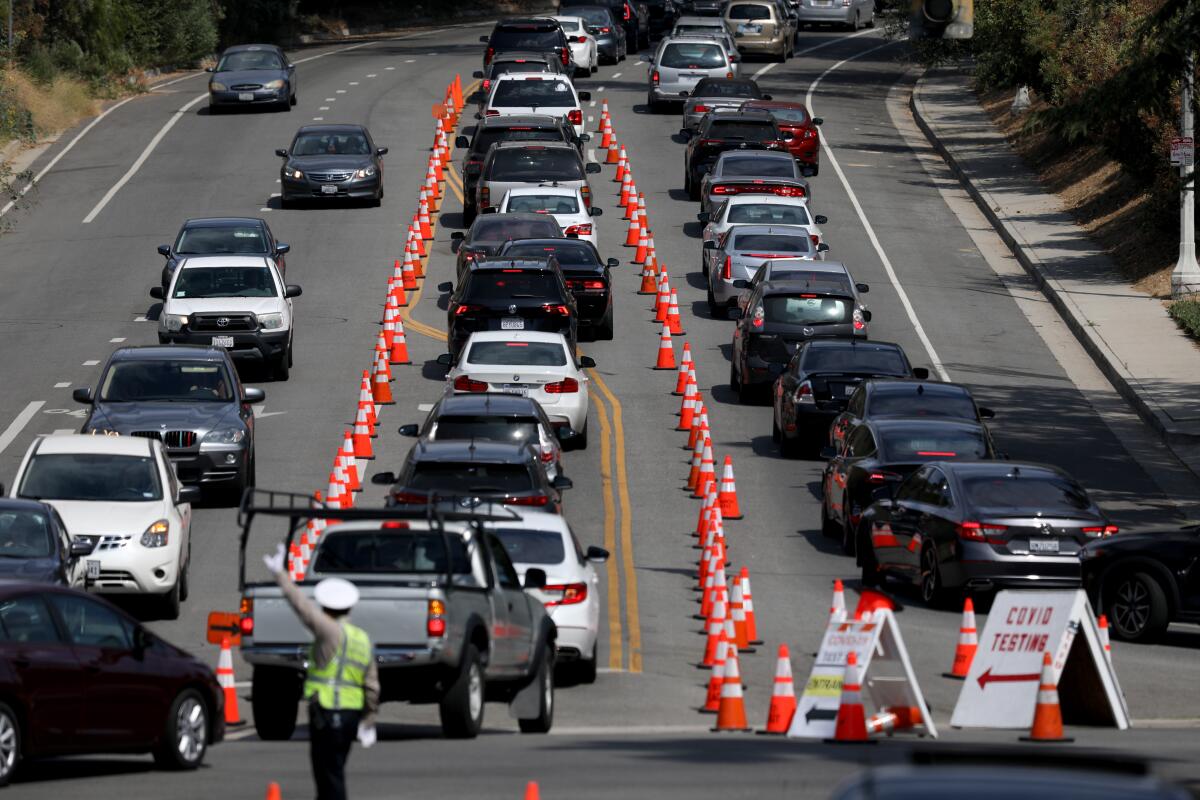
June 30: Following a vote by the state Legislature, Mississippi Gov. Tate Reeves signs a bill that retires the official state flag — the last state flag incorporating the Confederate battle flag in its design.
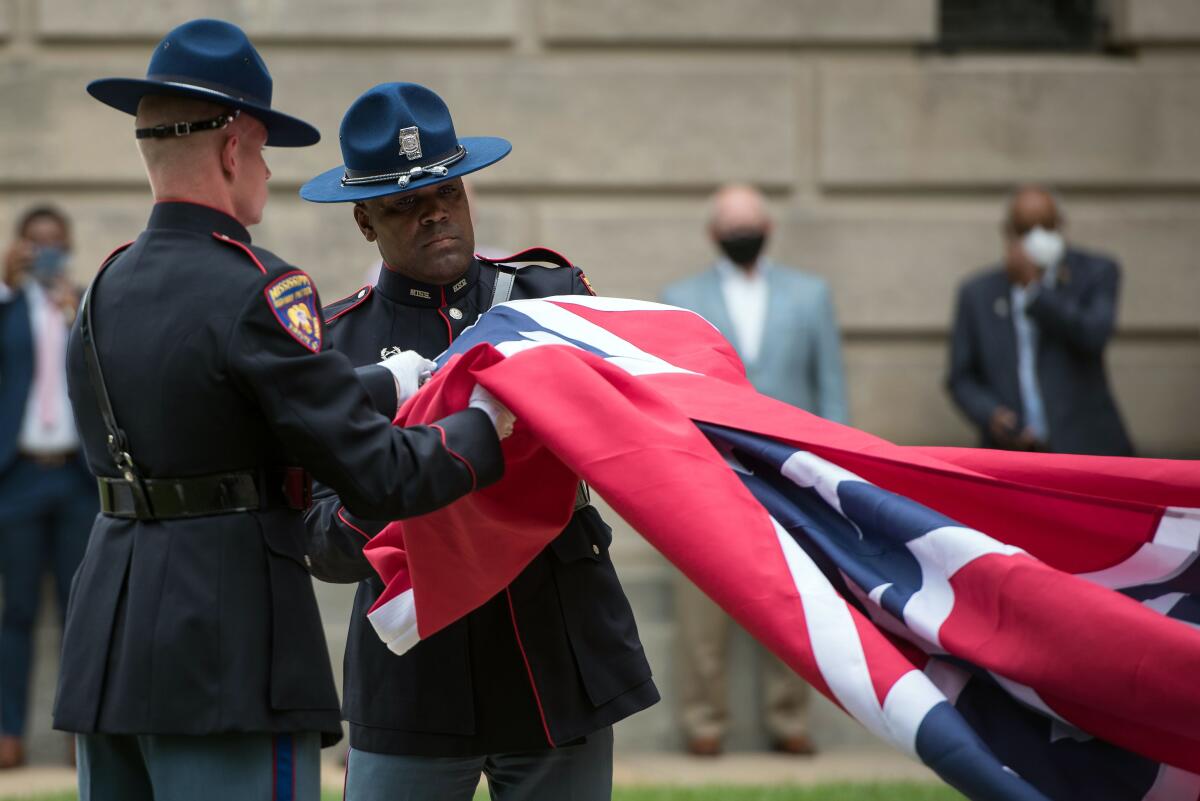
July 1: Gov. Gavin Newsom orders tougher restrictions on indoor activities for most of California.
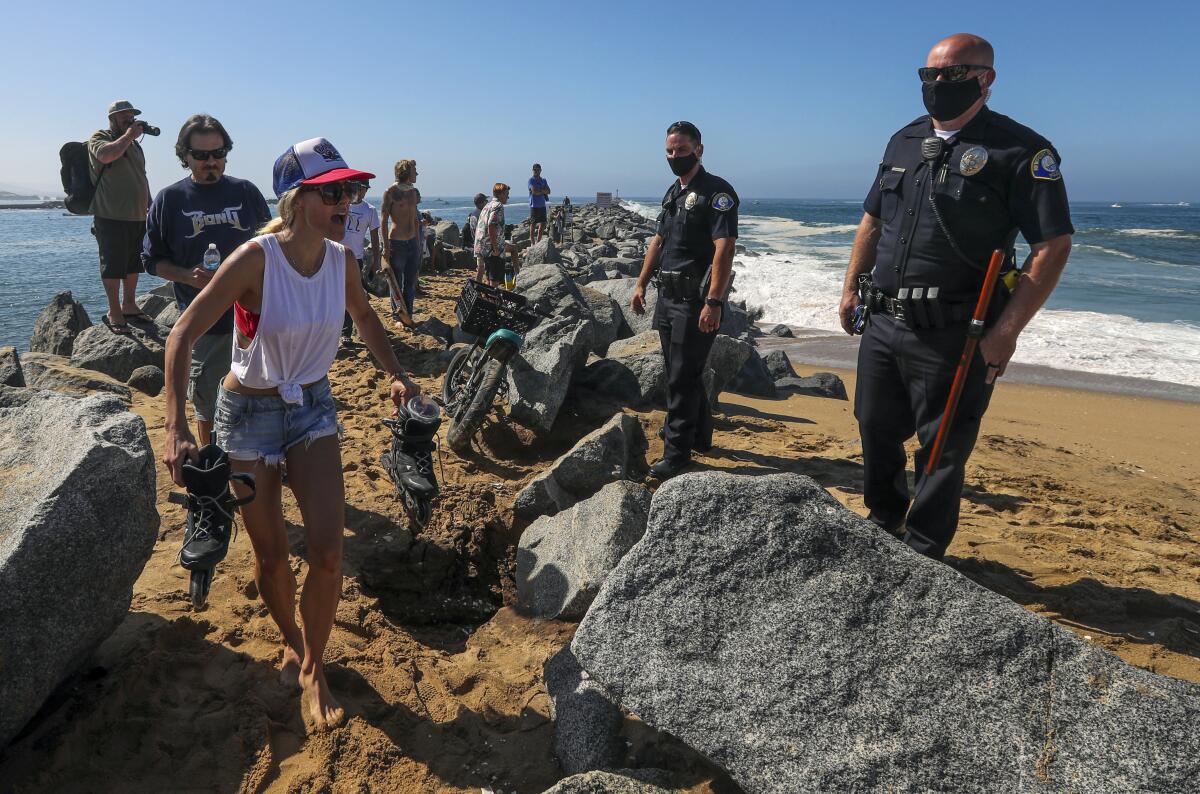
July 2: The FBI arrests Ghislaine Maxwell on charges she helped lure at least three girls to be sexually abused by the late financier Jeffrey Epstein.
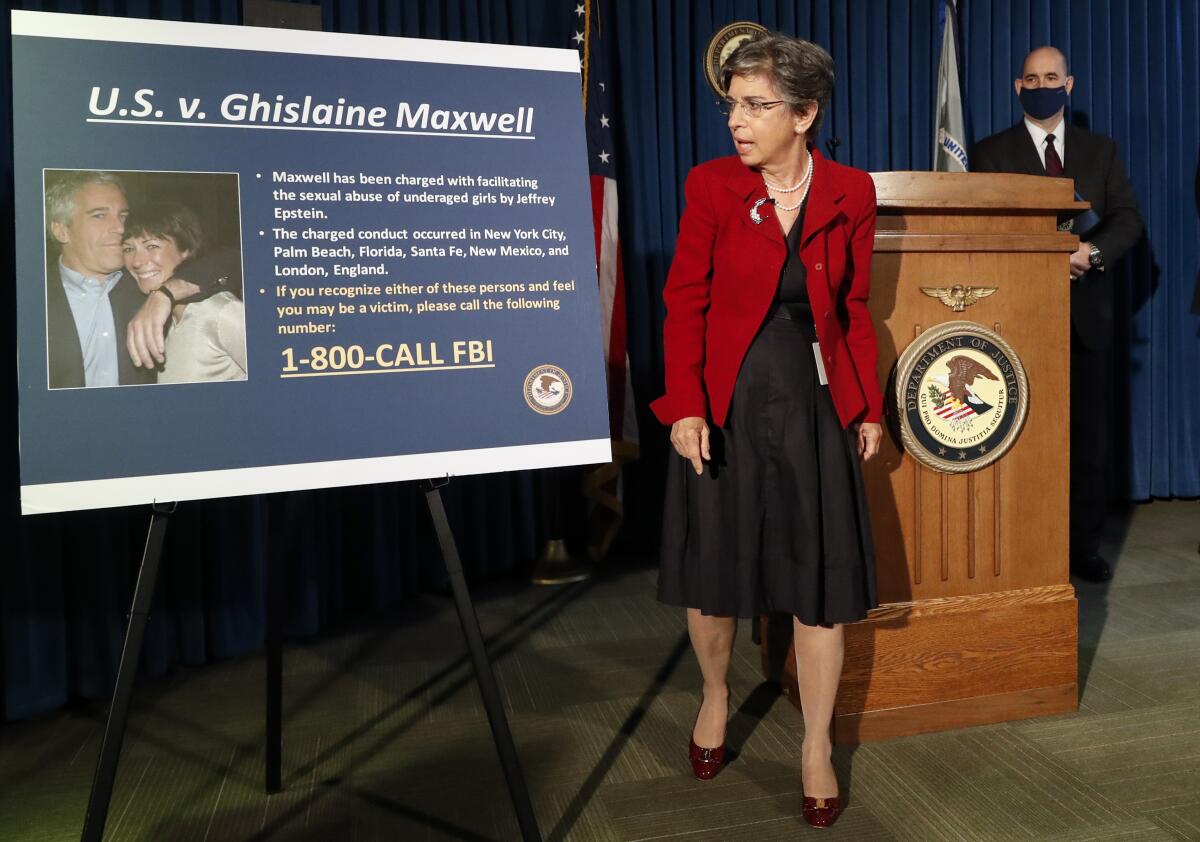
July 8: The Supreme Court rejects claims of presidential immunity and rules President Trump must release his financial records to prosecutors in New York.
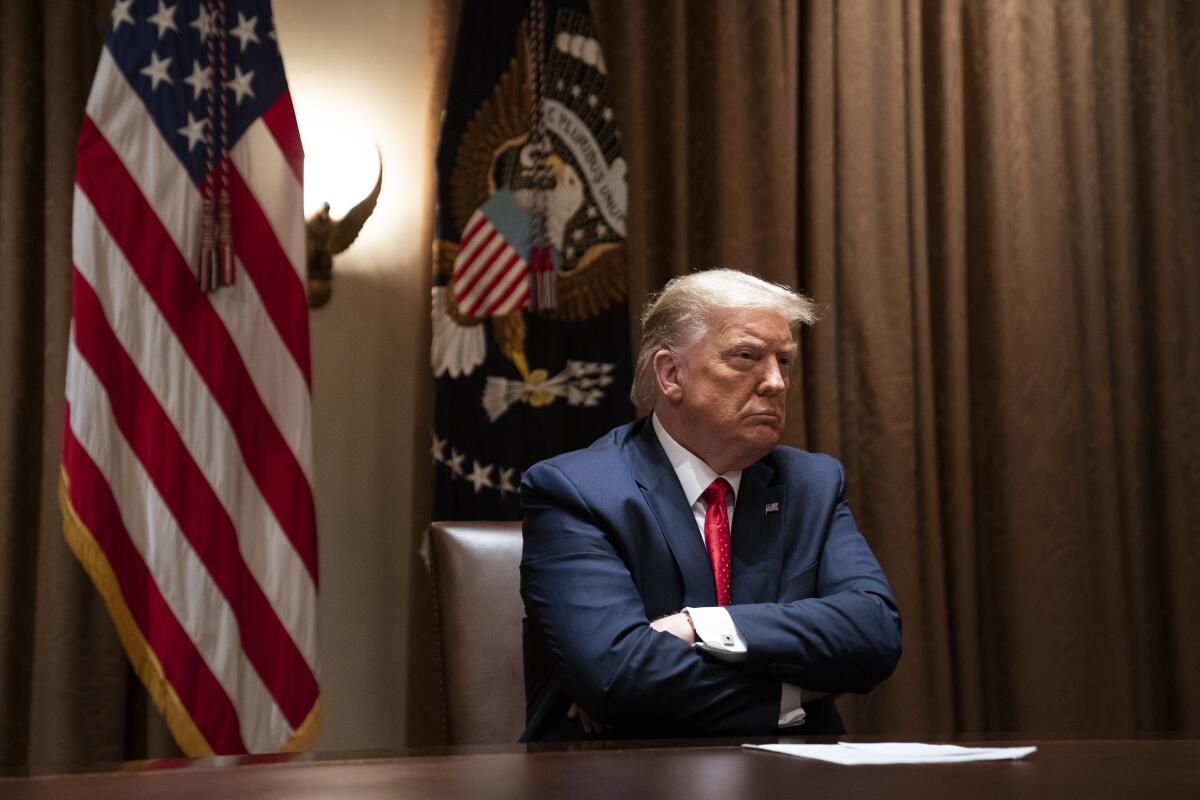
July 9: The Big Ten football conference says it will play only conference games in the fall.
July 10: The Pac-12 football conference says it will play only conference games in the fall.
July 10: California officials announce that as many as 8,000 prisoners could be released ahead of schedule in an unprecedented attempt to stop the spread of the coronavirus inside state prisons.
July 10: President Trump commutes the 40-month sentence of his political advisor Roger Stone.
July 14: The Trump administration orders hospitals to bypass the CDC and send all COVID-19 patient information to a central database in Washington.
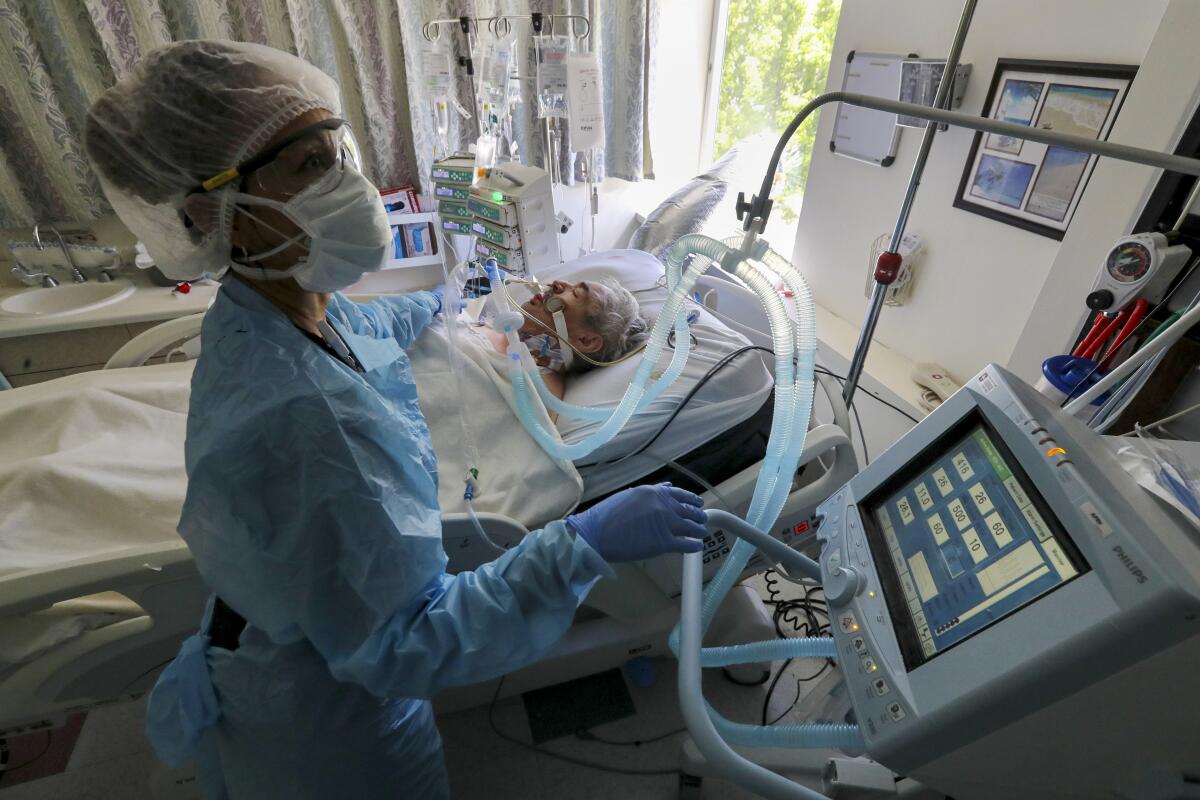
July 17: Secretary of Defense Mark Esper issues a memorandum to the military on the appropriate display of flags — excluding the Confederate battle flag and essentially banning it.
July 18: Oregon Atty. Gen. Ellen Rosenblum files suit against the federal government, accusing it of unlawfully detaining protesters in Portland.
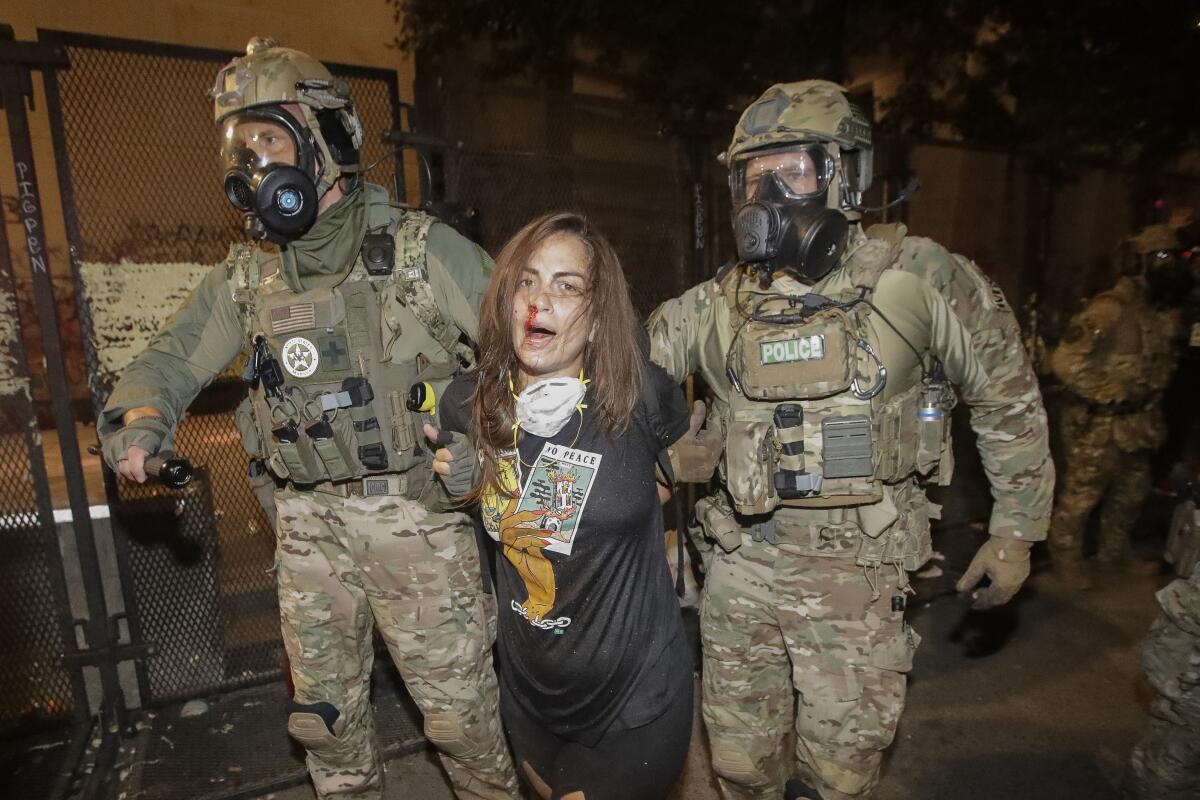
July 20: The NFL drops all preseason games and reaches an agreement with the players union on a coronavirus testing regimen.
July 22: President Trump announces a “surge” of federal officers into Democratic-run cities, following a crackdown on protests in Portland, Ore.
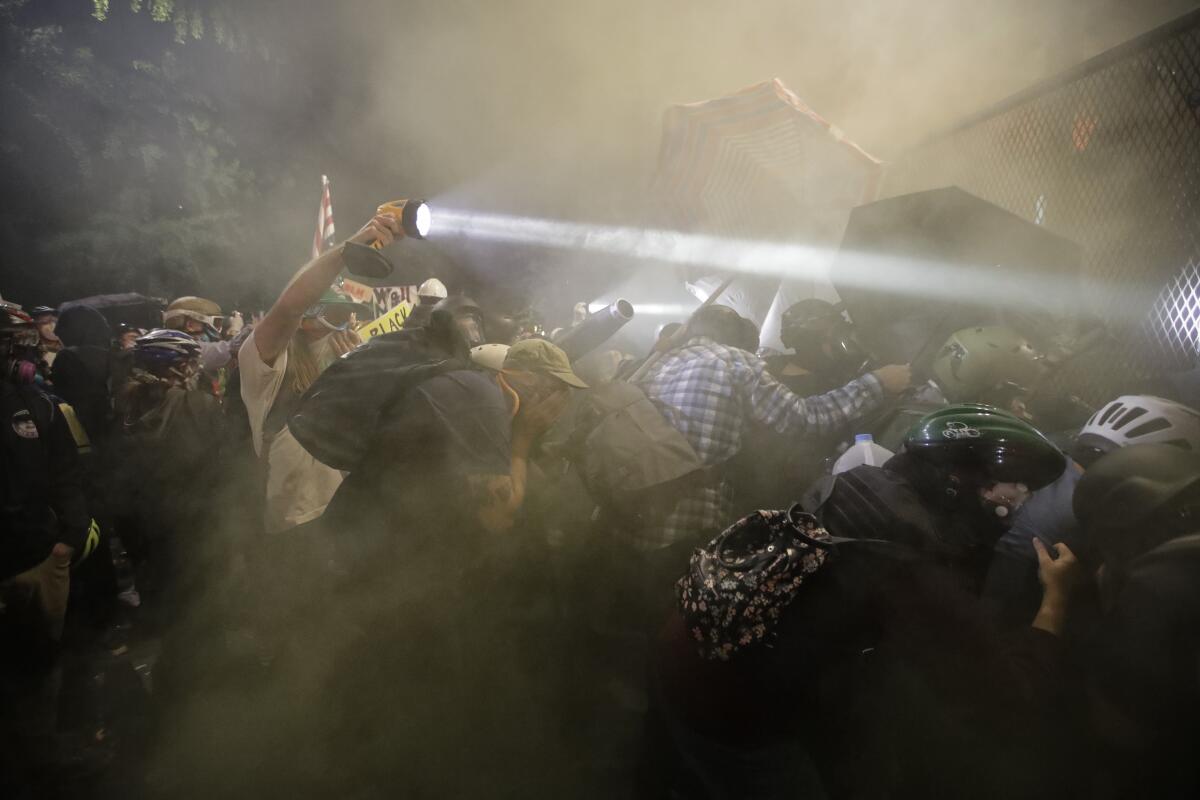
July 23: Major League Baseball’s 60-game season begins.
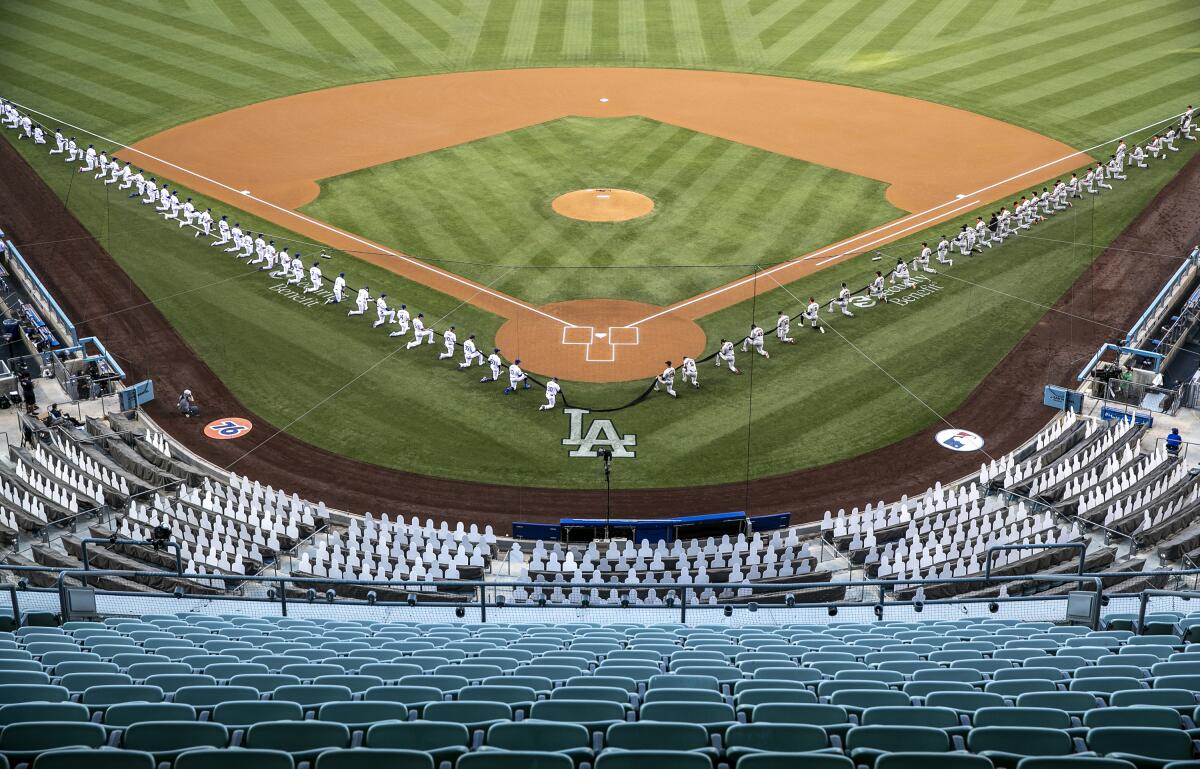
July 24: TV personality Regis Philbin dies at 88.
July 27: A coronavirus outbreak among the Miami Marlins prompts the cancellation of several games; subsequently several teams have games postponed as well.
July 30: President Trump suggests the 2020 presidential election be delayed, saying increased voting by mail could lead to fraud.
July 30: The 2019-20 NBA season resumes in the NBA “bubble” in Orlando, with the Lakers defeating the Clippers.
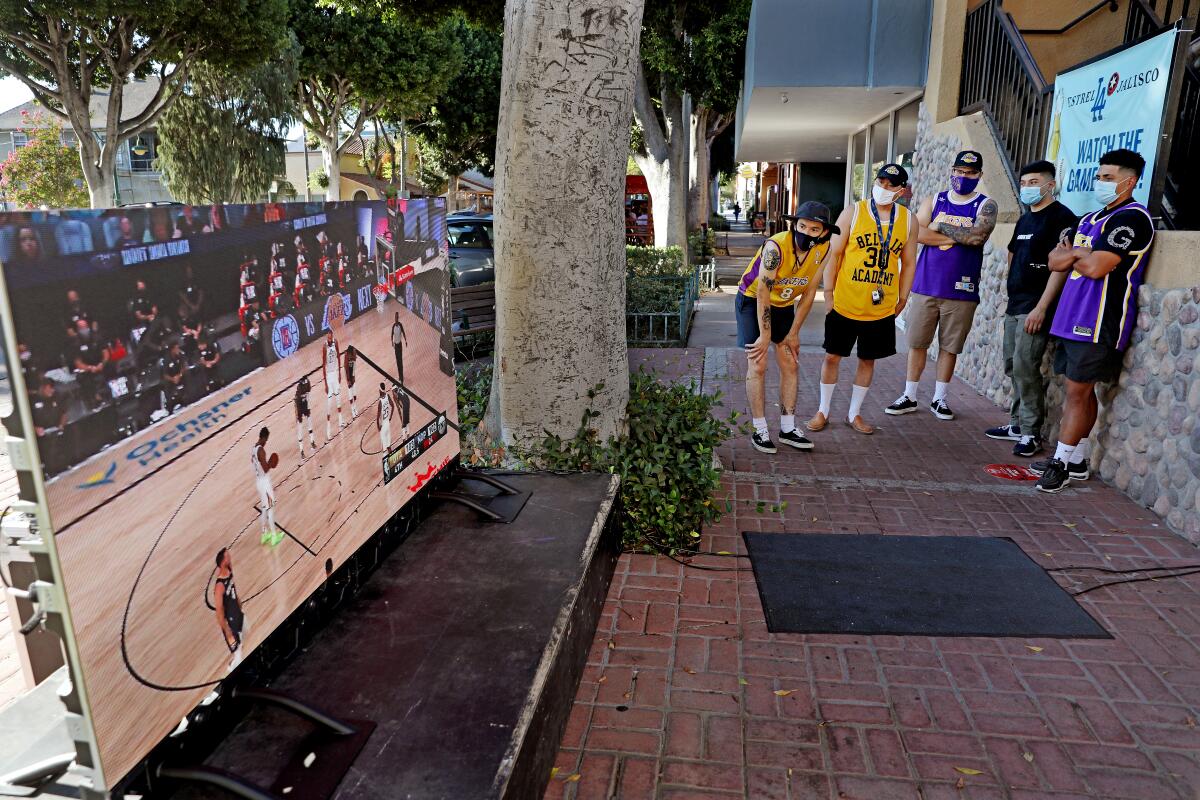
Aug. 2: Firefighters continue to battle the Apple fire that burned 20,000 acres in Cherry Valley and surrounding areas of Riverside and San Bernardino counties, destroying one home and prompting evacuations of thousands of others.
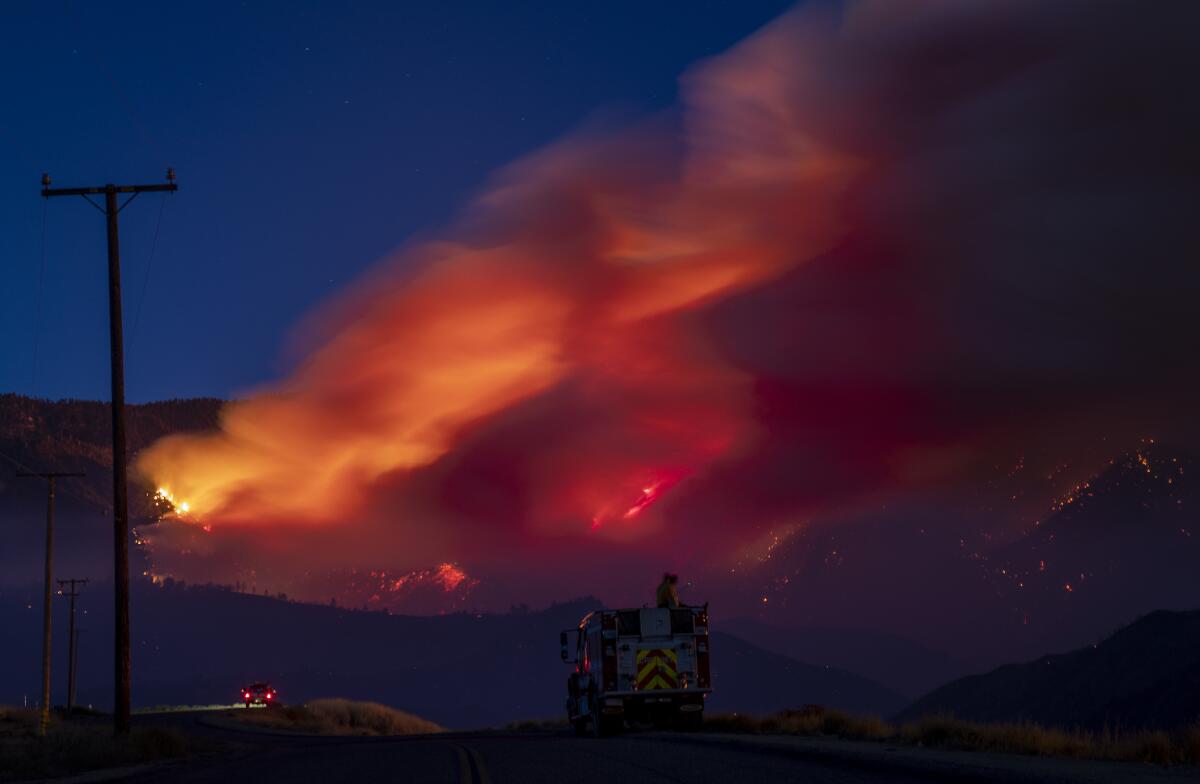
Aug. 3: Los Angeles City Councilman Jose Huizar pleads not guilty to bribery, money laundering and an array of other charges, his first public response to the allegations in the corruption inquiry since prosecutors began, securing guilty pleas from others in the case.
Aug. 3: As California grapples with a deluge of requests for unemployment benefits amid the pandemic, some state workers processing claims say they are hampered by outdated technology, bureaucratic red tape and a shortage of trained, experienced staff.
Aug. 7-16: More than 400,000 people, most without face masks and who don’t follow social distancing guidelines, participate in activities related to the Sturgis Motorcycle Rally in South Dakota.
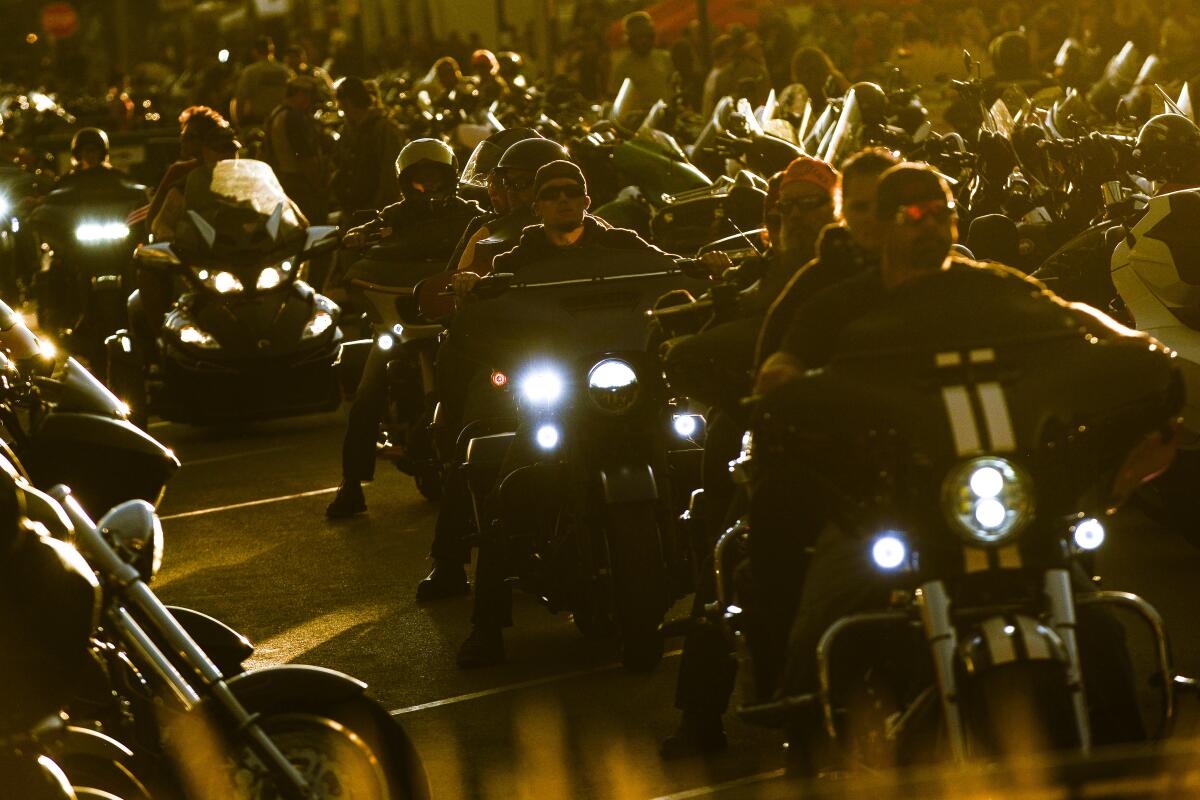
Aug. 11: Joe Biden announces Sen. Kamala Harris of California as his vice presidential running mate, the first woman of color to appear on a major party’s presidential ticket.
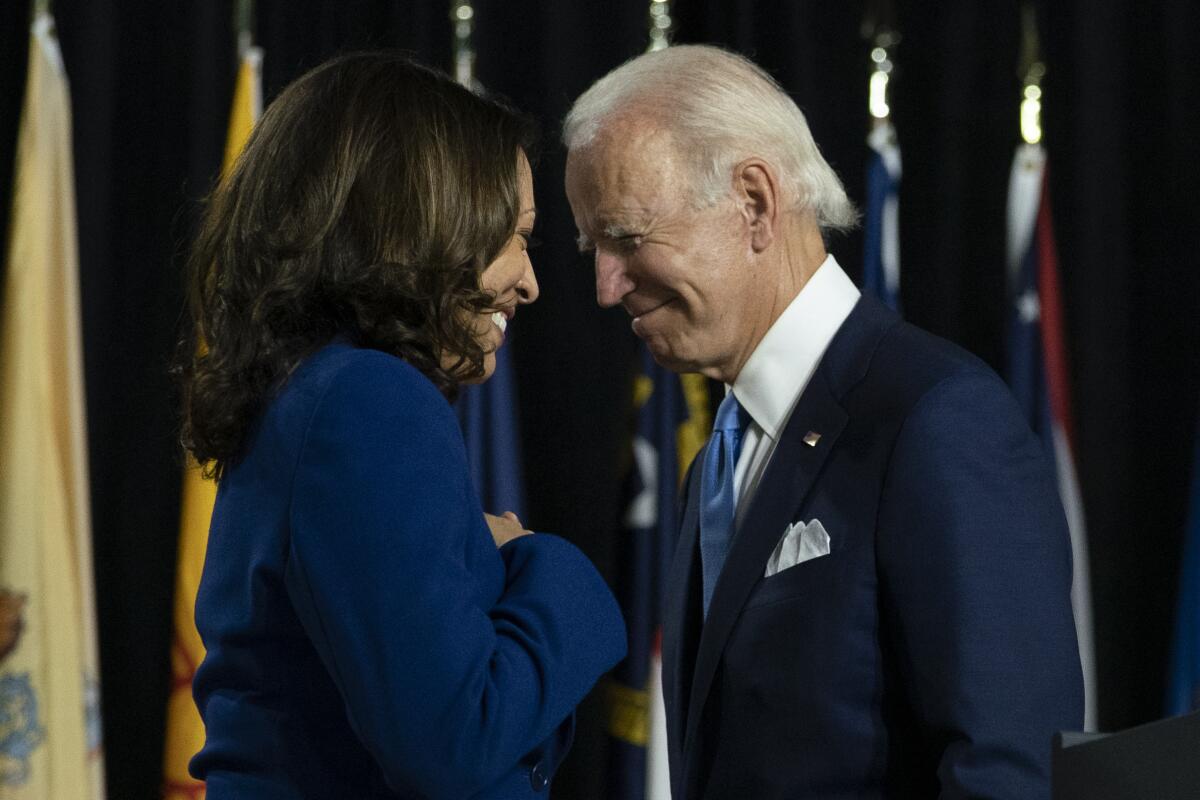
Aug. 11: The Pac-12 and Big Ten conferences announce the cancellation all fall sports. The ACC and SEC conferences say they’re still planning to play football; on Aug. 12, the Big 12 announces it will play.
Aug. 13: Plans are announced by the U.S. Postal Service to remove hundreds of high-volume mail-processing machines from postal facilities across the country.
Aug. 16: Thunderstorms trigger hundreds of wildfires in California, prompting evacuations as a record-breaking heat wave taxes the state’s power grid.
Aug. 16: The SCU Lightning Complex fires start, affecting several Bay Area counties. Almost 400,000 acres are burned, making it the third largest wildfire in California history.
Aug. 16: The August Complex fire starts in Northern California; by Sept. 9 it becomes the largest fire in California history, burning more than 1 million acres.
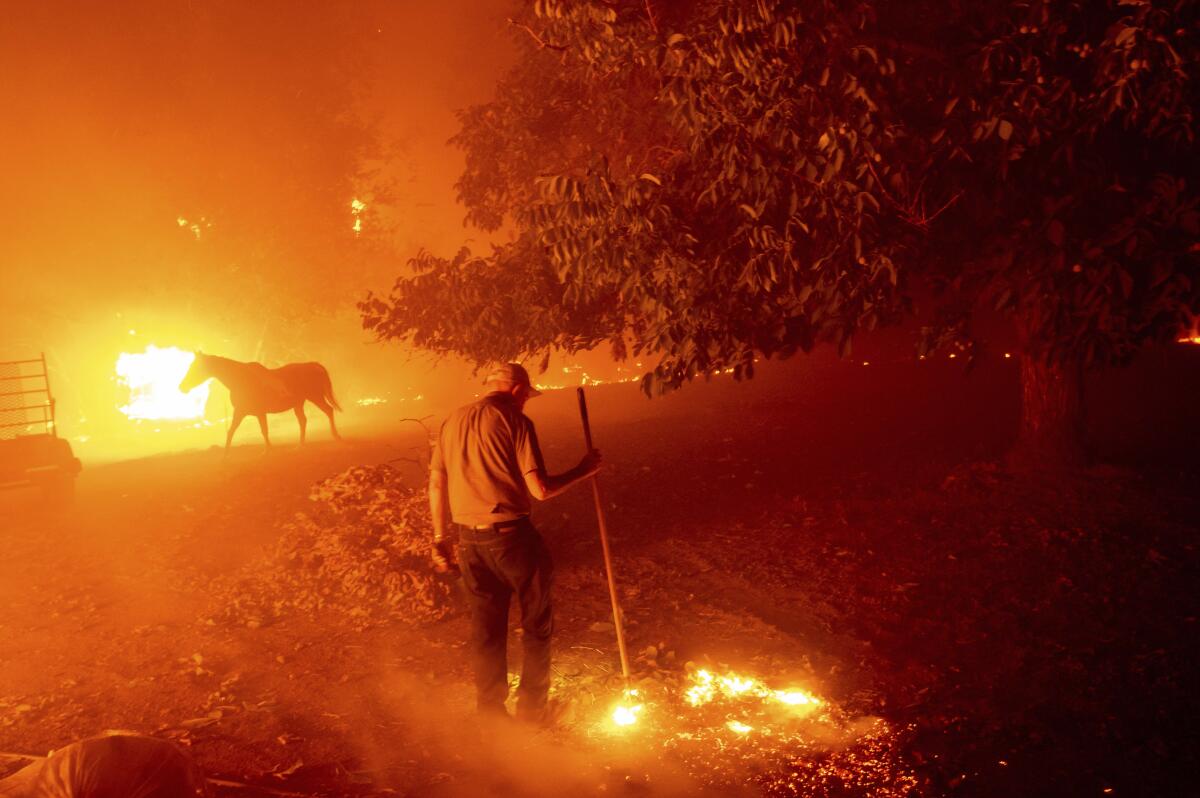
Aug. 16: Death Valley hits 130 degrees, thought to be highest temperature on Earth in nearly a century.
Aug. 16: Spurred by concerns that President Trump is trying to eviscerate the U.S. Postal Service to help him win reelection, Speaker Nancy Pelosi summons House members back to Washington to pass a bill aimed at rolling back administration cutbacks that could cripple widespread mail-in voting.
Aug. 17: The LNU Lightning Complex fires start and last for several weeks, scorching more than 350,000 acres in several wine country counties, including Napa, Sonoma, Solano, Lake and Yolo.
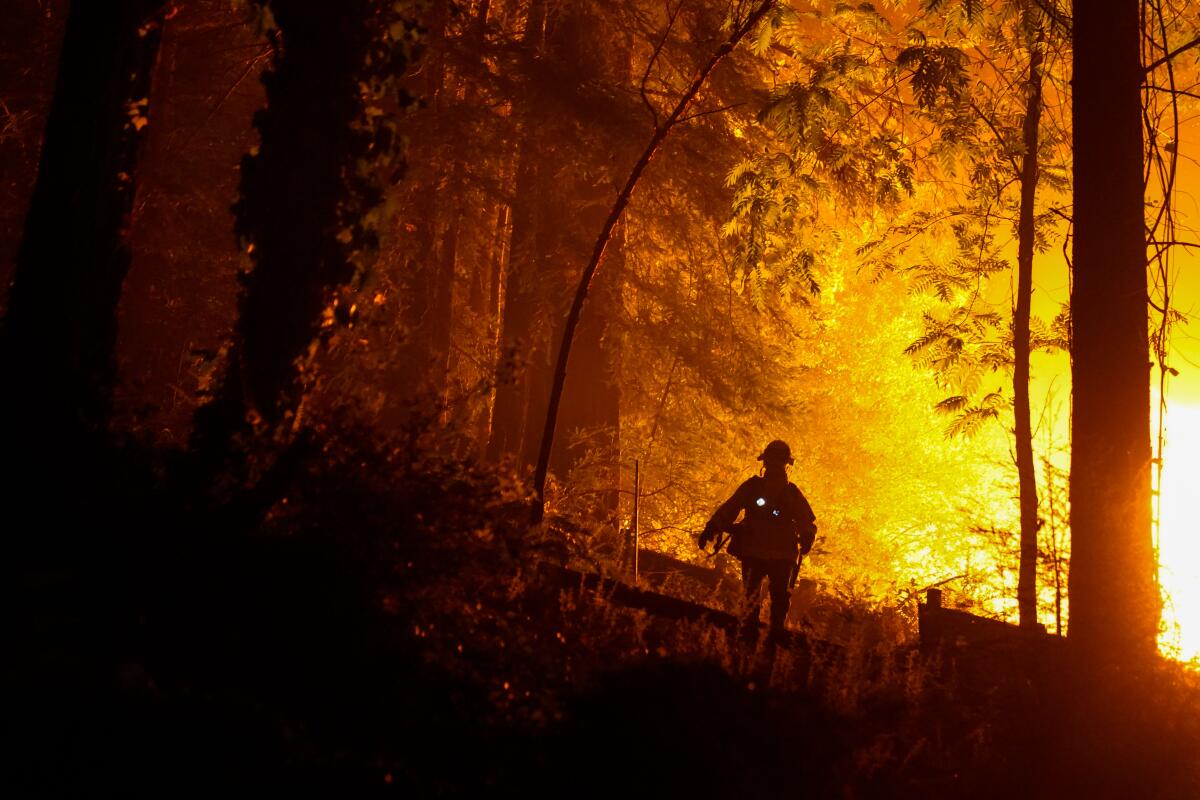
Aug. 17-20: The Democratic National Convention is staged in Milwaukee, with events happening virtually. The Democrats formally choose Joe Biden and Kamala Harris as their nominees for their 2020 presidential ticket.

Aug. 18: NBCUniversal ousts longtime Universal studio executive Ron Meyer after learning he made hush-money payments to a woman to cover up an old affair — a secret that Meyer said snowballed into an extortion plot.
Aug. 19: Apple becomes first U.S. company to be valued at more than $2 trillion.
Aug. 20: Former Trump advisor Stephen K. Bannon is arrested and charged with fraud over a private fundraising campaign to build a border wall.
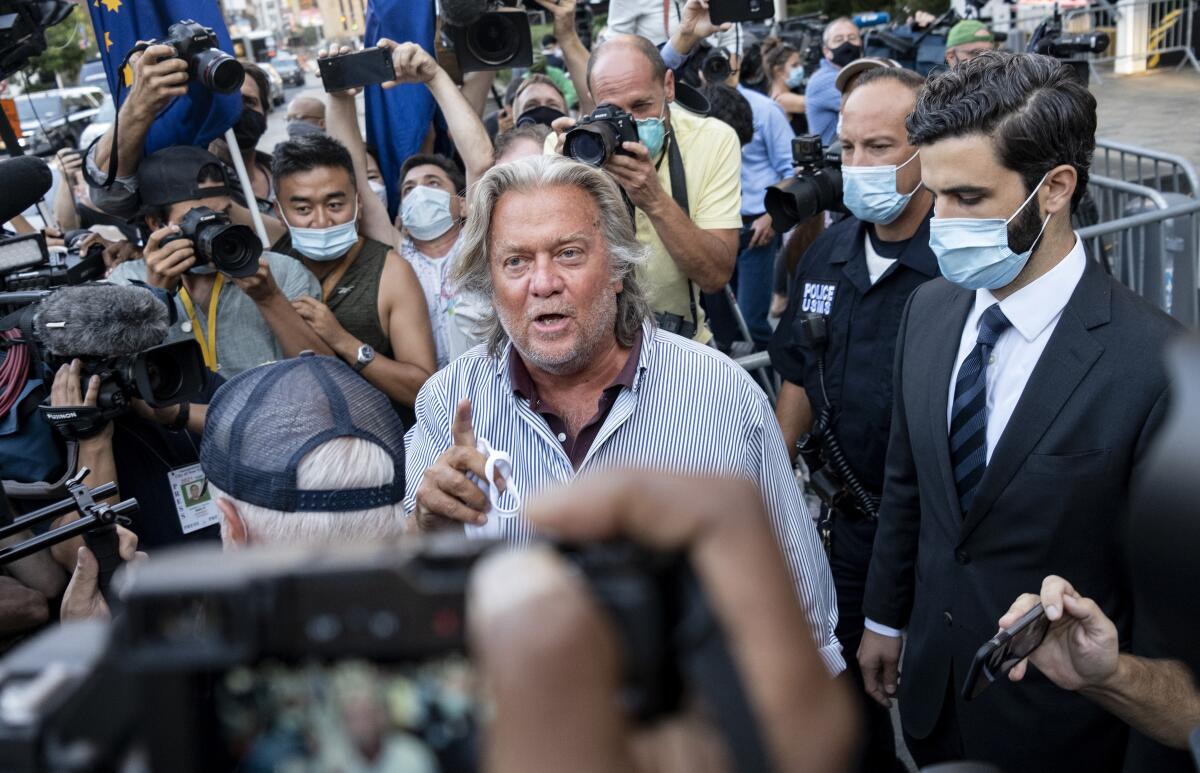
Aug. 20: Wildfires ringing the Bay Area and other parts of the state kill at least five people, destroy more than 500 structures and scorch hundreds of square miles as evacuations expand.
Aug. 21: A Sacramento County judge sentences the Golden State Killer, 74-year-old Joseph James DeAngelo Jr., to life without parole for killing 13 people and raping 50 in a series of break-ins that terrorized the state for decades.
Aug. 23: Protests break out in Kenosha, Wis., after the shooting of 29-year-old Jacob Blake by a police officer.
Aug. 24-27: The Republican National Convention is held in Charlotte, N.C., and Washington. President Trump and Vice President Mike Pence are formally nominated as the GOP’s 2020 presidential ticket.
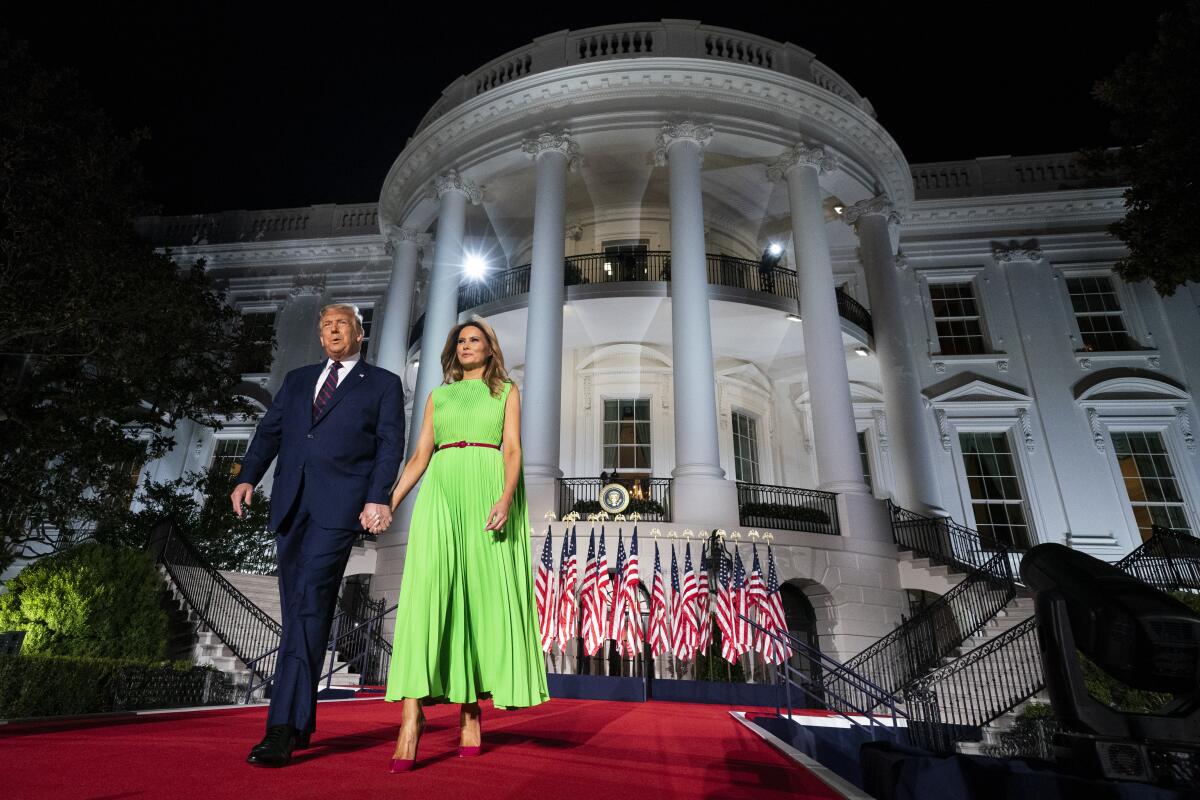
Aug. 25: Two people are shot and killed during unrest in Kenosha, Wis.; a suspect is arrested. Soon after, professional athletes start to boycott their sports to protest the shooting of Jacob Blake.
Aug. 28: Actor Chadwick Boseman dies at age 43 following a previously undisclosed battle with colon cancer.
Sept. 1: Family members and activists demand that the Los Angeles County Sheriff’s Department release the names of the deputies who shot and killed Dijon Kizzee, a Black man, in the South Los Angeles neighborhood of Westmont on Aug. 31.
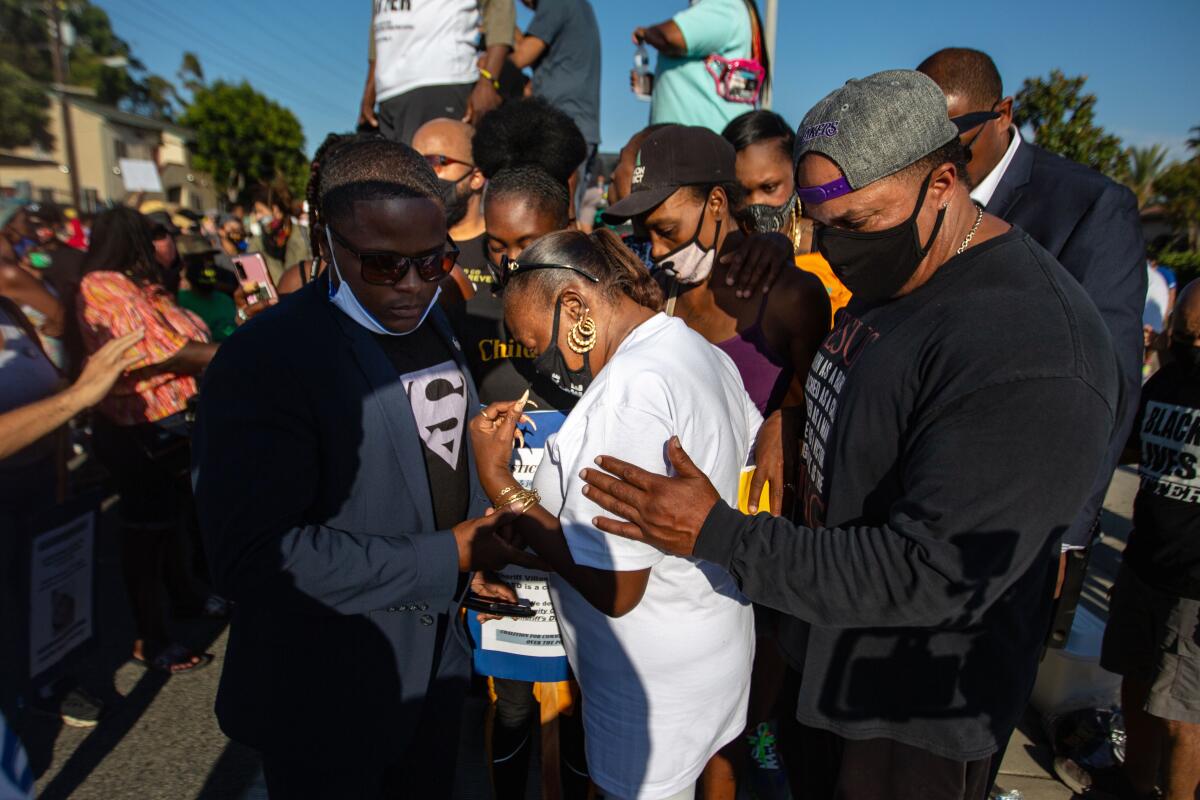
Sept. 5: The El Dorado fire erupts in San Bernardino County, sparked by pyrotechnics that were part of a gender reveal party.

Sept. 6: California sets a new record for destruction by wildfires, with 2.1 million acres burning.
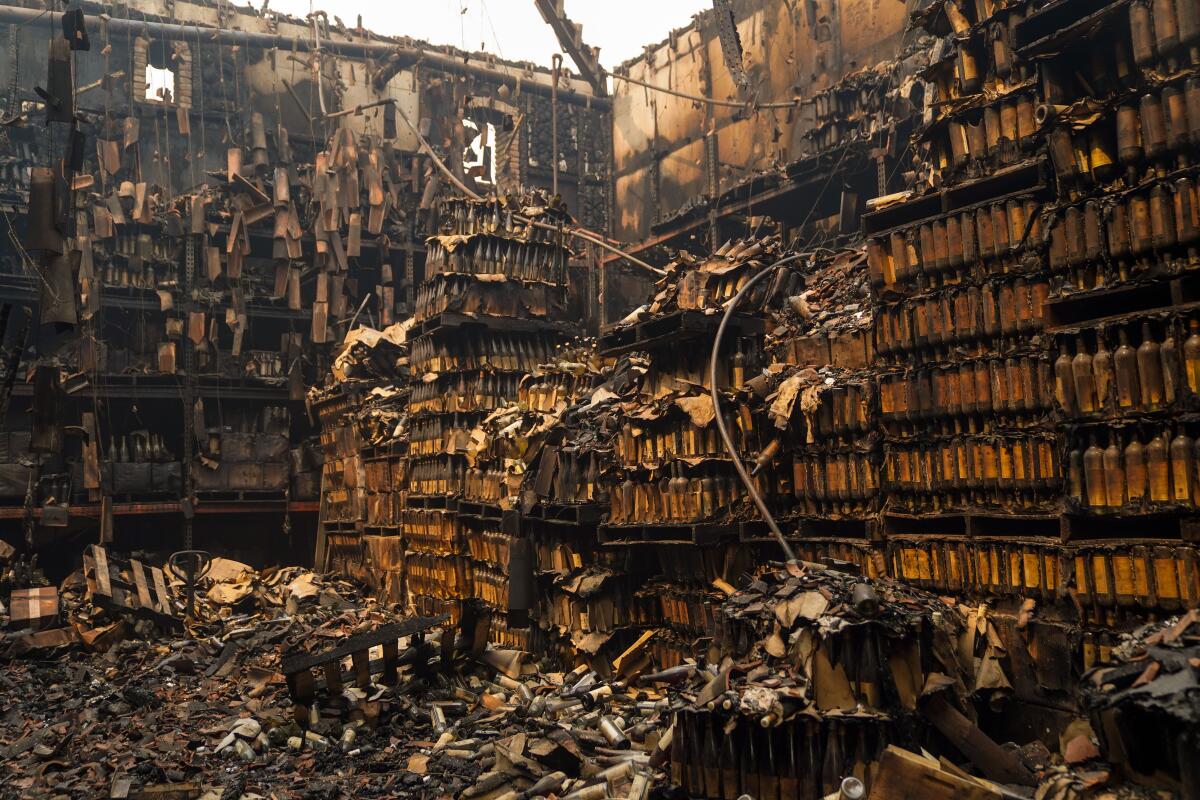
Sept. 6: The temperature in Woodland Hills soars to 121 degrees, an all-time high in Los Angeles County.
Sept. 7: Oregon wildfires start amid severe drought and severe winds; by the end of October, more than 1 million acres will burn, more than 4,000 homes will be destroyed, and at least 10 people will be killed.
Sept. 10: More than half a million people in Oregon, more than 10% of the state’s population, are reported to be fleeing wildfires.
Sept. 12: Two Los Angeles County sheriff’s deputies are shot and critically injured while sitting in their patrol car near the Compton Metro station. The agency’s response to the attack raises alarm among some activists, lawmakers and Sheriff’s Department watchdogs.
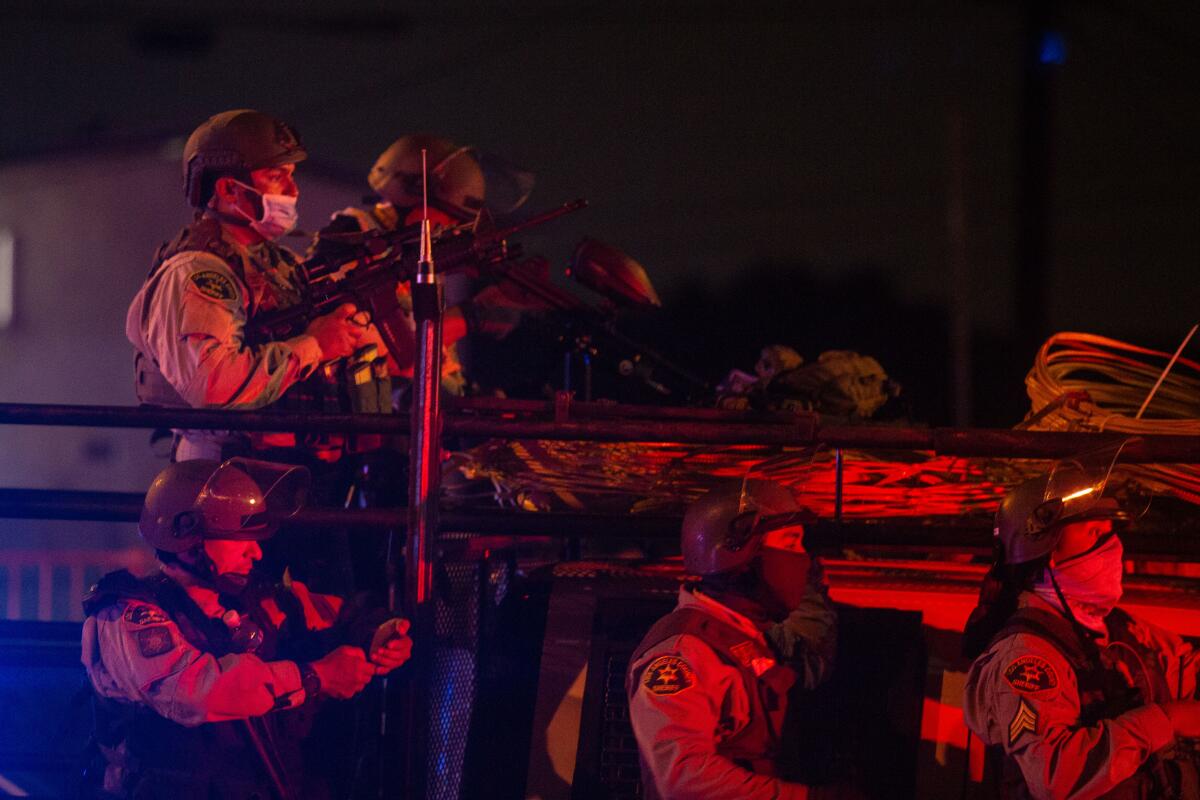
Sept. 15: The confirmed death toll from California’s unprecedented firestorms rises to 25 as crews work to stop some two dozen major blazes still burning statewide.
Sept. 16: The Big Ten conference reverses course and announces it will play a 2020 fall football season beginning Oct. 23-24.
Sept. 18: Long-serving Supreme Court Justice Ruth Bader Ginsburg dies at 87.
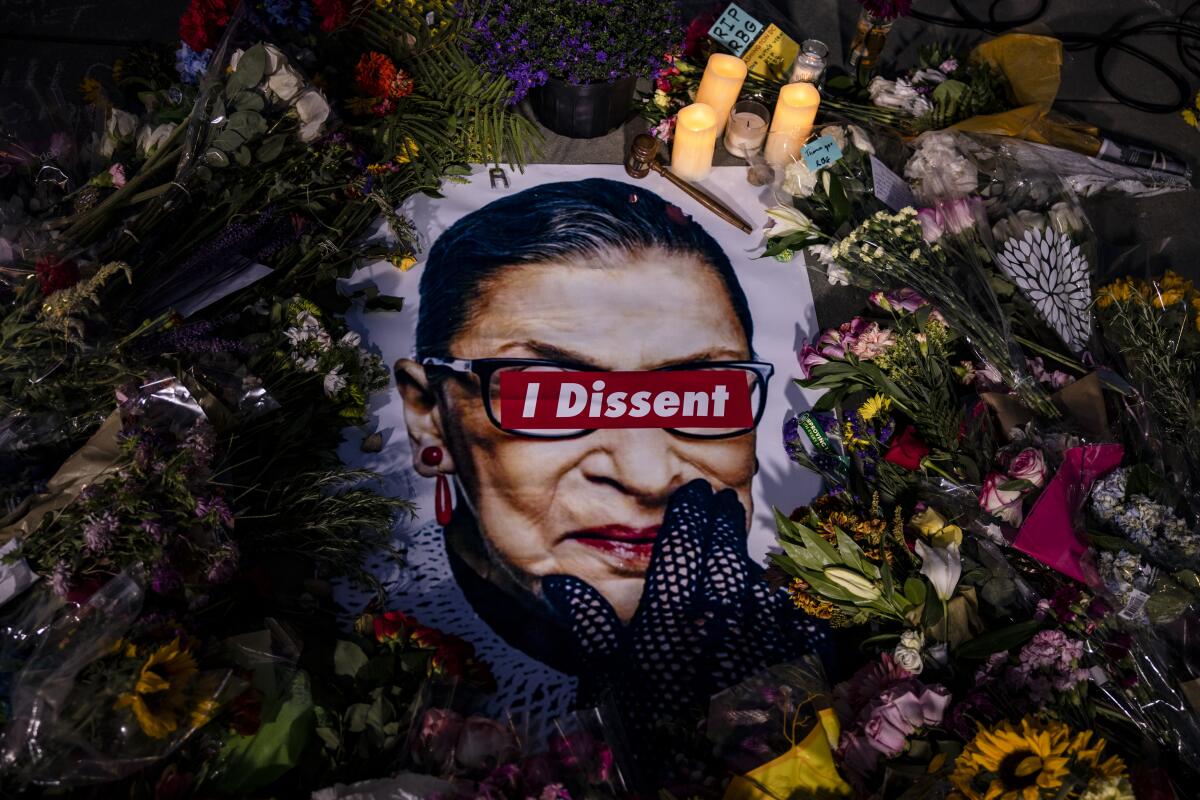
Sept. 20: “Succession,“ “Watchmen” and “Schitt’s Creek” are the major winners at the 72nd Emmy Awards.
Sept. 20: Coronavirus deaths in California top 15,000. The state has more than 785,000 confirmed cases, the most of any U.S. state.
Sept. 22: The death toll of the pandemic in the United States passes 200,000.
Sept. 23: President Trump refuses to commit to a peaceful transfer of power if he loses the November election.
Sept. 23: A Kentucky grand jury brings no charges against Louisville police in the killing of Breonna Taylor during a drug raid gone wrong.
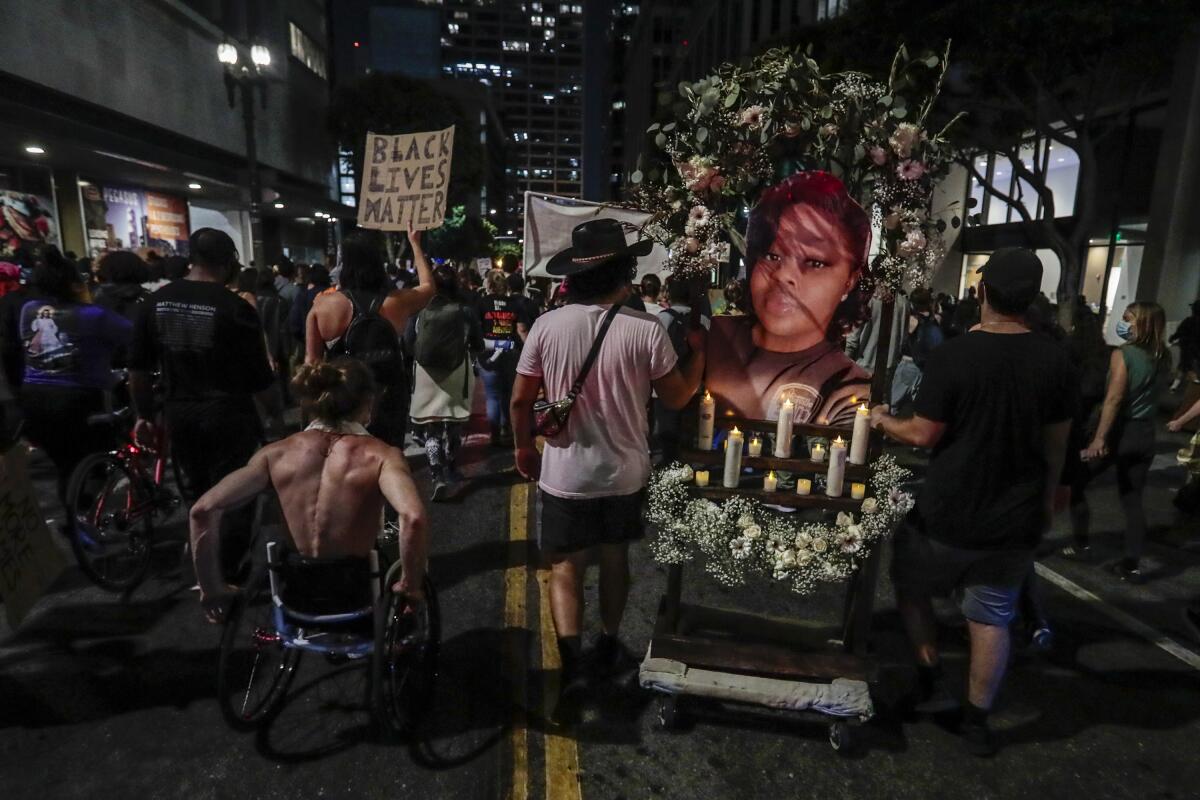
Sept. 24: The Pac-12 Conference announces it will play football in a shortened season starting Nov. 6.
Sept. 26: President Trump chooses Judge Amy Coney Barrett of the 7th U.S. Circuit Court of Appeals to fill the vacancy created by the death of Supreme Court Justice Ruth Bader Ginsburg. Several attendees at the nomination ceremony at the White House Rose Garden will later test positive for the coronavirus.
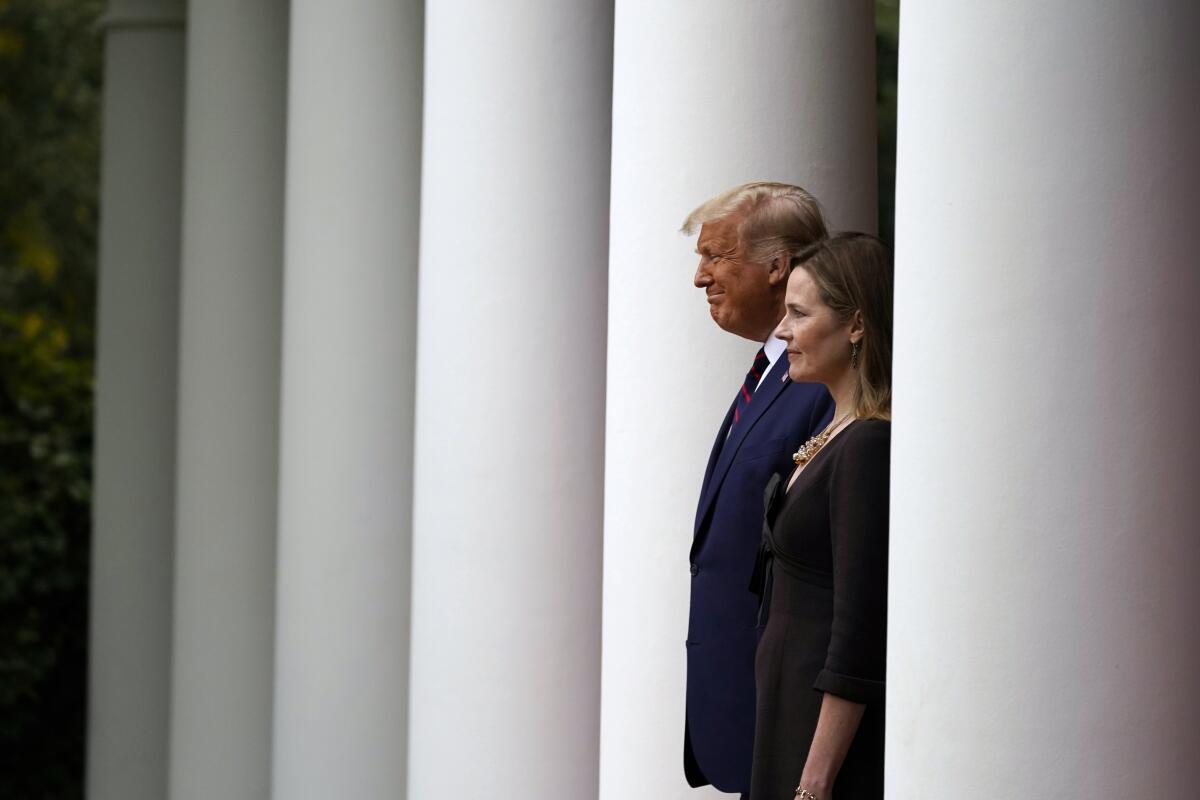
Sept. 27: The New York Times reports on more than two decades’ worth of President Trump’s personal and tax returns. Among the revelations: He paid $750 in federal taxes in 2016 and again in 2017.
Sept. 27: The Glass fire in Northern California ignites just before 4 a.m. and quickly balloons to 40,000 acres in two days. It burns in Napa and Sonoma counties and is the fourth major fire to hit the region since the Tubbs fire in Santa Rosa in 2017.
Sept. 27: Deadly clashes break out in Nagorno-Karabakh between Armenian and Azerbaijani forces.
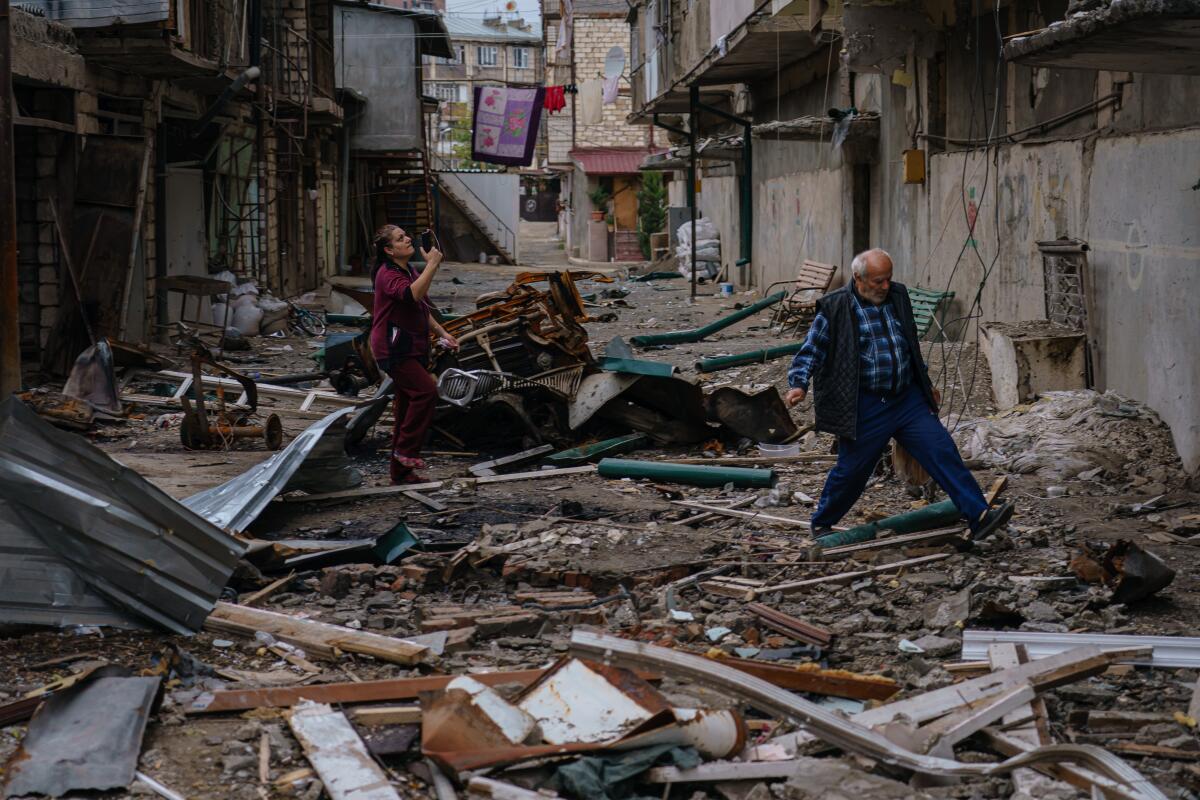
Sept. 28: The Tampa Bay Lightning defeat the Dallas Stars to win their second Stanley Cup championship in a season disrupted by the pandemic.
Sept. 29: Shouting, insults and misinformation, mostly by President Trump, dominate the first presidential debate.
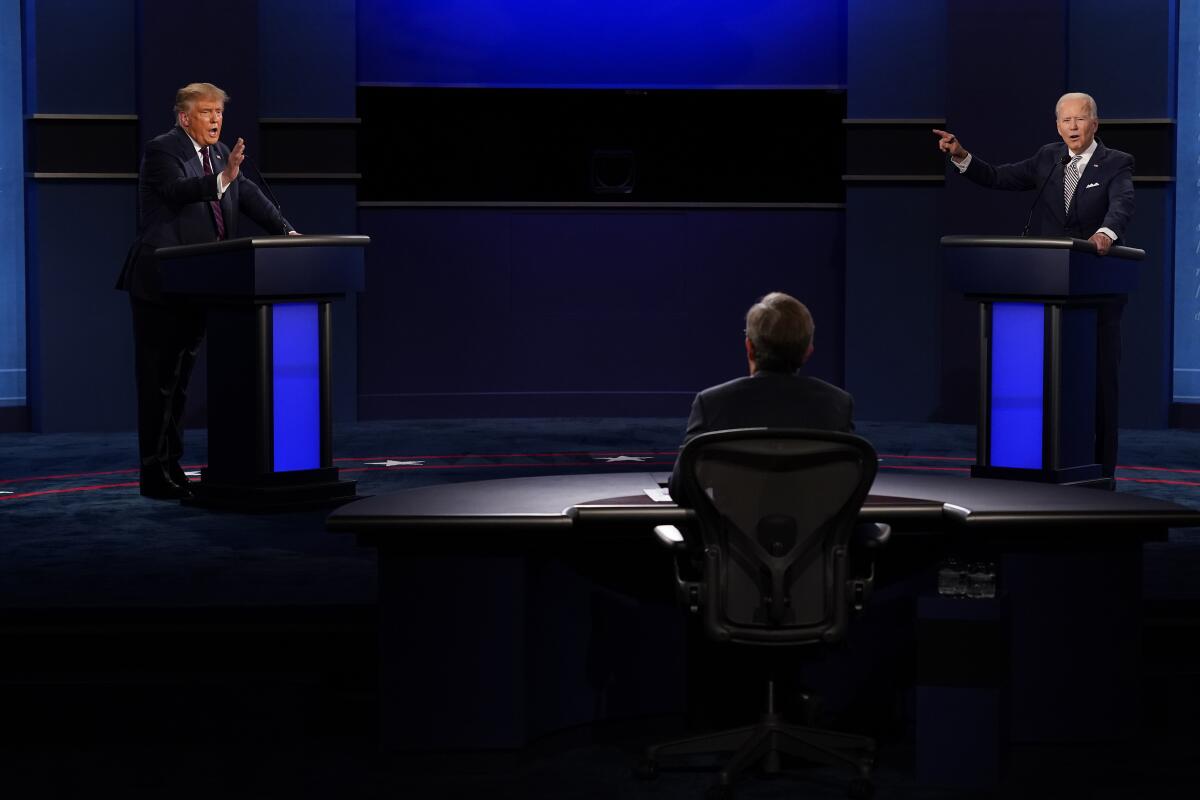
Sept. 30: The NFL announces its first regular season game postponement resulting from the pandemic.
Sept. 30: The UCLA Anderson quarterly forecast suggests California payrolls will drop 7.2% this year to 16 million jobs, a loss of some 1.5 million since the pandemic hit.
Oct.1: A White House coronavirus outbreak is announced; President Trump and First Lady Melania Trump test positive.
Oct. 2: President Trump is rushed to Walter Reed National Military Medical Center for treatment for COVID-19.
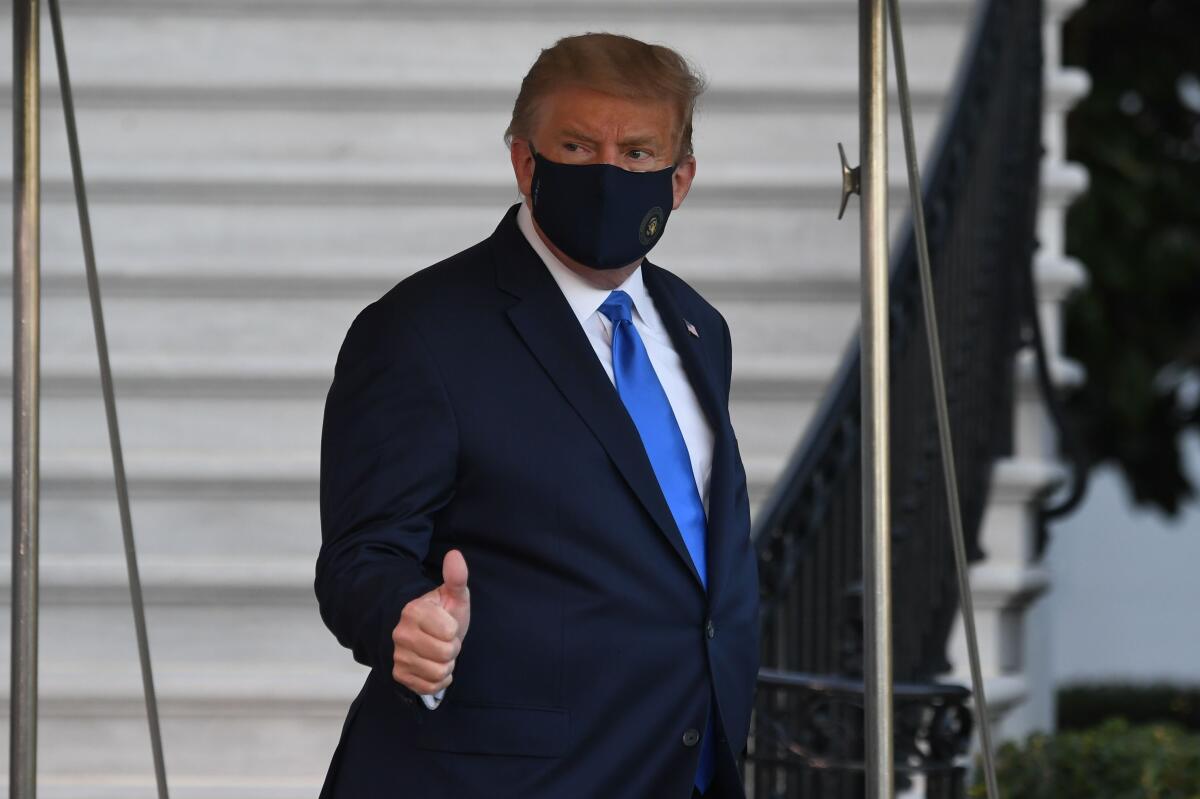
Oct. 2: The California Department of Forestry and Fire Protection reports that state wildfires burned nearly 4 million acres, killed 31 people and destroyed more than 8,200 structures.
Oct. 4: For the first time in California history, a ballot will make its way in the mail this week to every registered California voter.
Oct. 5: President Trump returns to the White House after three days at Walter Reed National Military Medical Center.
Oct. 6: Eddie Van Halen dies at age 65 after a long battle with cancer.
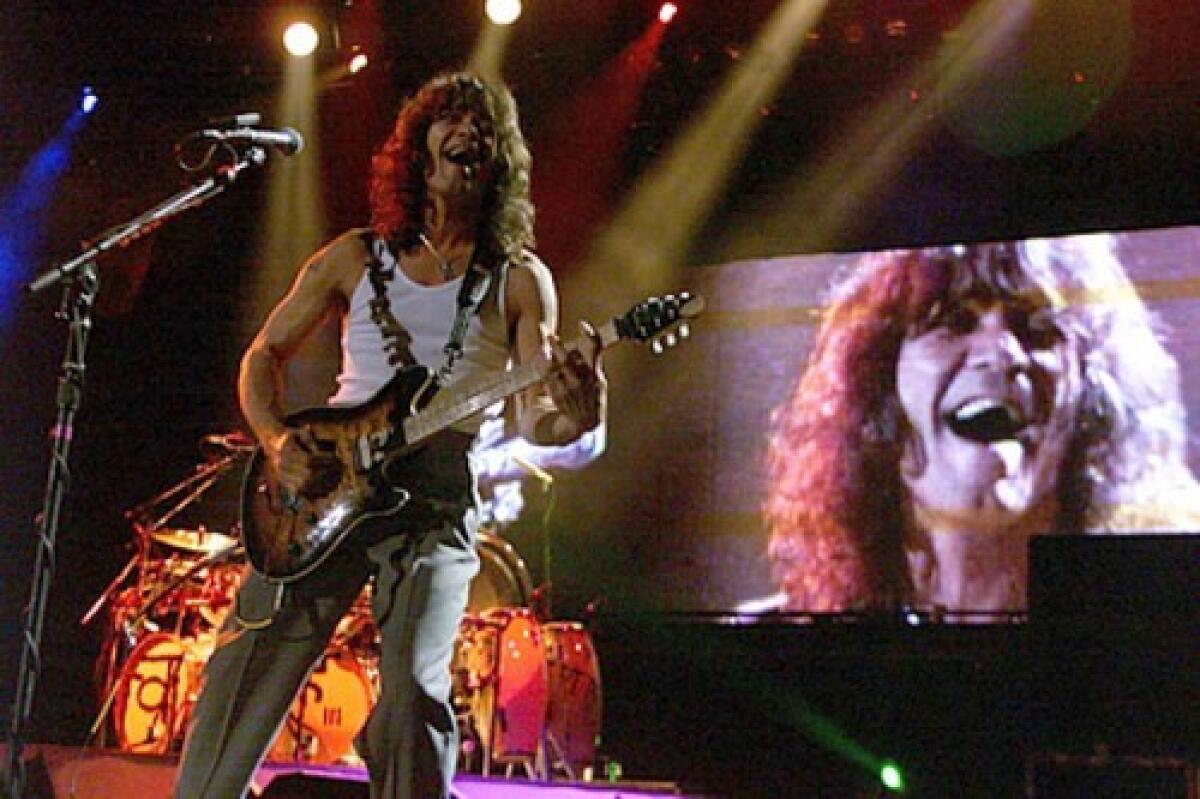
Oct. 8: FBI announces that 13 men have been charged in a plot to kidnap Michigan Gov. Gretchen Whitmer.
Oct. 10: Armenia and Azerbaijan agree on a cease-fire in the ongoing Nagorno-Karabakh conflict.
Oct. 11: The Lakers defeat the Miami Heat to capture a record-tying 17th NBA title.
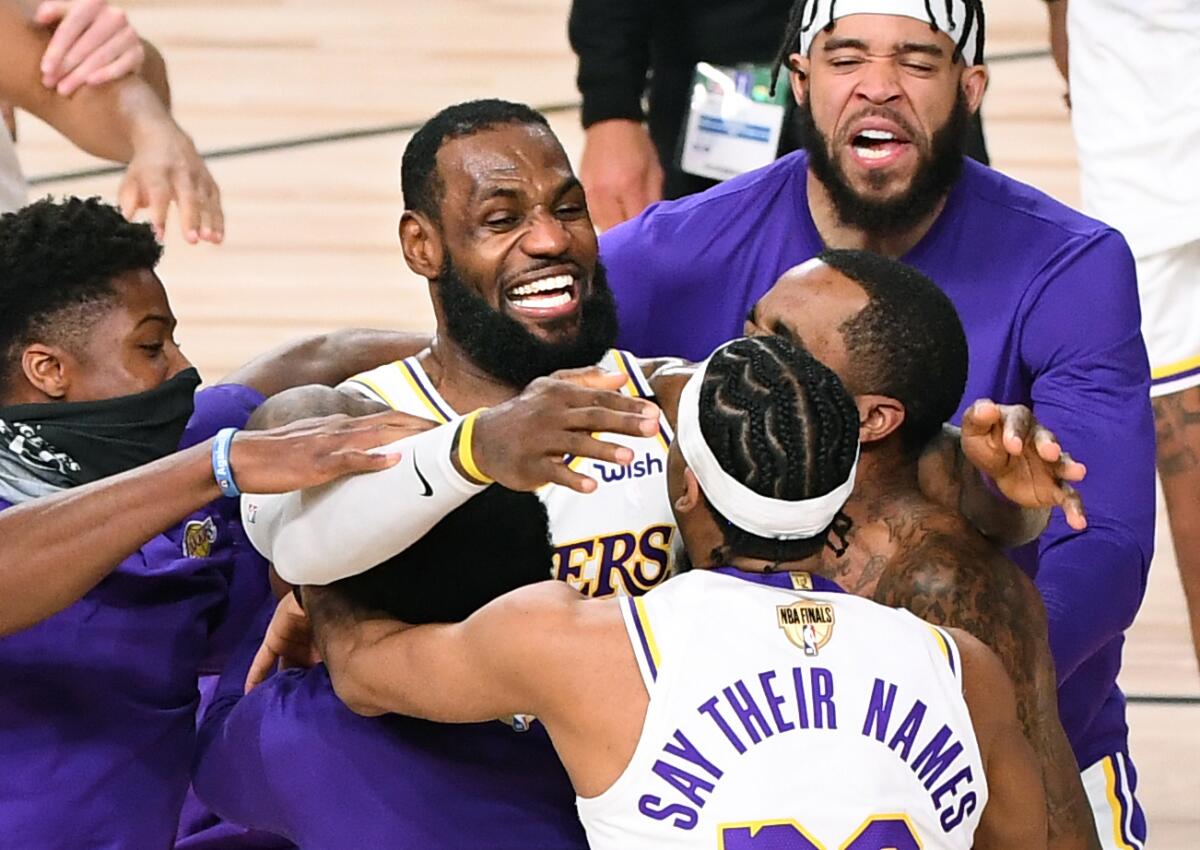
Oct. 16: Coronavirus cases in the United States surpass 8 million.
Oct. 20: Rick Jacobs, a top political advisor to Los Angeles Mayor Eric Garcetti, says he will “take a leave” from his work with Garcetti amid allegations of sexual misconduct.
Oct. 21: Less than seven months after Jeffrey Katzenberg and Meg Whitman launched Quibi to remake the business of short-form video, the nascent streaming service announces it is shutting down.
Oct. 26: The Senate confirms Amy Coney Barrett as a Supreme Court associate justice on a party-line vote, 52 to 48.
Oct. 27: The Dodgers defeat the Tampa Bay Rays to win the team’s first World Series title since 1988.
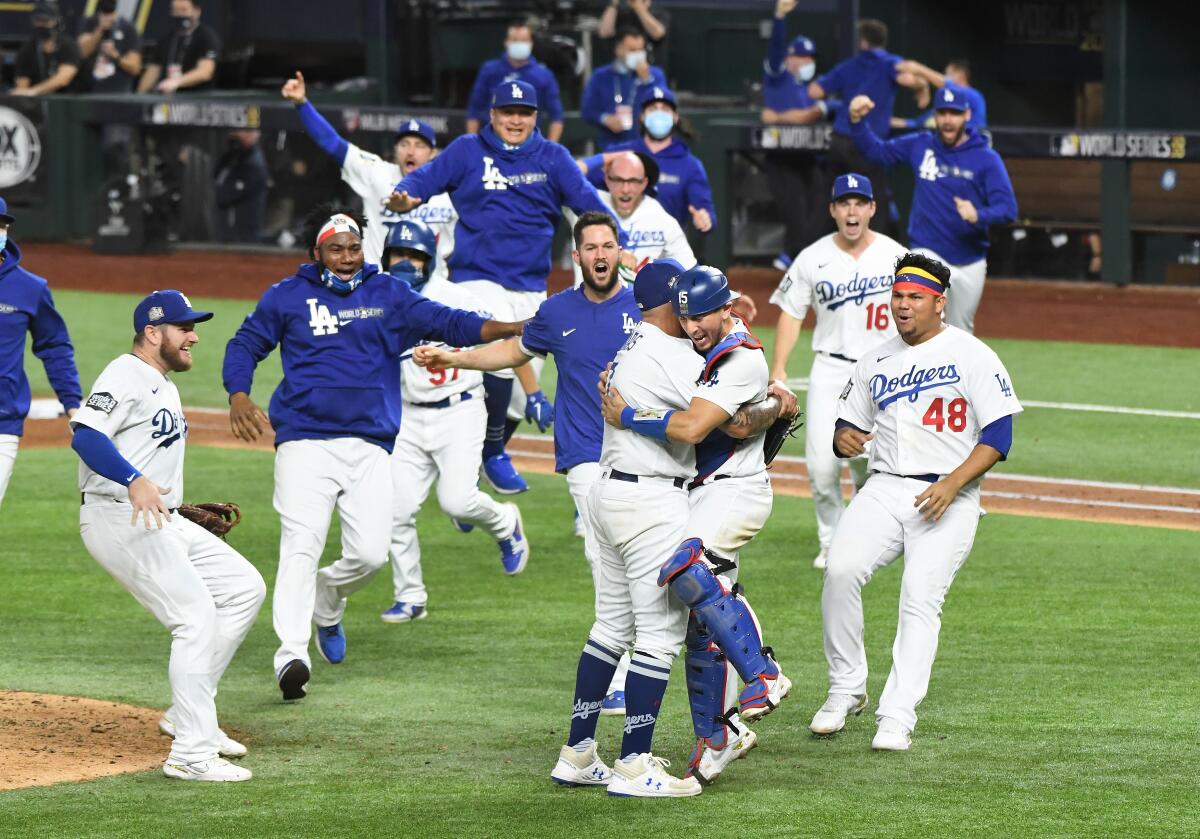
Oct. 30: A Stanford University study links more than 30,000 COVID-19 cases and 700 deaths to President Trump’s campaign rallies.
Nov. 3: California largely breezes through election day. Nationwide, it’s a different story. After midnight, President Trump announces he has won the election and demands that all vote counting stop, alleging voter fraud. But with millions of votes still to be counted, no news organizations declare a presidential winner.
Nov. 4: The U.S. becomes the first country in the world to exceed 100,000 daily cases of COVID-19.
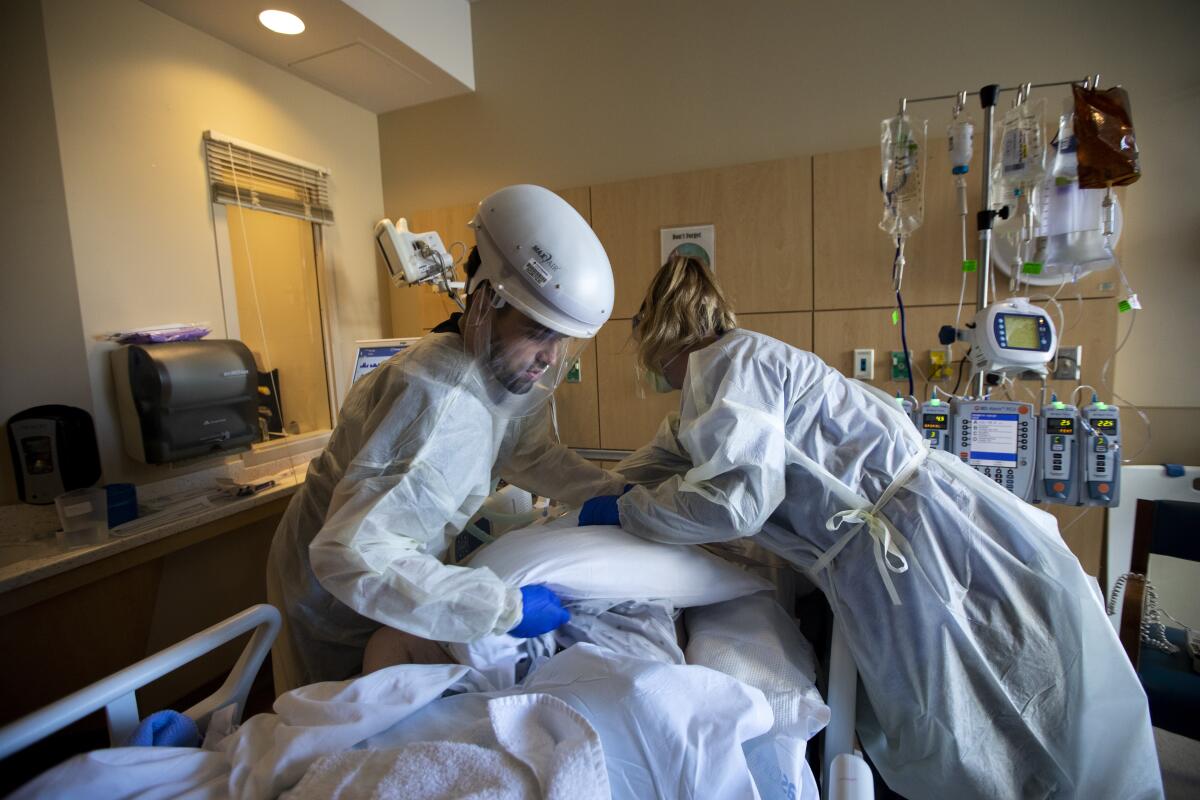
Nov. 4: President Trump continues his attack on the voting system as he joins several lawsuits aiming at stopping vote counts in Pennsylvania, Georgia and Michigan.
Nov. 4: California’s ballot measure campaign season ends with voters granting companies such as Uber and Lyft the right to keep their drivers as independent contractors but rejecting a plan to expand rent control to more homes and communities.
Nov. 6: Los Angeles voters upend the political status quo by backing a slate of progressive candidates and measures in the Nov. 3 election. Among the victors is George Gascón, former San Francisco district attorney, who defeated L.A. County Dist. Atty. Jackie Lacey.
Nov. 7: After days of waiting, major news organizations declare that Joe Biden has secured enough electoral college votes to win the presidency.
Nov. 8: “Jeopardy!” host Alex Trebek, 80, dies following a battle with pancreatic cancer.
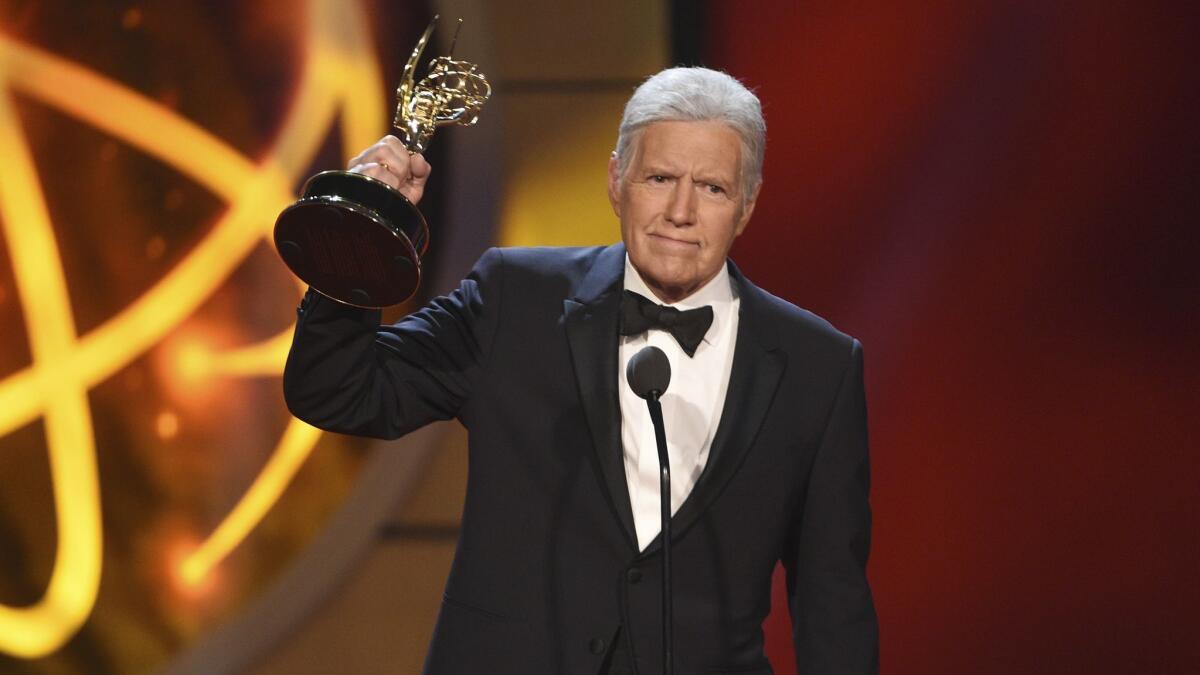
Nov. 9: HUD Secretary Ben Carson tests positive for the coronavirus.
Nov. 9: Pfizer says early data on its coronavirus vaccine candidate suggest the shots may be 90% effective at preventing the disease.
Nov. 9: President Trump uses Twitter to announce that Secretary of Defense Mark Esper has been fired.
Nov. 12: Coronavirus infections in California surpass 1 million; health officials warn that dire action must be taken to stop the spread of the illness.
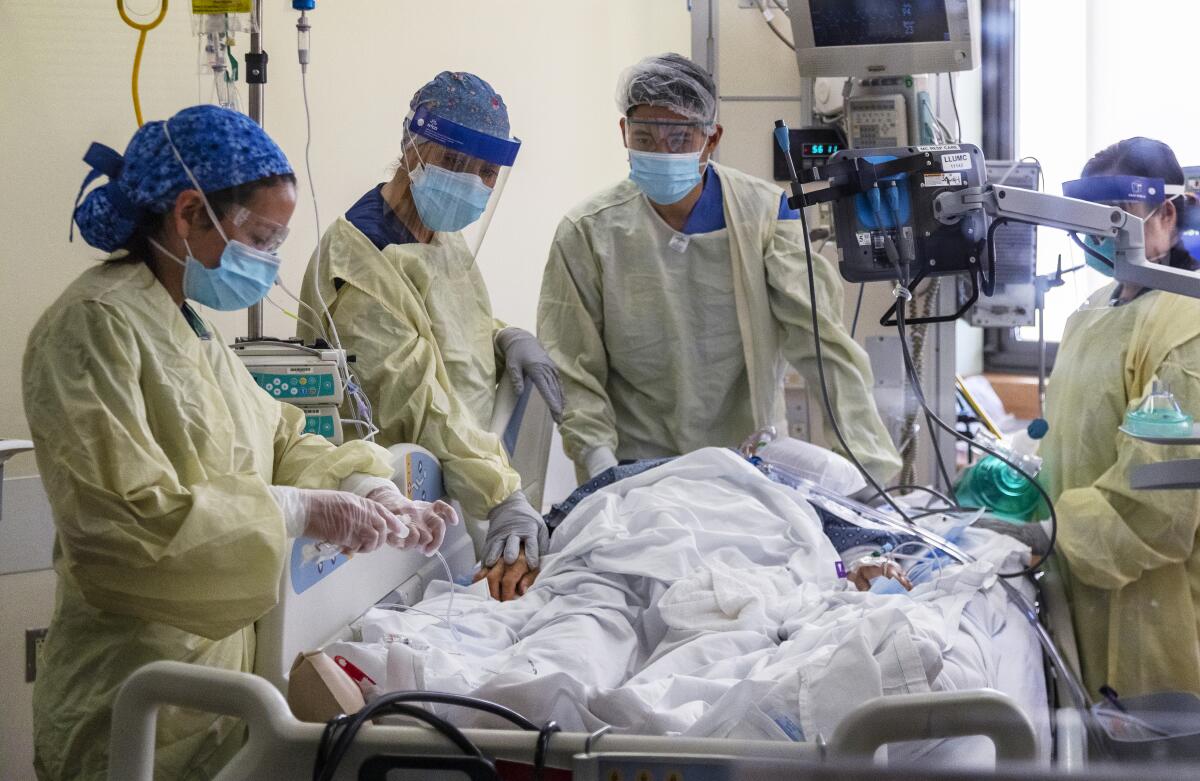
Nov. 13: Gov. Gavin Newsom says he should not have attended a dinner with other households at the French Laundry restaurant in Yountville (on Nov. 6) as coronavirus cases soar statewide.
Nov. 16: Moderna announces that its COVID-19 vaccine appears to be 94.5% effective, according to preliminary data.
Nov. 16: Hurricane Iota makes landfall in Nicaragua as a Category 4 storm, just two weeks after Hurricane Eta hit, devastating the same areas.
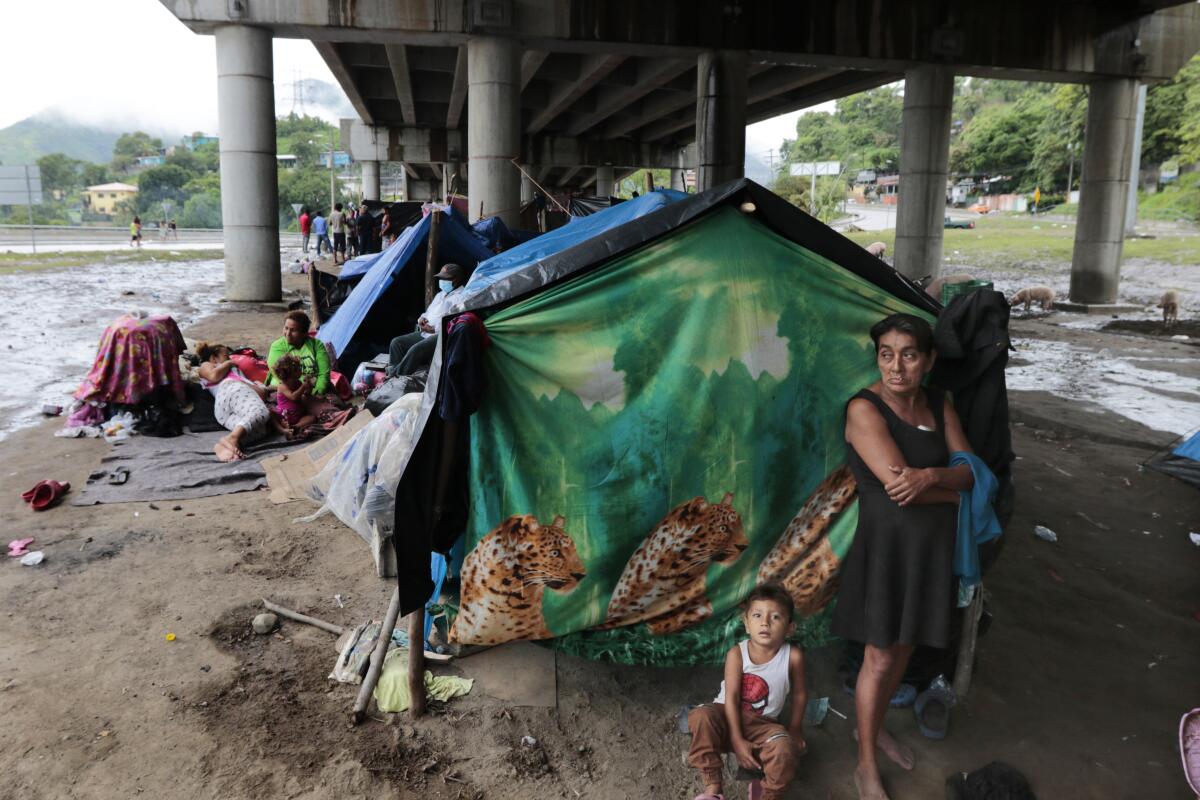
Nov. 18: Pfizer says new results show its COVID-19 vaccine is 95% effective.
Nov. 19: President Trump escalates his attempts to overturn Joe Biden’s election victory, pushing for judges and Republican state lawmakers and local officials in several battleground states to ignore voters’ verdicts and award him the electoral votes he needs for a second term.
The Year in Review
Nov. 19: Gov. Gavin Newsom announces a mandatory overnight stay-at-home order that will be instituted throughout most of California to combat a surge in new coronavirus cases.
Nov. 20: Georgia Secretary of State Brad Raffensperger certifies President-elect Joe Biden’s win and the results of all the other races in the state.
Nov. 23: After a two-week standoff, Emily Murphy, General Services Administration head, reverses course and allows President-elect Biden’s team access to required federal resources to start the formal transition process.
Nov. 25: President Trump pardons Michael Flynn, his first national security advisor.
Nov. 26: President Trump says he will leave the White House once Biden is officially declared the winner of the electoral college.
Nov. 27: Mohsen Fakhrizadeh-Mahabadi, Iran’s top nuclear scientist, is assassinated near Tehran.
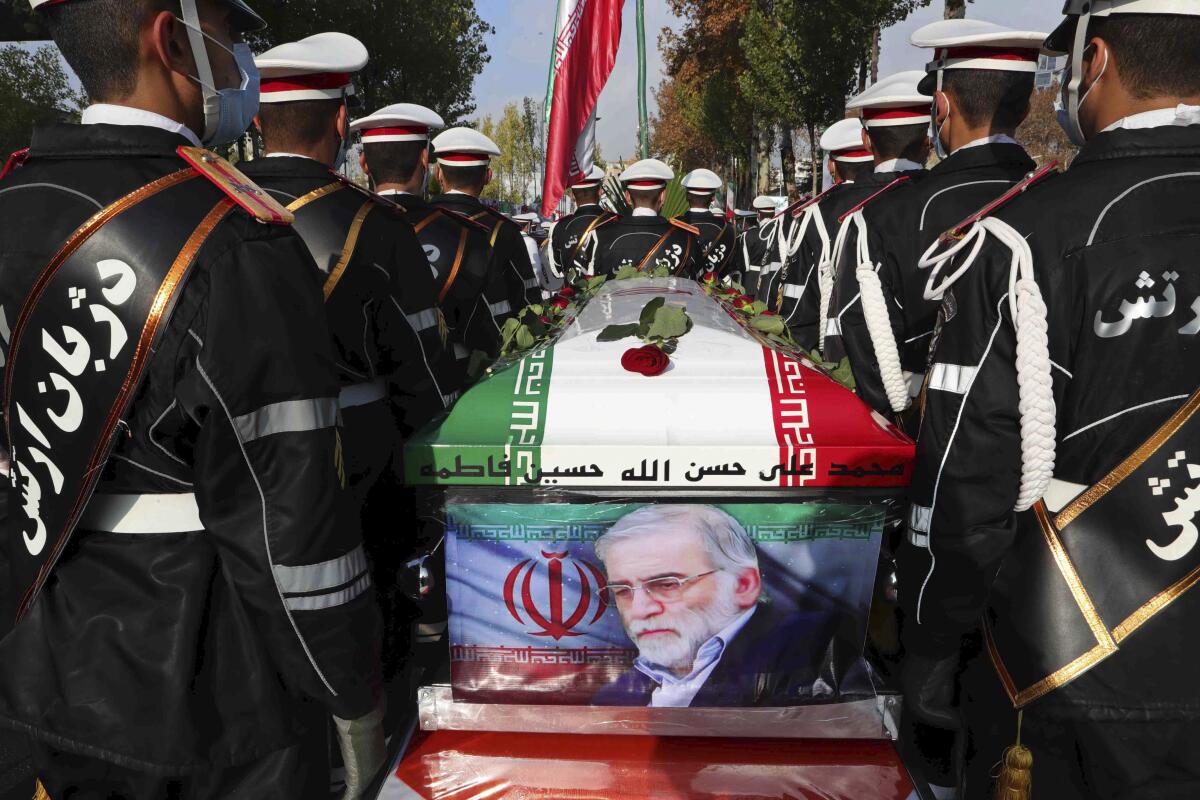
Nov. 29: The Denver Broncos are forced to play a practice-squad receiver at quarterback after all four of the team’s quarterbacks are disqualified due to virus testing and safety protocols.
Nov. 30: Raymond Chan, a former senior aide to Los Angeles Mayor Eric Garcetti, has been charged with conspiracy, bribery, fraud and lying to FBI agents in the ongoing federal probe into corruption at City Hall, according to court records made public.
Nov. 30: The pro bono law firm Public Counsel files a lawsuit against the state of California, saying it has failed during the COVID-19 pandemic to provide a free and equal education to all students, violating the state Constitution and discriminating against Black, Latino and low-income families.
Dec. 1: Atty. Gen. William Barr says the U.S. Justice Department has uncovered no evidence of widespread voter fraud that could change the outcome of the 2020 election.
Dec. 1: The captain of the Conception, the dive boat that caught fire last year off the coast of Santa Barbara, is indicted by a federal grand jury on 34 counts of seaman’s manslaughter.
Dec. 2: Olympic gold medalist Rafer Johnson, who helped bring the Summer Games to Los Angeles, dies at 86.
Dec. 4: Protests against COVID-19 safety rules continue, as some restaurateurs defy the mandate to close outdoor dining (or look for “work-arounds”), and parents rally to keep playgrounds open.
Dec. 7: Universal Music Publishing Group announces it is acquiring Bob Dylan’s entire catalog of songs, which spans 60 years.
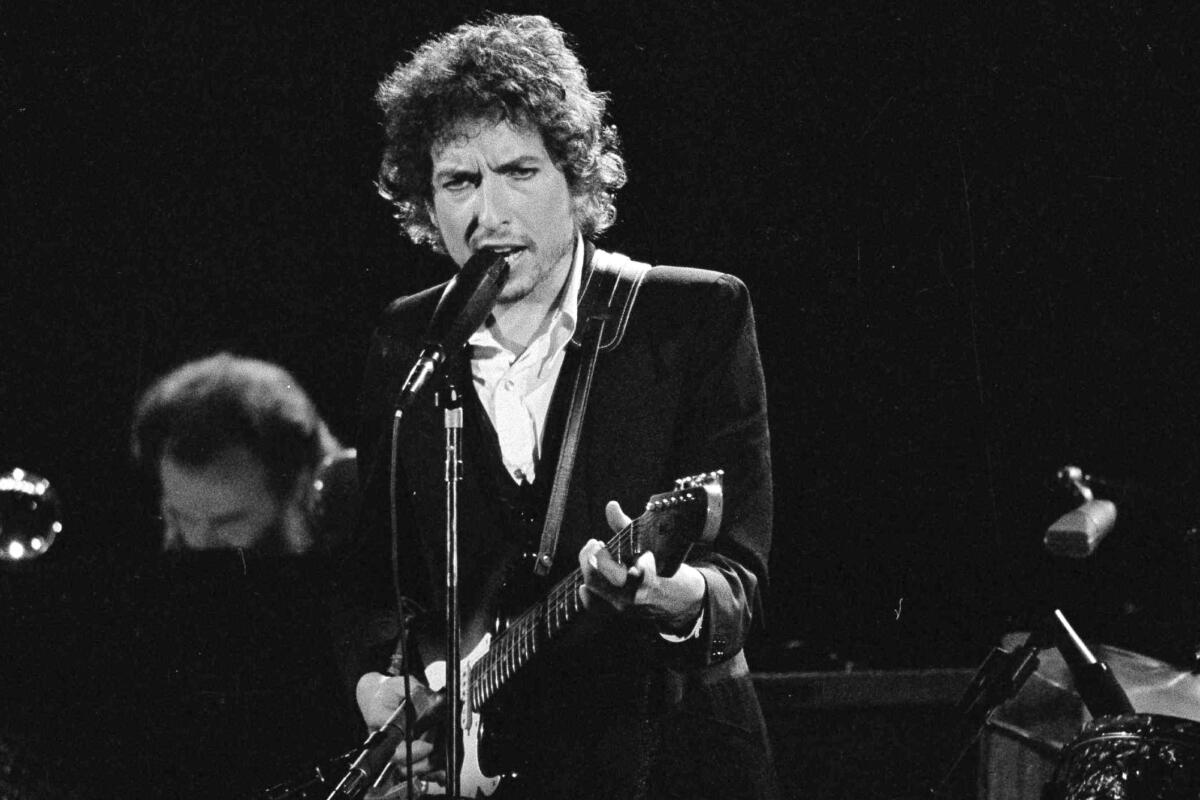
Dec. 8: Britain becomes the first Western country to start inoculating its residents against COVID-19.
Dec. 11: The U.S. Food and Drug Administration authorizes emergency use of the COVID-19 vaccine developed by Pfizer Inc. and BioNTech.
Dec. 11: The Supreme Court rejects a highly unusual lawsuit filed by Texas that urged the justices to overturn the election result by nullifying President-elect Joe Biden’s victory in four key states: Pennsylvania, Michigan, Wisconsin and Georgia.
Dec. 12: John le Carré, the author of many bestselling Cold War thrillers, dies at 89.
Dec. 14: The first COVID-19 vaccinations start in the United States. The first doses are expected to go to front-line healthcare workers and residents of long-term care facilities, followed by other at-risk groups.
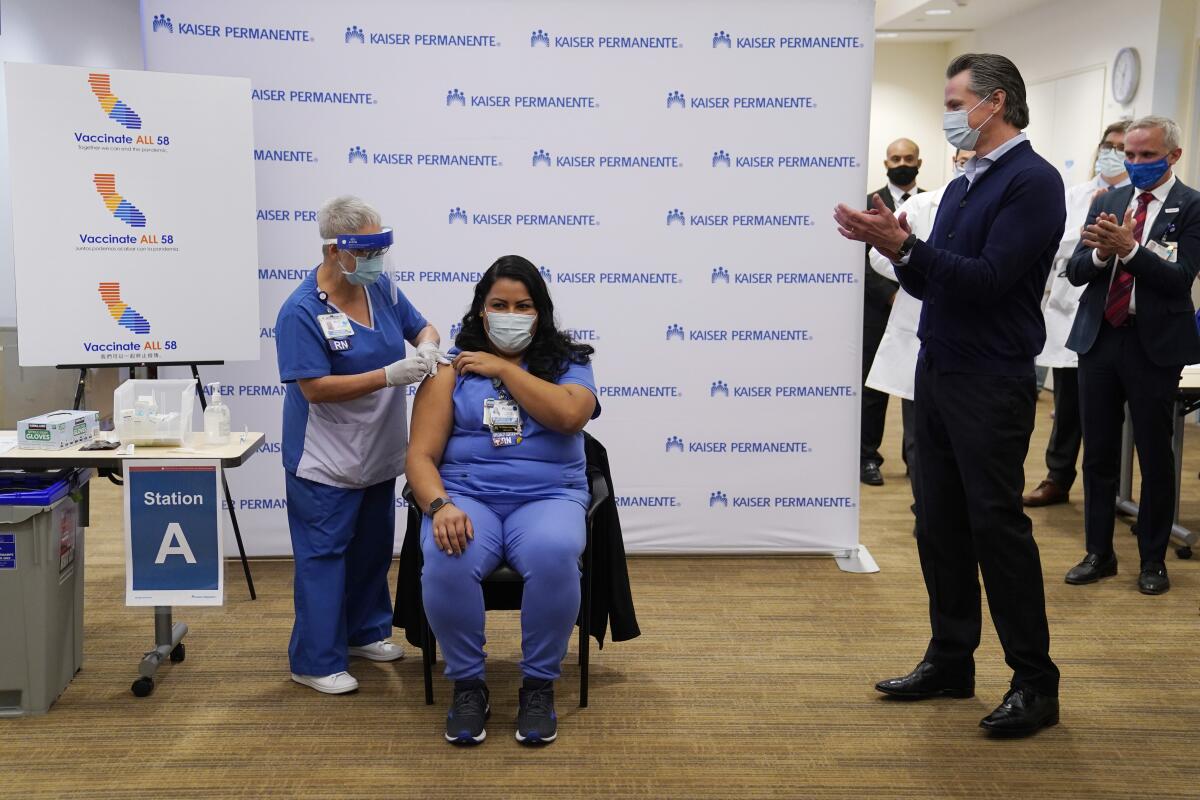
Dec. 14: The electoral college confirms Joe Biden’s victory over President Trump.
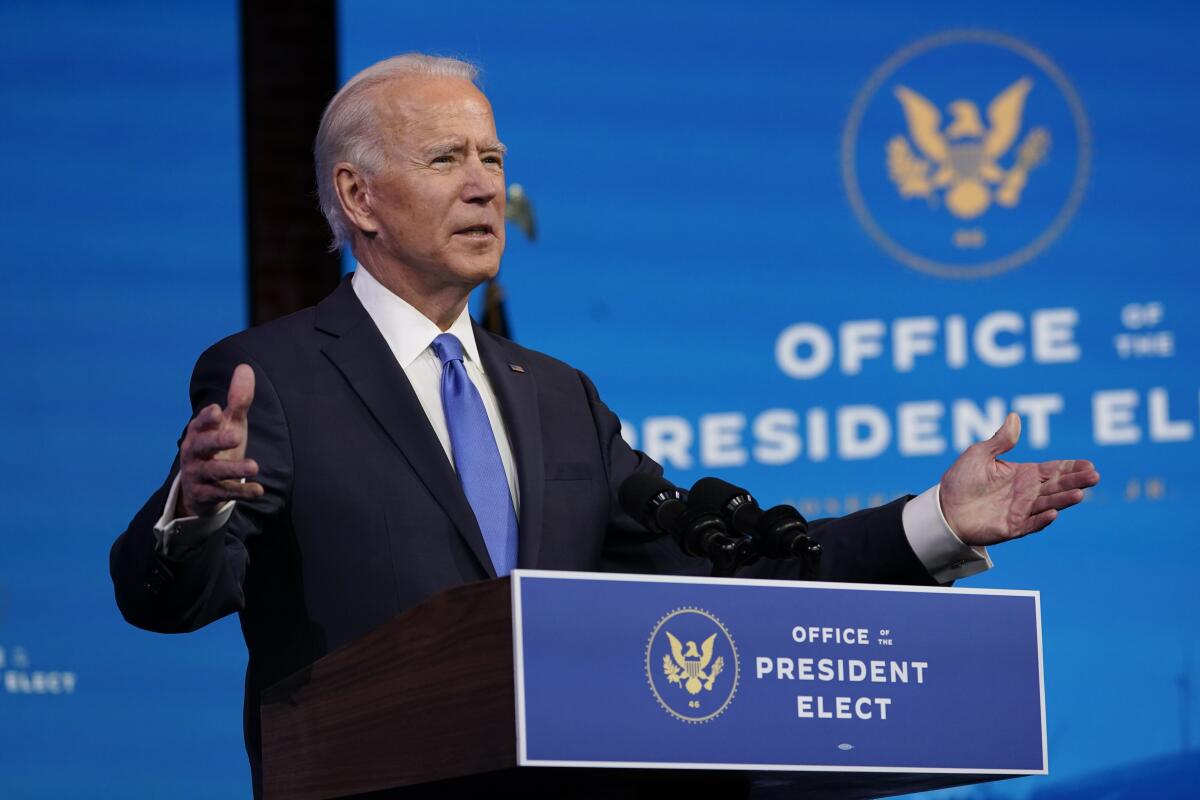
Dec. 17: The availability of intensive care unit beds throughout Southern California hits 0%.
Dec. 18: FDA authorizes the emergency use of a COVID-19 vaccine developed by Moderna and the National Institutes of Health.
Dec. 20: More than 317,000 people in the U.S. have died from COVID-19; the international death toll is 1.69 million.
Sources: Associated Press, Los Angeles Times, the Oregonian, San Diego Union-Tribune, U.S. News & World Report, American Journal of Managed Care, NBC Los Angeles, KPBS, Cal Fire, National Interagency Fire Center
Sign up for Essential California
The most important California stories and recommendations in your inbox every morning.
You may occasionally receive promotional content from the Los Angeles Times.